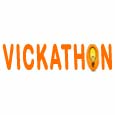


Vickathon - Promoting Innovation through Personalized, Experiential Hackathons
With a track record of over 90 hackathons, we are experts in leading experiential and effective hackathon events for organizations, non-profits, and educational institutions. Whether you're interested in a face-to-face, hybrid, or virtual event, we're here to tailor the most suitable hackathon to your needs.
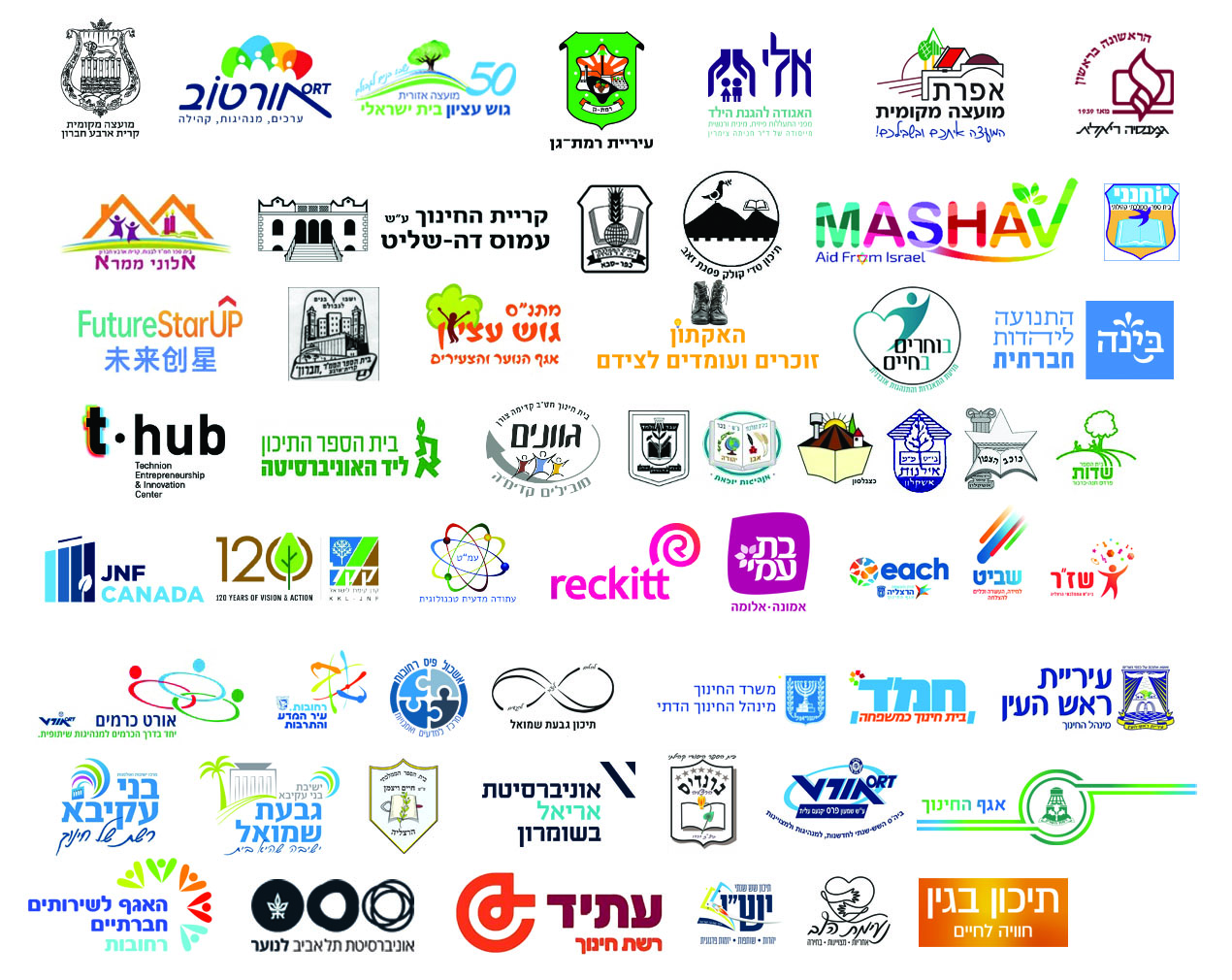
Hackathon - Innovative Event with Practical Results
Hackathons are suitable for any organization seeking to host an innovative, team-building event where employees and stakeholders collaborate to solve challenges through creative teamwork.
These are social events that connect participants and allow them to showcase their strengths and abilities in solving a significant challenge.
Teams develop original solutions to real problems that concern you within a time limit.
Participants experience teamwork, collaborative thinking, goal orientation, brainstorming, planning, and developing a solution to the challenge, culminating in a presentation to the audience and a panel of judges.
The hackathon's competitive atmosphere enhances the sense of determination, motivation, and cohesion among the participating teams.
At the end of the event, the winning teams with the best ideas are selected.
Consequently, your organization receives a variety of applicable solutions from its employees in one engaging event.
Now it's your turn :)
We'd be glad to organize an experiential hackathon for you. Here are some ways you can reach us:
Fill in this form to contact us.
Or contact us by Email at [email protected].
Alternatively, you can schedule an online meeting with us via this link at your convenience.
✓ Fostering innovation in the organization that stems from the ground
✓ Strengthening the sense of belonging and commitment to the organization
✓ Employee empowerment and development of new skills
✓ Improvement in teamwork and internal organizational communication
✓ Leveraging the wisdom of the masses
✓ Multiple solutions to organizational challenges in a short time
✓ An experiential and team-building event with significant impact
Why Choose Vickathon to Lead Your Hackathon?
Every hackathon event is unique and requires personal adaptation, and with us, you can be sure it will succeed.
Proven experience: We have led over 90 hackathons! The events range from in-person to hybrid and virtual, catering to diverse audiences, including universities, municipalities, local councils, nonprofits, and national hackathons.
Personal adaptation: We tailor every aspect of the hackathon to your organization's unique needs.
Professionalism and precision: Thanks to the dedicated web application we developed, you get an accurate, timed hackathon where all involved are synchronized.
Comprehensive expertise: From planning to implementation, we are here with you at every stage to ensure event success.
How is the Vickathon Hackathon Organized?
✓ Consultation meeting: We'll meet to understand the organization's needs and define the hackathon's goals.
✓ Customized planning: We'll build a detailed plan tailored to the organization for all stages of the hackathon.
✓ Preparation and organization: We'll take care of all the small and big details so that the event is meticulous and professional.
✓ Leading the hackathon: We'll guide the event from start to finish while accompanying the participants.
Virtual Hackathons are similar to real-life hackathons, except that they are conducted online, allowing participants to work remotely from their locations.
As in every Hackathon event, participants in an online hackathon are organized into teams and develop their creative ideas for a venture to solve a challenge or problem related to a particular topic.
The Vickathon team offers to organize comprehensive virtual and experiential hackathons for you, from start to finish, utilizing a dedicated system developed specifically for this purpose. Through this system, teams will collaboratively develop their ideas in a shared online document specially tailored to the organization and chosen topic.
A hybrid hackathon is a combination of an in-person hackathon, which takes place in person, and a virtual hackathon, which takes place online.
The hybrid hackathon offers maximum flexibility for both organizers and participants.
The hybrid hackathon can be held in a wide variety of online and offline combinations. Along with the benefits of combining the two, it is worth noting that this combination also presents challenges. We have already led several successful hybrid events using our Vickathon internet app, making the combination work exceptionally well.
Over time, we felt we needed a dedicated system to host hackathons. We searched the market and found no tool or system that meets all our requirements for leading experiential hackathons and contains all the necessary functions we sought. Therefore, we developed such a system and ensured that it would be an internet application, allowing users to connect from anywhere and on any device. The system gives us an advantage in running hackathons in many aspects:
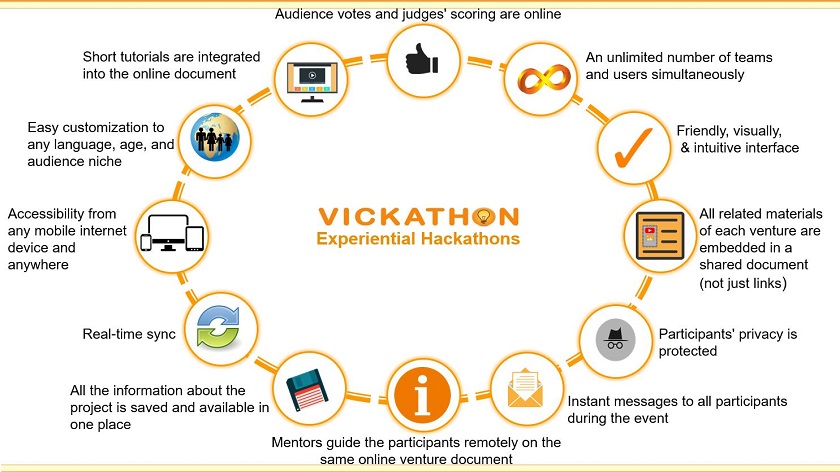
1) Allows running a virtual hackathon for an unlimited number of teams and participants simultaneously.
2) A friendly, visual, and intuitive interface for developing project ideas.
3) The online venture file includes short, ready-made tutorials.
4) Embedding all related venture files within the online venture's form.
5) Access of participating teams to the online venture file from any device, anywhere, anytime.
6) Updating and synchronizing the online shared file in real-time.
7) Adjusting the design, content, and tutorials to any audience niche, age, or language.
8) Addressing questions to mentors and getting their answers on the online shared venture file.
9) Exposing hackathon projects to all participants. It also opens them up to online voting, allowing the audience to choose favorites, announce the winners, and award a virtual medal.
10) Participants' privacy is protected.
11) The hackathon organizers can send instant messages to all participants during the event.
12) One of the problems with hackathons is the loss of information that came up during teamwork at the event. The Vickathon system solves this problem. All the ideas and accompanying documents remain available and accessible to you in the cloud for the next year, allowing the teams to continue working and developing their ventures.
13) An online judging system so that each judge scores teams assigned to them according to predefined criteria without being exposed to the score of the other judges. At the end of the judging phase, you can watch the elaborate score of all the judges.
Who Are We?
Galit Zamler is an educational and technological entrepreneur. She has been organizing hackathons since 2014 for various audiences with an emphasis on the participants' experience. These events were a great success, with clients primarily coming by word of mouth. Galit is also the co-founder of Vickathon, a web application dedicated to running hackathons, entrepreneurial competitions, and related processes.
Galit Zamler leads the hackathons, accompanied by professionals selected according to the unique needs of each hackathon.
To this day, we have led in-person, hybrid, and virtual hackathons together and separately, catering to different audiences from Israel and abroad.
Along with organizing meaningful, experiential, and impactful hackathons, Galit Zamler has developed a format for conducting virtual hackathons exclusively for the Vickathon team.
As of June 2023, the Vickathon format was purchased as a franchise for distribution in the Czech Republic and Slovakia.
EFK Vietnam successfully implemented our virtual format in Vietnam.
Galit Zamler was selected as one of the ambassador women in the Women Tech Network competition with the Vickathon venture for leading experiential hackathons.
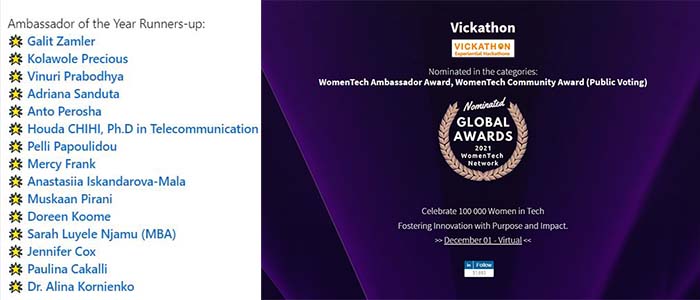
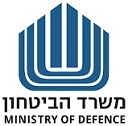
Besides, Vickathon was selected as one of the top 50 ventures in the Startup Wheel 2020 international competition.

What happens at hackathon events?
Watch this tutorial in which Galit Zamler describes what a hackathon is. What happens at hackathon events? And why lead a hackathon in the organization?
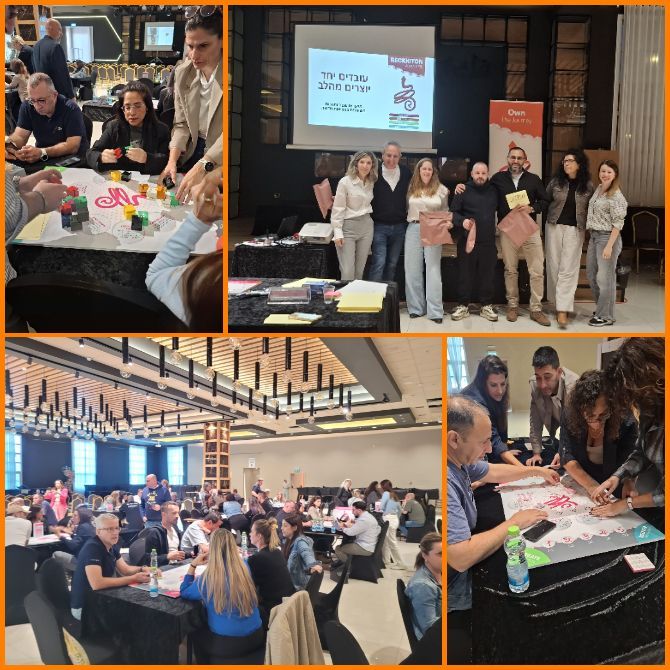
We've had a partnership with Reckitt for several years now.
This is a fascinating example of the power of a hackathon as a tool for creating change when it's precisely tailored to the target audience.
For two years, we successfully led hackathons for the company's Veet brand. These hackathons focused on empowering girls and dealt with body image.
In 2025, the hackathon was already for the company's employees under the concept "Working Together, Creating from the Heart."
We knew how to adapt the language, content, and facilitation style to the company's employees as well.
The result was a deep connection between employees, record-breaking engagement, and creative collaboration that proved hackathons are a winning format when you know how to tailor them to the audience and expected outcomes.
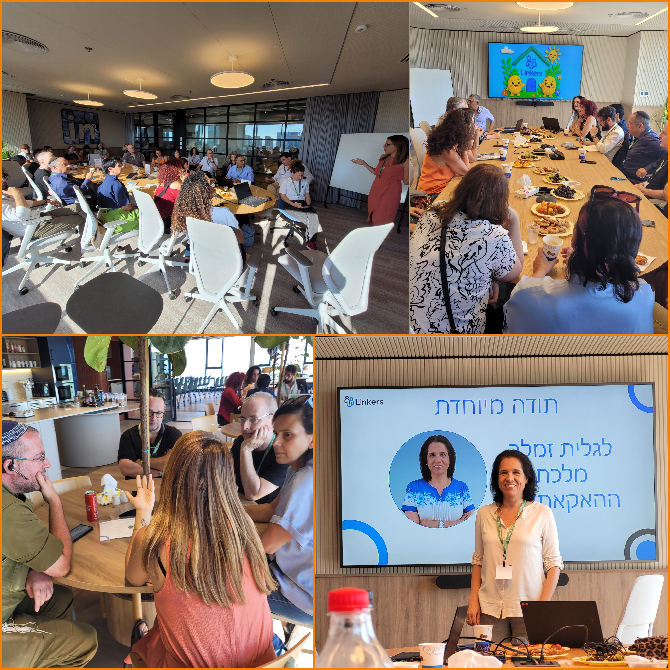
A hackathon for the Linkers Israel community at the LinkedIn offices.
In mid-July 2025, a unique mini-hackathon was held at LinkedIn's Israel offices, bringing together 23 members of the Linkers community.
The participants engaged in a focused and collaborative thinking process, working in teams to shape a shared vision for the community's future.
They developed ideas, analyzed needs, and proposed practical directions for moving forward. All ideas were documented on the Vickathon platform.
Each team explored how their ideas could be implemented and chose one idea to present to the rest of the participants.
What made this hackathon especially meaningful for Galit Zamler was that, in addition to leading the event, she also joined one of the teams as a participant. It was an opportunity for her to experience the group dynamic from the inside and to feel the power of dialogue, connection, and creativity.
This event is an excellent example of how a hackathon can serve as a tool for community building and strategic thinking, not just solving challenges, but creating a shared vision and driving real processes within an organization or group.
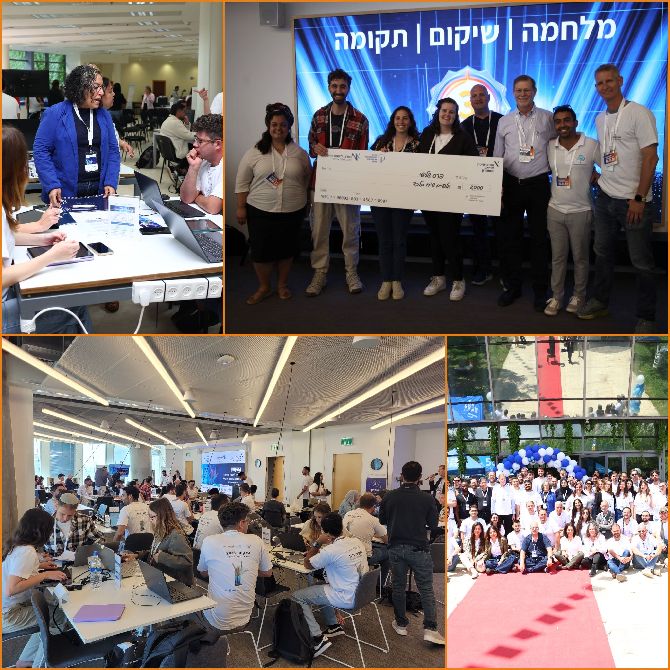
This is the second time that we at Vickathon are proud to lead a hackathon event for Ariel University in Samaria.
The event, which took place on May 5-6, 2025, was themed "War | Recovery | Resilience" this year - a topic that gained special significance in light of the security and social challenges the State of Israel is facing.
Over one hundred students from diverse fields of study gathered to develop solutions for real-world challenges. Some challenges arose directly from the field, including IDF units, emergency services, and rehabilitation organizations, while others emerged from needs that the students themselves identified, whether as reserve soldiers or as citizens living in Israel's complex reality.
The event spanned two intensive days:
The first day took place at Ariel University's library complex, where the students developed their ideas.
On the second day, we were hosted at Amazon's offices in Tel Aviv, where the students completed the development of their ideas and presented the solutions.
Throughout the hackathon, the teams were guided by expert mentors from diverse fields, including engineering, software development, design, medicine, security, and entrepreneurship.
The mentors helped students refine their problem definitions, develop ideas, and present solutions effectively.
Out of the projects developed, 11 teams were selected to advance to the finals and present their solutions to a distinguished panel of judges, including representatives from industry, academia, and the security forces.
After evaluating the ideas, the panel of judges selected the three winning projects:
In first place - Team #25 - "The Chair Game" project - creating a platform that allows intuitive assignment of individuals to appropriate workstations with suitable infrastructure.
In second place is Team #20's "Drive To Recover" project, an electronic system that experientially enables rehabilitation processes while tracking patient progress.
In third place - Team #9 - improvement and streamlining of barrel replacement for Negev or MAG machine guns to ease the burden on combat soldiers in the field.
We at Vickathon - Experiential Hackathons would like to thank our partners for the success of the event:
* Eyal Goldzand, Director of the Entrepreneurship and Innovation Center at Ariel University, for his trust and support
* Hadas Bokea, Program Development Manager at the Entrepreneurship and Innovation Center, for the fruitful collaboration in organizing the event
* Amazon for hosting the second day of the hackathon at their impressive offices
* The dedicated team of mentors who guided the students throughout the process
* The judges who invested their time to hear the teams' pitches and determine the winners
* The speakers: Maor Eilam, Ariel Zang, and Racheli Ben Amram, for fascinating and educational lectures
* And, of course, to all the talented students who participated in the event and proved that entrepreneurship and innovation are always Israel's strengths.
The Ariel Hackathon 2025 is an excellent example that the Israeli entrepreneurial spirit and creativity continue to flourish even in challenging times.
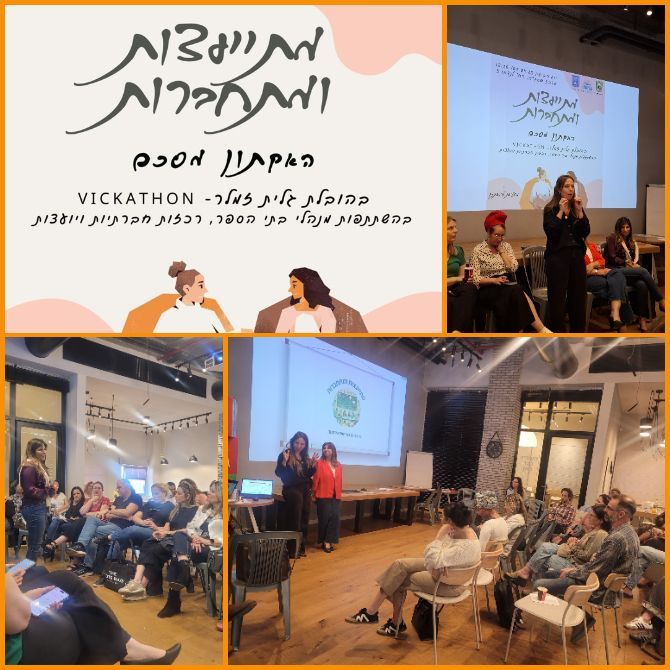
The Ramat Gan Municipal Education Department recently led an innovative initiative: a dedicated hackathon for school counselors and social coordinators in the city's elementary schools.
In recent years, the field of social and values-based education has faced growing challenges. While these challenges are widely recognized, it is the counselors and social coordinators who deal with them on a daily basis in the schools.
This social-focused hackathon complemented a year-long professional development program led by Dr. Odelia Elkobi and followed a structured process:
✓ Identifying real needs from the field
✓ Selecting one initiative based on defined criteria
✓ Developing the chosen initiative into a practical action plan
Students from various schools were invited to participate in a special panel modeled after the format of "You Can't Ask That," where they shared their authentic perspectives and enriched the thought process.
A key moment in the process was the meeting with school principals, where the counselors and coordinators successfully gained support for the initiatives and their implementation.
To foster meaningful peer learning, three leading schools - Mordey HaGetaot, Savion, and Netaim - shared their development journeys and the tangible impact already seen in their schools.
This inspiring initiative was led by Yael Katz, Head of the Social and Values-Based Education Department in the city, who identified the need for a platform that encourages collaborative dialogue, creative thinking, and effective teamwork.

Innovation leaders from various divisions of Israel Railways participated in a hackathon event called "Track the Idea."
The hackathon brought together innovation leaders to enable brainstorming and identify needs and problems.
The heterogeneous team composition enabled productive dialogue and diverse perspectives from experts across various fields.
During an intensive workday, each group went through a comprehensive process of problem identification, solution development, and presentation.
The result was a series of original yet practical ideas tailored to the organization's challenges.
The participants' motivation to take part in the hackathon stemmed from knowing that Israel Railways' innovation department would implement the best ideas.
Interestingly, the team that received the highest evaluation from the panel of judges also won the "Audience Favorite" title, evidence that quality solutions appeal to everyone, both on a professional and a human level.
The "Track the Idea" hackathon demonstrated that providing a platform for creative thinking and interdisciplinary collaboration can lead to significant change within an organization.
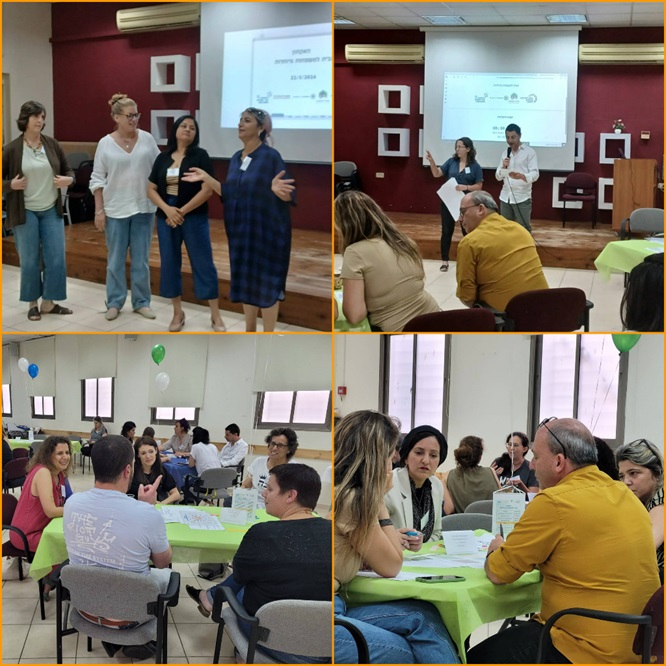
The Social Services Department at the Rehovot Municipality led a hackathon for special families.
The event had several goals:
1) To inform families with special needs about the establishment of a unique home for them.
2) To learn what services the participants would like to receive from the department.
3) To create a meeting and launch a community for families dealing with similar challenges.
4) To enlist the participants to be active and involved partners in the home for special families.
For most participants, this was their first time taking part in a hackathon event.
The participants immediately found common ground and felt that they had arrived at the right place, where they were understood.
Each team focused on one solution, planning it in detail from the idea stage through to implementation.
The teams presented their solutions to all participants and to a distinguished panel of judges.
Finally, the winning team was announced based on the judges' ranking, as well as the audience's choice.
We, the Vickathon team, were happy to hear from Shikma Pazraka, who initiated the hackathon, that "the event was flawless."
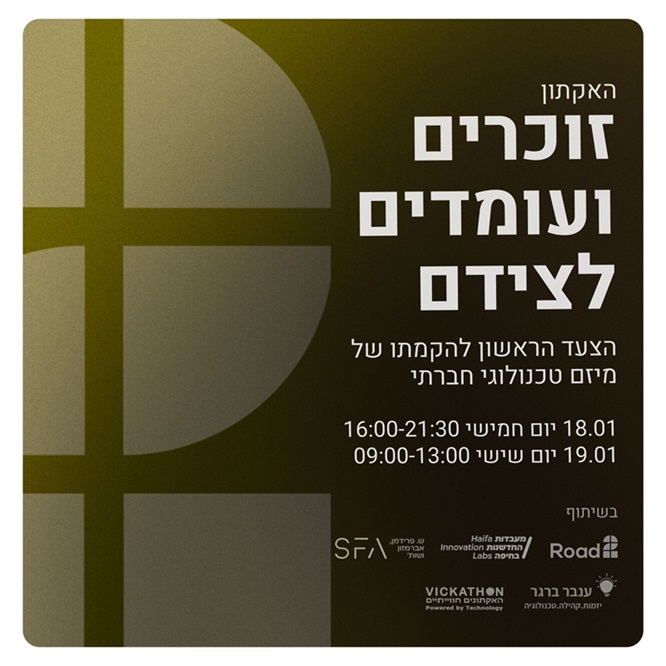
Galit Zamler, who stands behind the Vickathon venture, joined Inbar Berger and the Center for Entrepreneurship and Innovation in Haifa, known as Road 2, in leading a nationally significant event.
This is the second time the 'Remembering and Standing by Their Side' hackathon has occurred. It aims to address the numerous needs arising from wars and bereavement.
The participating teams were asked to find technological solutions for commemorating Israel's fallen soldiers and victims of hostilities, as well as the day-to-day challenges faced by bereaved families, disabled IDF veterans, PTSD sufferers, victims of hostilities, their families, and loved ones.
The projects winning the hackathon, as rated by a panel of esteemed judges, are:
First place - Home for the Fallen, a website that centrally gathers and automates the information-gathering process about fallen soldiers.
Second place - Link Me, which provides exposure and accessibility to social services for disabled IDF veterans and casualties.
Third place - Remembering Together, an ongoing and supportive platform for bereaved families to communicate information and distribute messages.
The winners will receive support and guidance from Road 2's team in bringing their ideas to life.
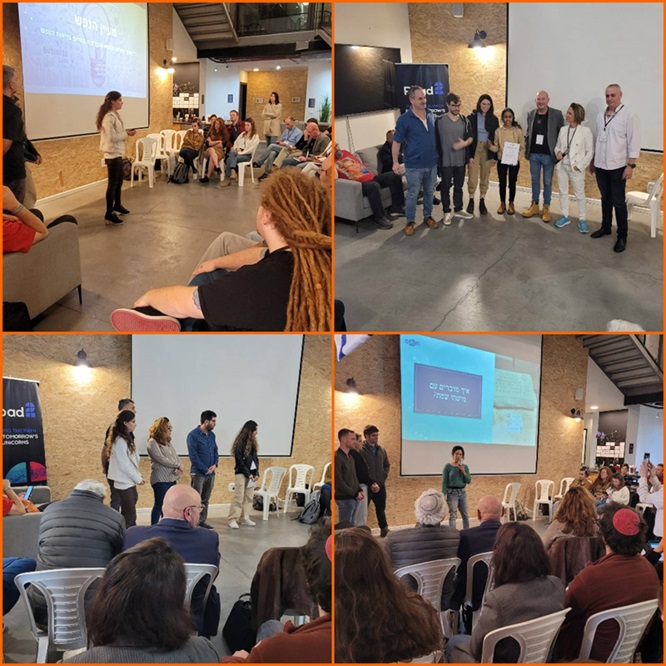
Here are selected quotes from the hackathon participants:
As a member of the team, Yehuda Bruner said, It was an honor to be a part of it." We would like to thank all the mentors, the esteemed judges, Jacob Diminsky, and the organizing team for hosting the event at Road2 Haifa and for all their help and advice. Now we all need to turn our ideas into reality and assist as much as possible."
Meir Givon, judge at the hackathon: "It was a pleasure to participate and assist at the hackathon. Thank you to the organizers and participants. The ideas presented by all groups were excellent. I am sure the concept of remembrance, commemoration, and preserving the lives and image of those departed will gain momentum and result in solutions of great value and meaning for families, friends, and communities."
Zoe Ferber, a member of a team that participated in the hackathon: "Thank you for giving me this opportunity and for all your assistance, which was very helpful to us."
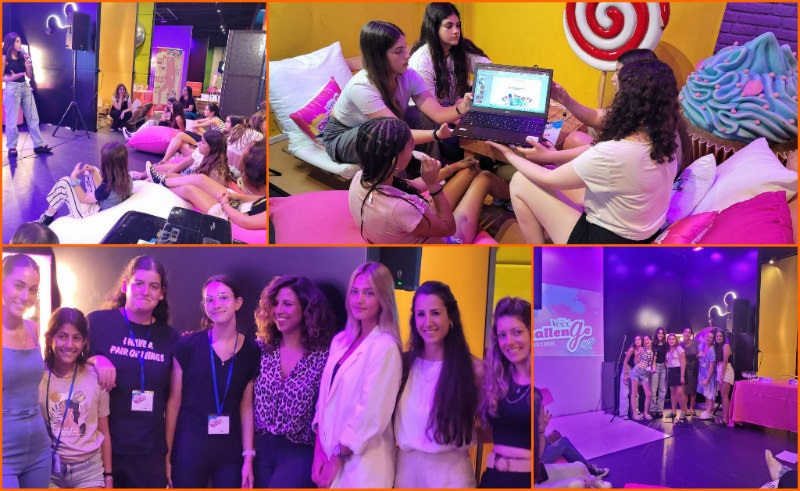
Reckitt Benckiser led another hackathon with us this year, focusing on body image and self-image for young girls from across the country.
This hackathon is called Veet Challenge#2.
It was a particularly empowering event that combined lectures and workshops by well-known influencers from social networks and the media.
There were 50 girls in 10 teams on each of the first three days. Each day, teams presented their ideas to a panel of judges, and two top ideas were selected by the judges, with the audience then choosing one idea.
Nine teams were competing on the final day, all highly motivated to win. Upon entering the compound, they sat down to shape their pitches and presentations to win.
Three winning teams received pampering prizes after an extended judge panel heard all the ideas.
Veet's brand team will resource and implement the winning idea that took first place.
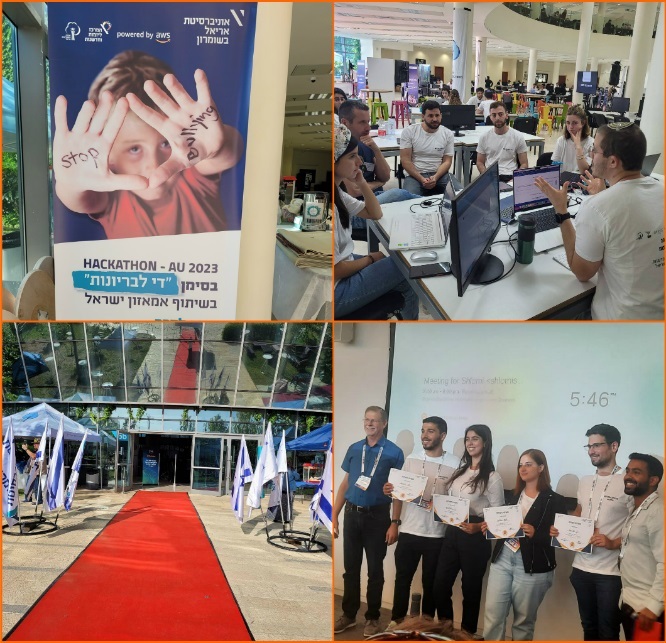
Ariel University, in collaboration with Amazon, held the "Enough with Bullying" hackathon. Twenty student teams participated in the hackathon.
The challenge was finding technological solutions to bullying issues at all stages.
Participants in the hackathon attended two online preparation sessions where they heard lectures on bullying, entrepreneurship, and storytelling.
The hackathon lasted two days. Ariel University hosted the first day, and Amazon hosted the second day. Mentors from various fields accompanied the students, including entrepreneurship, technology, sociology, and education.
The ideas of the teams were ranked by a diverse panel of judges on the first day, and the best ones advanced to the second round.
The motivation of all the participants stemmed from a desire to help alleviate, at least to some extent, the painful problem of bullying.
The hackathon was deemed a success, and three teams were selected as winners:
In first place: HoneyWeb - traps for catching pedophiles online.
In second place: CheerApp - a voice for the quiet children
In third place: Bulls.ai - A tool for finding children who bully and presenting that information to organization managers through a BI system.
This clip recaps the hackathon:
Shlomi Shemesh, from Amazon, summarized the event as follows: "Dear friends (legendary university and association staff, mentors, judges), I would like to thank you from the bottom of my heart for your time, care, and giving - this is what made the difference and turned a good hackathon into a great one! I wish for us many more initiatives in partnership with such a significant social mission!"
Dr. Anat Levy Raz, who was a mentor and lecturer at the hackathon, wrote: "Thank you for the privilege of being part of the empowering and creative space that you created with great professionalism and investment, and working together with you to provide value to our wonderful youth on a significant issue."
One of the participating students wrote: Hi, I wanted to thank all the organizers and those who participated. It was an inspiring experience. I enjoyed it and learned new tools. Thank you to the organizers and participants for their time and effort. You were awesome :). It would be great to have more."
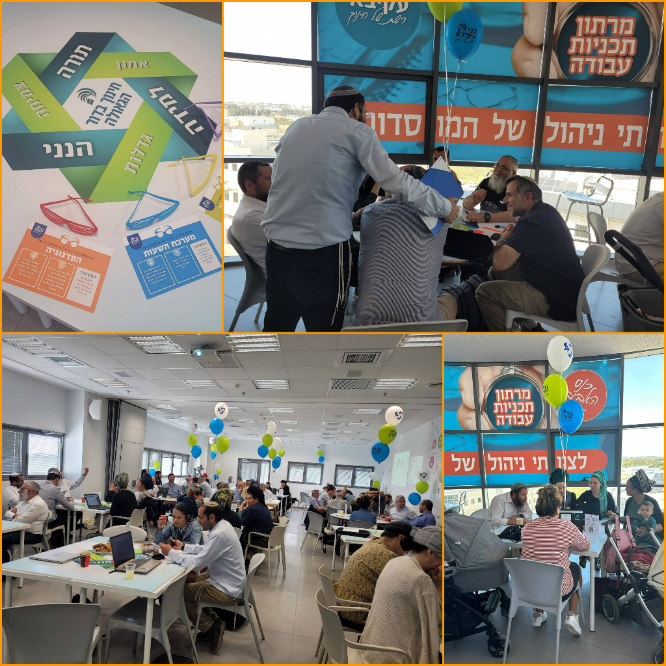
The Bnei Akiva Yeshivot and Ulpanot Center decided to hold its spring conference in a hackathon-style format.
36 management educational institution teams from all over the country (including Eilat) participated.
As in every hackathon, the teams at this conference also faced a particular challenge during the day: preparing a work plan for the next academic year.
Beyond the challenge, we also ensured the event included the small details that characterize our hackathons.
Professional mentors from the management center accompanied the groups at various stages of the conference.
The steps guided the teams through the process of solving the challenge in various and diverse ways, allowing participants to experience purposeful and progressive work, as well as interest and enjoyment.
The Vickathon app helped deliver instructions to all teams at various stages and ensured they met deadlines. In addition, the teams utilized the NIR app, a dedicated system developed by the Bnei Akiva Yeshivot and Ulpanot Center.
It was clear that all the teams actively participated in the conference to crack the challenge. Thus, the experiential event was also productive, and the participants left with the feeling that, on the one hand, it was fun, and on the other hand, they achieved their goals.
We occasionally stopped the teams' work to enjoy Ted-style enrichment lectures, refreshments, good food, and prayers.
As part of an annual seminar in Yeruhem, the Bat Ami association, headed by CEO Eran Valk, organized a hackathon for about 400 Bnot Sherut.
We held a Zoom preliminary meeting before the event to provide participants with the necessary tools and knowledge to develop an idea for a project.
Approximately 40 teams participated in the Social Embrace and Alleviating Loneliness challenge. With the help of mentors, the teams defined their needs, came up with ideas to address them, and developed the best idea, which they presented to a distinguished panel of judges.
From all the teams, three winning ideas were selected. They will receive guidance and support throughout the implementation process.
In the end, Shahar Haim, director of Bat Ami, wrote: "Thanks a lot for the hackathon. The event was a great success and a significant milestone for the seminar. Thanks for your leadership and support throughout the process."
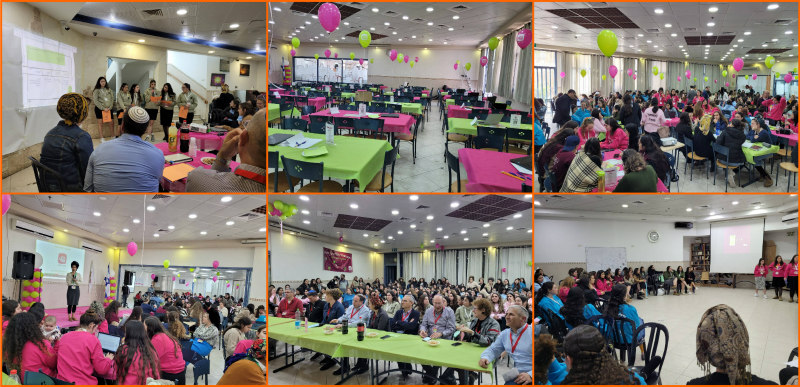
or the first time, Ramat Gan Municipality's Department for Social Services held a hackathon called "Initiate for the Mental."
As this was the first hackathon event for the division's employees, most of whom had never heard of this term before, we held a preliminary exposure event. Our goal was to explain to the employees what a hackathon is, how it works, and why it is worthwhile to participate, despite its duration of an entire day.
Noa Rayter, the department's strategic development and innovation manager, proposed the idea for the hackathon. Noa and Ortal Oshri, with the help of a small team from the department and accompanied by Galit Zamler, turned the dream of running a hackathon event into reality.
A fantastic video clip opened the exposure event, creating a wow effect among employees and then on social media:
The event itself took place from morning to evening in December 2022. A total of thirteen mixed teams participated in the hackathon, comprising representatives from the Social Services Division, families and individuals with mental illnesses, mental health professionals, and experienced mentors.
During the day, the teams identified needs related to the hackathon challenge, specified them, proposed ideas to deal with them, filtered the ideas based on criteria presented to them to select the best ideas, developed them according to a prepared outline, and prepared presentations and pitches to present to a distinguished panel of judges.
It was inspiring to hear representatives of the ills and their families explain their challenges when they pitched their ideas.
Three winning teams were selected based on the judges' scores. The team that wins first place will receive a budget and support to bring their idea to life.
Thanks to the cooperation between all participants, including Roi Zamir, who recruited an excellent team of mentors, the hackathon was a success.
Ariel Peleg, who participated as a mentor in the hackathon, complimented the Vickathon team. Ariel said at the end of the hackathon: "I've participated in 15 hackathons, but I've never participated in such a technological hackathon."
Here are some photos from the event
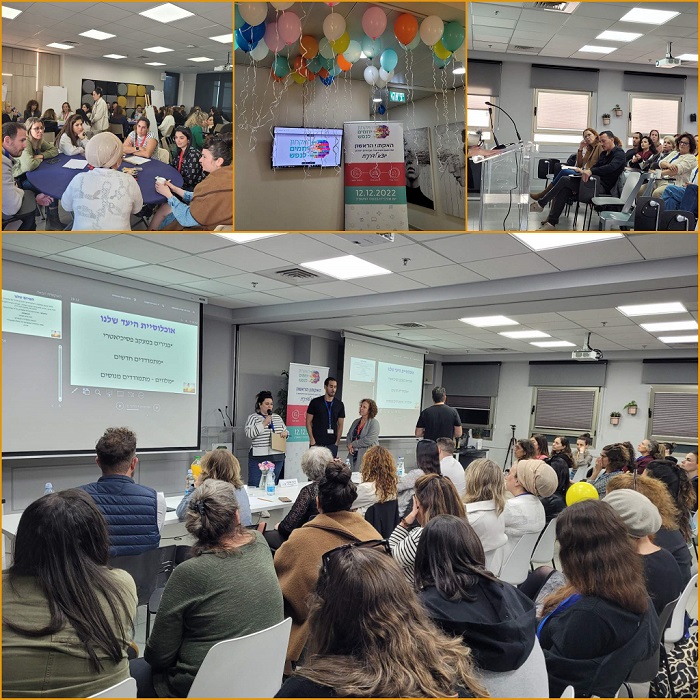
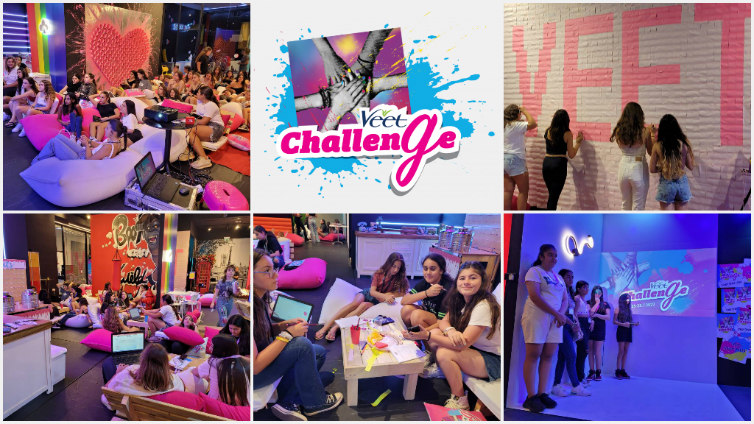
This year, Veet's managers in Israel decided to hold a hackathon to strengthen the brand and promote social values.
In July 2022, we led a four-day hackathon called You Decide. The target audience was girls between the ages of 12 and 16.
As we organized the hackathon, we ensured it would be an enjoyable and experiential event, as well as an opportunity for participants to address issues of self-image, self-esteem, and acceptance of others.
On each of the first three days, ten teams generated ideas for ventures and initiatives, developed them according to an outline, and then pitched them. Those with the best ideas advanced to the finals.
Well-known social network influencers participated in the hackathon. They gave empowering lectures and workshops.
The collaboration with influencers resulted in substantial exposure on social networks, leading to a high number of registrations for the hackathon.
For the final day, the teams that won on each of the first three days were invited. On this day, the teams improved their pitch. They presented their ideas to a panel of judges, which included Veet's representative, representatives of the student council and youth movements, and Mrs. Michal Tzafir.
Three teams won gadget prizes, and Veet will also implement the project that won first place.
These were four fun days during which the Veet brand gained significant exposure among its target audience and was perceived as a brand with values.
Ynet's online magazine summarized the event as follows (in Hebrew):

The CEO and President of the ELI Association, Mr. Eran Zimrin, has decided to lead an innovation process among the ELI community.
The ELI Association handles children who have been abused physically, sexually, or mentally.
Galit Zamler and Inbar Berger led a joint process for all members of the ELI community to facilitate change and improvement processes through the wisdom of the masses, providing an equal opportunity for all community members to share insights, suggestions, and ideas for improvement and renewal.
As part of the innovation process, we held several online meetings. In the end, a three-day conference was held in an atmosphere of vacation in Eilat. All participants attended frontal sessions during the conference. The sessions included both fun and enriching activities, and teams worked to develop selected ideas from all those raised, present them to the audience in an entrepreneur's pitch style, and vote for the best ideas.
The event concluded with a sense of connectivity among the participants and a motivation to implement the proposed changes by the teams, aimed at enhancing the association and its activities.
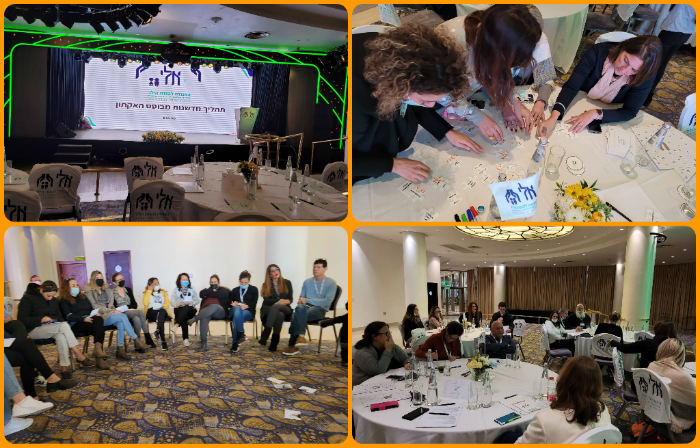
At the end of the innovative hackathon process, we asked participants to fill out anonymous feedback and answer the question, "How was your experience at the hackathon-style innovation process?" The following are some responses we got:
"I was excellent, interesting, fulfilling, and instructive. Thank you so much!"
"It was excellent and instructive. This is my first time participating in an activity like this. And the dessert (Eilat) - perfect!"
"It was great. Thank you very much. Working and bonding together works wonders. Thank you very much for the organization and patience."
First of all, it was a very cohesive process. This may be a side goal, but from my perspective, it is no less important. In addition, it was done professionally, with impressive consideration and patience towards all undecided/missing participants. It put our organization into a challenging and focused mapping mode, just as we had hoped and expected. Thank you, and good luck!"
"The process was very successful. Beyond the practical results, it also increased motivation among the participants. The event management was very professional, and therefore successful, and the facilitator's contribution was significant."
"It was fascinating, solidifying, fun, and developing. We enjoyed every moment and felt a huge boost to our motivation and professionalism. Thank you very much!"
"Thank you, organizers. The process was very professional, organized, engaging, creative, and meaningful."
"It was essential. Hopefully, there will be a practical continuation of the hackathon results. Thank you."
About two years after the hackathon, we received an exciting WhatsApp message from Eran Zimrin, the CEO of the ELI Association.
He informed us that they had recently launched the last project in the hackathon: The Purple Button.
It's an emergency button that makes the association's services accessible to anyone who needs help.
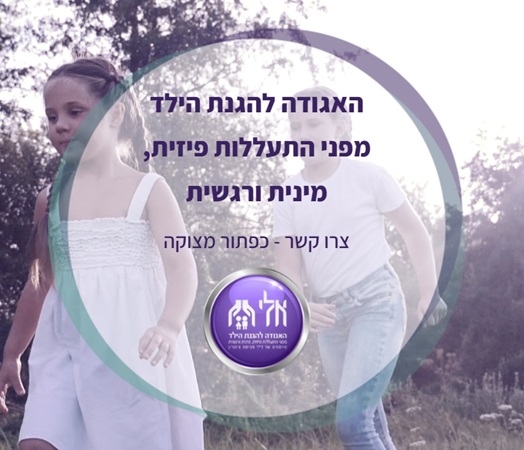
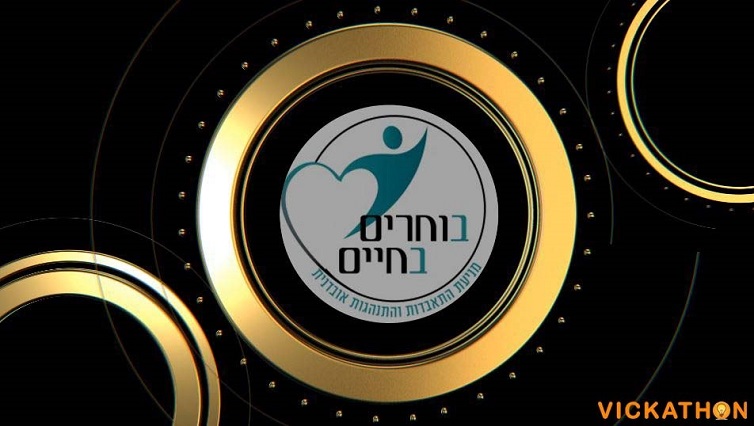
At the beginning of July 2021, we led a hackathon for the Suicide Prevention Unit within the Ministry of Education.
The challenge presented to the teams was to upgrade the various plans of the program developed by the unit and prepare a catchy and witty sticker that would be published in multiple media.
Each team received and worked on a different module of the program.
The teams worked under a tight schedule, which challenged them and brought out the best in them. Thanks to them, the program will be upgraded :)
Alongside a combination of creativity, innovation, teamwork, and everything else a hackathon brings, the teams have managed to accomplish meaningful and applicable outcomes within a limited time.
That way, in just a few hours, the teams managed to achieve results that usually take a lot of time to accomplish.
The event was held virtually, using the Vickathon system for leading experiential hackathons.
After a day like this, we feel like doing something meaningful.
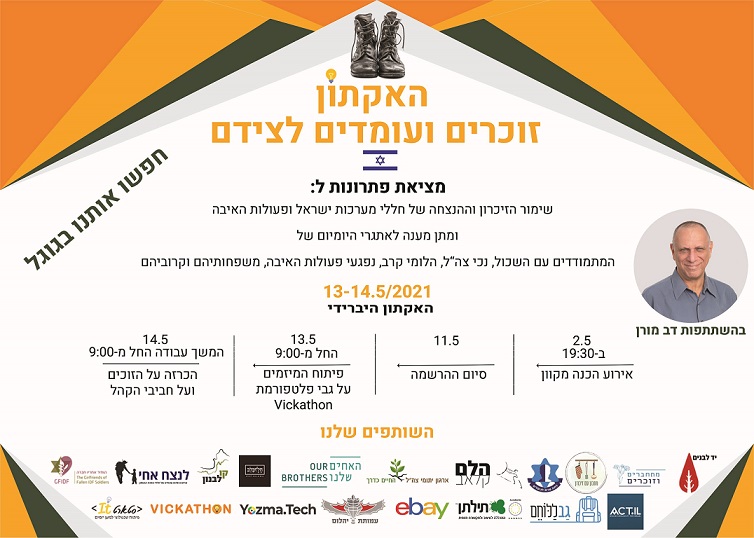
The "Remembering the fallen and standing by their families and relatives" hackathon was addressed to the entire public in Israel. The event was attended by teenagers, preparatory students, students, high-tech employees, people who this theme is close to their heart, and senior citizens as well.
The goal of this hackathon was to recruit the help of the startup nation to come up with technological solutions for keeping the memory and commemoration of the fallen soldiers of the wars of Israel and victims of actions of terrorism, and for providing an answer to the day-to-day challenges of those who are coping with grief, disabled IDF soldiers, post-traumatic, victims of terrorism, their families and relatives.
The hackathon event lasted for a day and a half and was held in a hybrid format, with teams participating from entrepreneurship centers and online, providing maximum flexibility.
The significant theme chosen touches the heart of Israeli society, and so, even though the hackathon event took place during a war and under rocket attacks (the "Guard of Walls" operation), 25 teams participated. They came up with practical solutions to the challenge presented to them.
You could say that this was one of the most successful hackathons ever to take place in Israel, and if only for the reason that out of those 25 teams, nine chose to move ahead and turn their idea into a project presented during the hackathon.
Galit Zamler and Inbar Berger, who produced the hackathon from start to finish, are helping the teams connect with the right people who can contribute their experience, skills, and connections to bring the projects to life.
All participants received a certificate of participation shortly after the hackathon concluded, as did the winners, the crowd favorite, and the professional mentors who accompanied the teams, doing so out of goodwill and with great patience throughout the event.
Below you can read a selection of comments from those who participated in the hackathon:
Aviad Turm, a member of the winning team:
"Galit and Inbar, thank you so much for hosting this amazing hackathon event. It was a pleasure being a part of it!"
Moran Talmor, a member of the team that won second place:
"Thanks for exemplary organization, the wholehearted effort, the support, and availability you showed every single moment. We took great pride in participating in this hackathon and gained renewed energy from the work we were exposed to during the event...The event was so well-invested, down to the fine little details."
Roma Timoshpolski, the CEO of "Yozma Tech," a judge in the hackathon, and the primary prize giver:
"The organization was excellent - a national mission despite these challenging times. Best of luck!"
Attorney Adi Barkan, mentor and judge in the hackathon:
"Dear Galit and Inbar, thank you for your brilliant leadership and professional execution. It was great to be a partner in the process. Well done!"
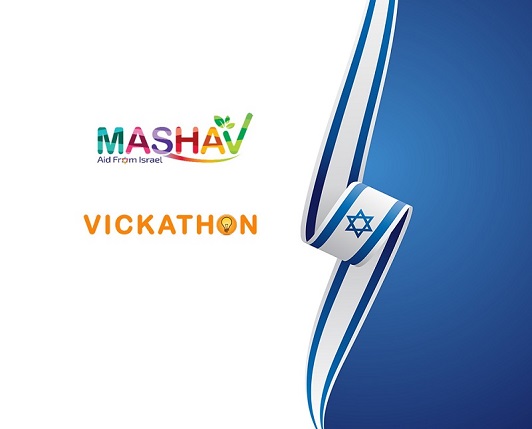
The Vickathon team ran an international virtual hackathon for leading educators who participated in an online course by MASHAV - Israel's Agency for International Development Cooperation, Ministry of Foreign Affairs.
The hackathon dealt with the challenges of education and loneliness caused by the coronavirus.
All participants were divided into teams and worked together, each from their own country, on a shared online file.
The online file was tailored specifically for them over Vickathon.
After uploading ideas (ideation stage), the participants chose the best idea, developed it according to the online shared file sections, and watched short and enriching tutorial video clips.
From time to time, we took breaks, as is customary in every hackathon, where we participated in enriching and fun activities.
We ended the event with pitches, and each of us voted for three favorite ideas. That's how we determined the audience's favorite ones and who won a virtual medal.
Everyone enjoyed the competition very much, as one can see from the following:
"It's a very amazing experience. I like it."
"Enjoyable experience."
"Exciting experience. You are all great."
"It is an exciting program!"
"Thank you very much for the value addition."
"Hey! I like the site we have used for the hackathon."
"I would like to know more about it. Thank you."
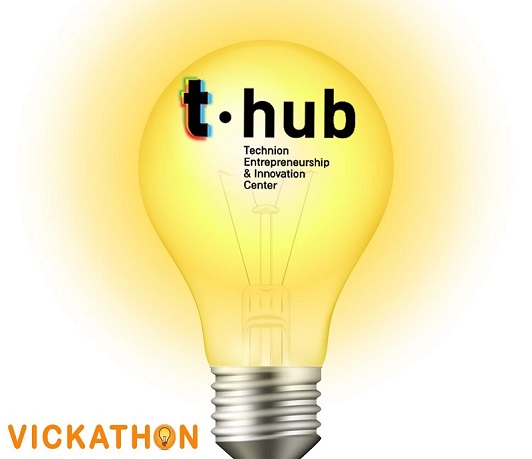
The t-hub students at the Technion institution participated in the Entrepreneurship Fundamentals Course.
Dr. Dina Raphael, the course facilitator, led an online hackathon for students.
Ten groups of students developed ideas for social ventures with a focus on business feasibility.
At the end of the virtual hackathon, Galit Zamler received a certificate of appreciation for Vickathon's contribution to the online event's success.
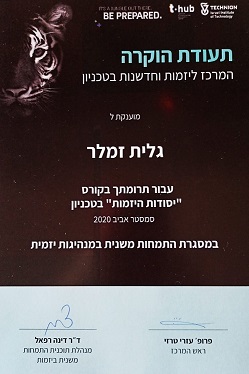
In November 2020, following her satisfaction with the Vickathon experience, Dr. Dina Rafael decided to lead two additional hybrid hackathons for her students in two entrepreneurship courses she teaches.
Galit Zamler participated in online sessions with students from both courses to introduce them to Vickathon, where they develop their ideas for ventures.
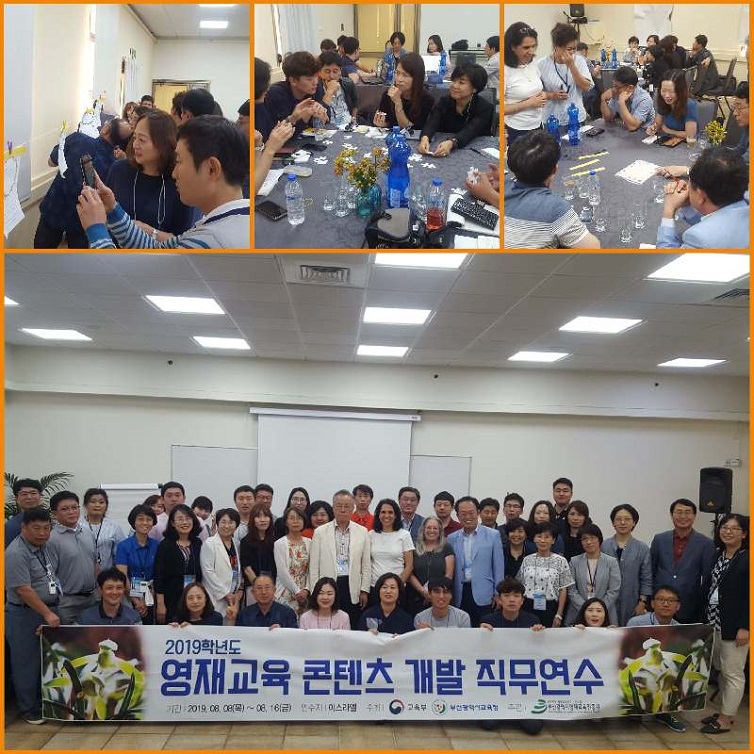
A delegation from South Korea visited Israel in 2019 as guests of the Mashav at the Ministry of Foreign Affairs.
The participants took part in an activity for the first time, based on hackathons. Presented with challenges, the teams were asked to think of creative solutions. The participants then selected the most successful ideas themselves.
A hands-on workshop was held at the event to demonstrate the need for participants to acquire skills from the entrepreneurship domain to succeed in today's changing world.
Participants enjoyed the event and gained insight into the startup nation.
Galit Zamler conducted a Hackathon-style preparation day at the religious school in Hevron for boys, led by Rabbi Shlomo Levinger in Kiryat Arba.
This was the first time the school staff attended a Hackathon. The goal of the event was to develop and implement well-planned initiatives that would improve the school climate and student achievement.
During the event, the teachers were exposed to enrichment lectures on Israel as an entrepreneurial state and the importance of entrepreneurship education. They also learned about models to develop projects based on a business plan.
The teachers participated in creative thinking workshops, learned how to present an idea, and enjoyed an activity that incorporated entrepreneurial skills as life skills.
Teachers had an experiential and practical learning day, during which they generated numerous ideas for initiatives and developed work plans for ten initiatives that align with the defined goal. All initiatives can be implemented at the beginning of the school year.
By the end of the event, a competitive vote was held, and four leading initiatives were chosen, which teachers will lead to realization.
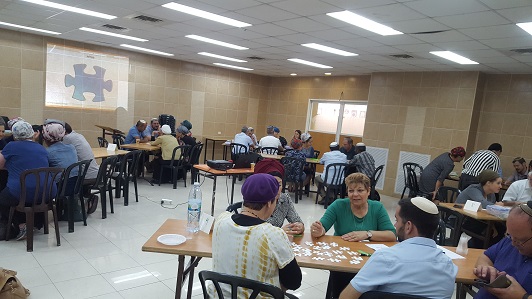
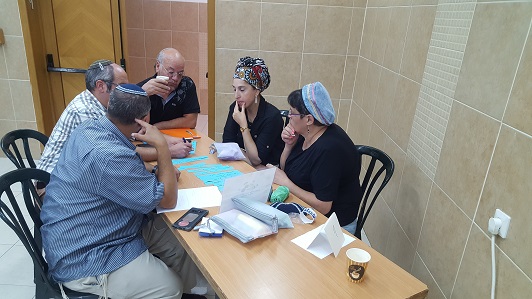
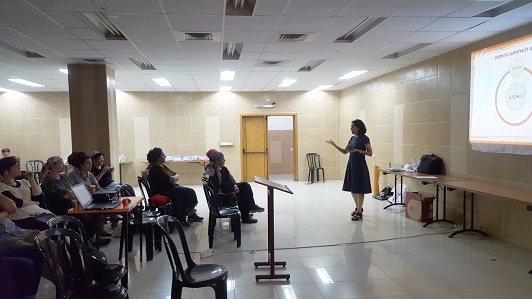
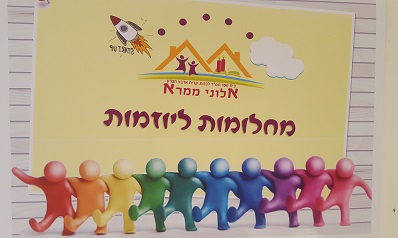
Galit Zamler led a day of preparation for the staff of the "Alonei Mamre" school, headed by Mrs. Yael Klein, in the style of a Hackathon, in line with the school's vision.
Before this day, the teachers had gone through a process of raising dreams and defining a school vision with Mrs. Ayala Fisher, so the Hackathon was called "From Dreams to Initiatives."
At the event, the teachers worked in predefined groups, raised numerous ideas for initiatives that aligned with the vision, and then filtered them according to the criteria defined by the management staff.
Although the process of screening ideas was challenging, each team chose only one idea and developed it according to a business plan model.
The teachers presented the final ideas to their peers, and they were put to the vote. Thus, three final ideas were chosen to be implemented by all the teachers, according to their preference.
All of the teachers' ideas for initiatives that did not reach the final stage will serve as a repository for future projects.
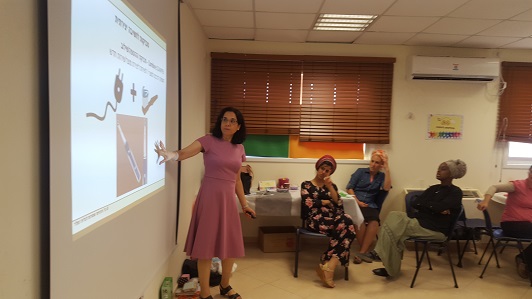
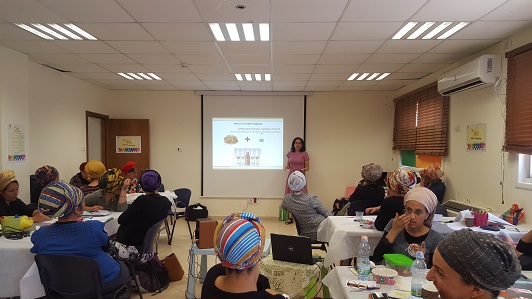
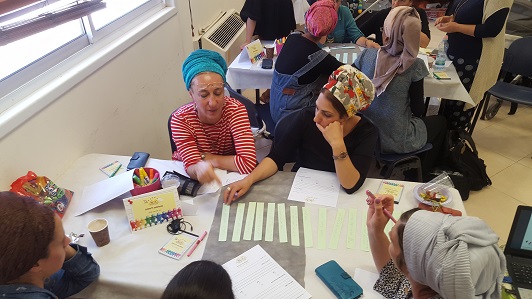
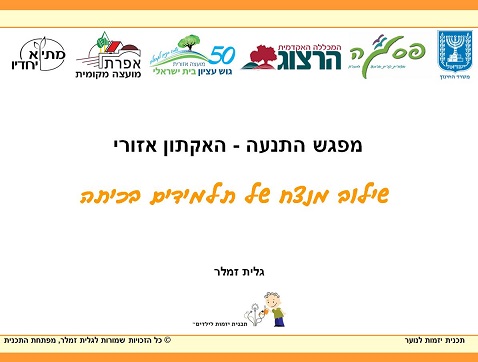
In cooperation with the Ministry of Education through the Pisgah Center in Kiryat Arba, the Gush Etzion Regional Council, the Efrat Council, the Herzog Academic College, and the Mattei Yachdav organization, a regional Hackathon was organized for principals, teachers, students, and parents.
The theme of the event was "A Winning Integration of Students in the Classroom."
At the next stage, Galit Zamler explained to the participants what a Hackathon is and led an experiential workshop on 21st-century skills, which enabled various team members to learn about each other's strengths.
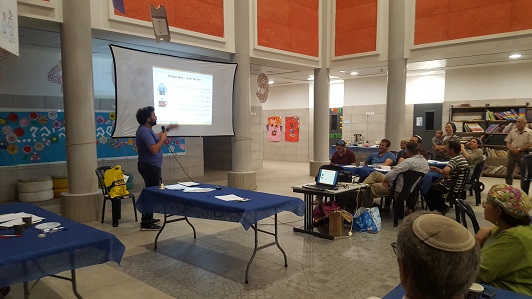
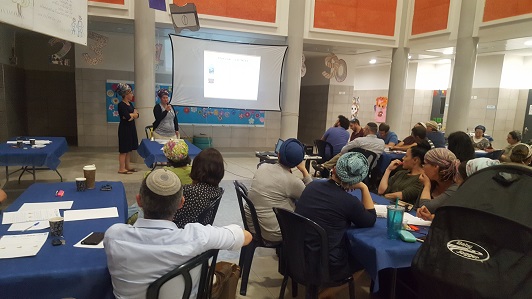
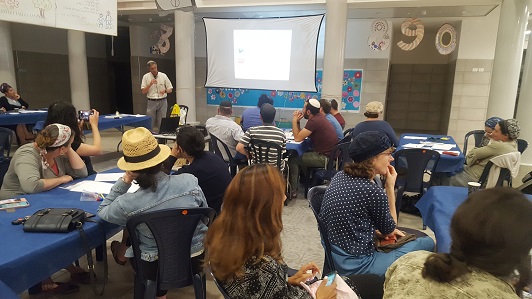
From here, we proceeded to a brainstorming session, generating ideas for teaching that cater to all students through a future-oriented pedagogy.
Each group chose its best idea, presented it to the attendees in an entrepreneur's pitch style.
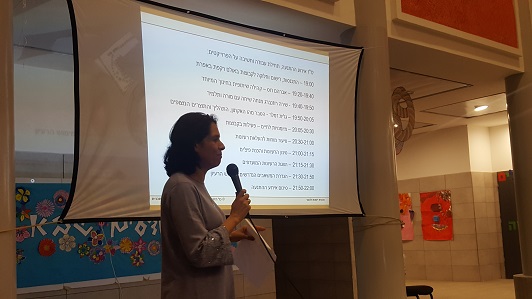
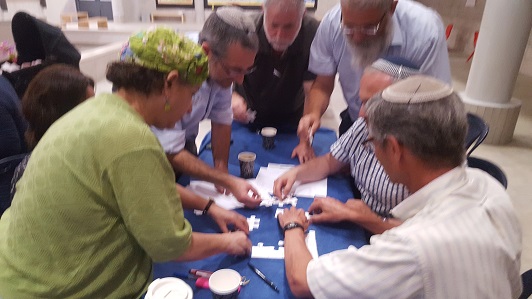
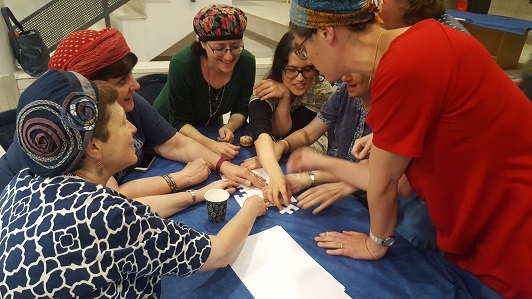
Are You Ready to Launch Your Event?
Fill in this form to contact us.
Or contact us by Email at [email protected].
Alternatively, you can schedule an online meeting with us via this link at your convenience.
Our hackathons are offered in face-to-face, hybrid, and virtual formats, tailored to meet the needs of each school.
Hackathon events for students, teachers, and school directors in elementary, junior high, and high schools are focused on entrepreneurship. They are refreshing, varied, and encouraging an entrepreneurial mindset, creativity, and teamwork.
As a tech and educational entrepreneur, Galit Zamler was the first to lead a hackathon in 2014 for 4th- to 6th-grade students from four different schools across Israel. Since then, hackathons have become common events in the education system and schools. They aim to encourage innovation, creative and entrepreneurial thinking, teamwork, and instill other skills in a time-framed event.
The hackathon events were tailored to the schools' needs, considering the participants' age, study hours, content, pace, and various abilities. Since the first hackathon for students in 2014, which was a great success, we've led numerous hackathons for students, teachers, and principals. Some of them were international hackathon events.
Though the hackathons originate from the high-tech world, as you will understand from reading this page, hackathons have no age limit. Our hackathons in education were attended by children, both boys and girls, teenagers, teachers, principals, and educators from Israel and abroad. Other hackathons, which we led, were also attended by senior citizens :)
We hold the flexibility to lead hackathons in different ways, thanks to using a unique system we've developed called Vickathon for leading experiential hackathons to an unlimited number of participants.
Vickathon is part of the 5th cohort of the EdStart program. This is a unique national program of the Ministry of Education. It collaborates with the Ministry of National Digital, Digital Israel, the Taasiyeda Association, and the Israeli Association of Advanced Industries (IATI). It identifies exceptional and groundbreaking educational-technological ventures, empowers them, and helps them grow, creating a broad impact on the education system.
At the end of the program, Mr. Eitan Kleinman, the head of the program, wrote: "Dear Galit, it was a pleasure having you take part in this program. The small waves of change you're creating in the field of educational entrepreneurship in Israel and around the world are reaching new heights that you can't even fathom the magnitude of their impact. This is what the power of education can do. Thank you so much for partnering with EdStart. Wishing you many more successes in the future."
We have summarized the experience of leading a hackathon for students in ten sections that will help you organize the perfect event:
1) Dividing the event into stages.
2) Harnessing accompanying teachers and having them actively present throughout the hackathon is vital.
3) Make sure to choose mentors of both genders who will support the students out of goodwill and with lots of good vibes. Hold a preliminary meeting with the mentors.
4) For the hackathon to be meaningful, pay attention to the process that the students are going through and to empowering them.
5) It's recommended to prearrange the teams in advance.
6) Prepare an idea generator that will help the participants come up with ideas for projects regarding the hackathon theme.
7) Ensure a dynamic event that combines lectures, workshops, and breaks.
8) Use gamification throughout the hackathon and create an anticipation for the next steps.
9) Prepare and arrange the hackathon from the very beginning stage to the end. As always, the success of an event depends on the planning of the small details.
10) And finally, all involved, without exception, should want the hackathon to succeed.
Galit Zamler gave a lecture on innovative learning through hackathons at the international GIFT event.
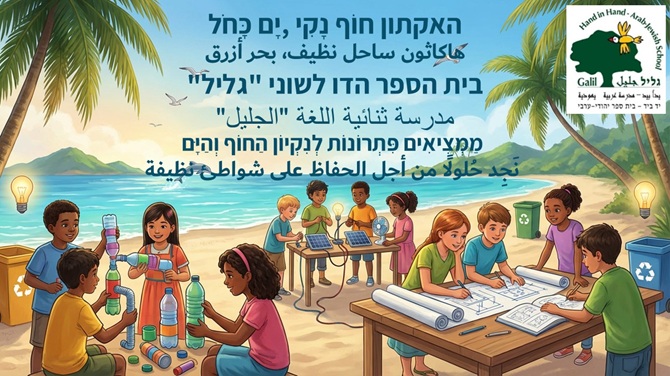
At the bilingual "Galil" School in northern Israel, we led a two-day hackathon for 3rd-grade students as part of an ongoing learning process focused on marine and coastal pollution.
On the first day, students identified challenges and proposed creative solutions.
On the second day, they transformed their ideas into tangible models and presented them in class.
The hackathon emphasized the process, not just the outcome, fostering teamwork, critical thinking, and the ability to clearly present an idea.
The entire hackathon was conducted in both Hebrew and Arabic, with two educators in each classroom. All hackathon materials and the online work on the Vickathon platform were adapted for bilingual use in response to a real need from the field.
The hackathon demonstrated that even at a young age, students can develop entrepreneurial thinking, connect to environmental values, and engage in meaningful collaboration.
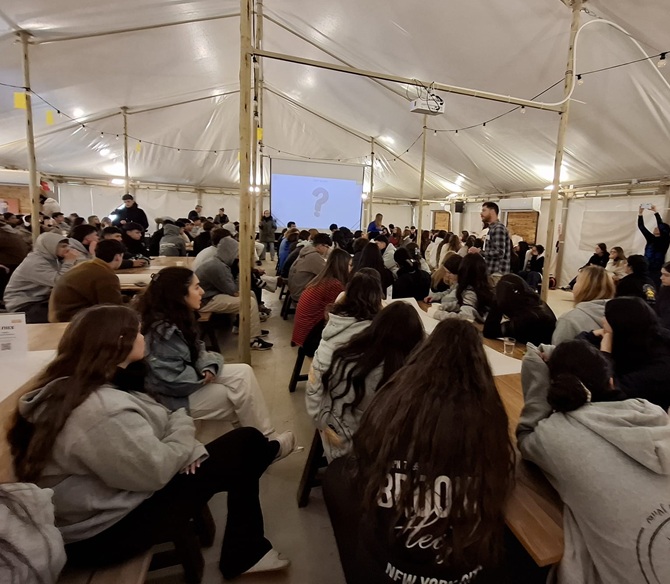
The "Navigating Toward Independence" hackathon at Begin High School was designed as an educational process with clear continuity. Eleventh-grade students developed initiatives intended for real-world implementation in the following academic year, as they move into 12th grade.
During a full working day, students collaborated with the school's teaching staff, who served as mentors, to shape ideas for meaningful school-based preparatory programs with strong educational and social value. Each initiative was required to address at least one of four core goals: Jewish-Israeli identity, community belonging and engagement, life skills, and mental resilience and personal agency.
The hackathon took place at the Next Generation House at Havat Aharonson and resulted in the selection of 11 practical outcomes across the fields of community, education, personal resilience, and preparation for adult life.
This was the second hackathon led by Vickathon at Begin High School, reflecting an approach that views hackathons as a tool for developing ongoing educational processes rather than a one-time event.
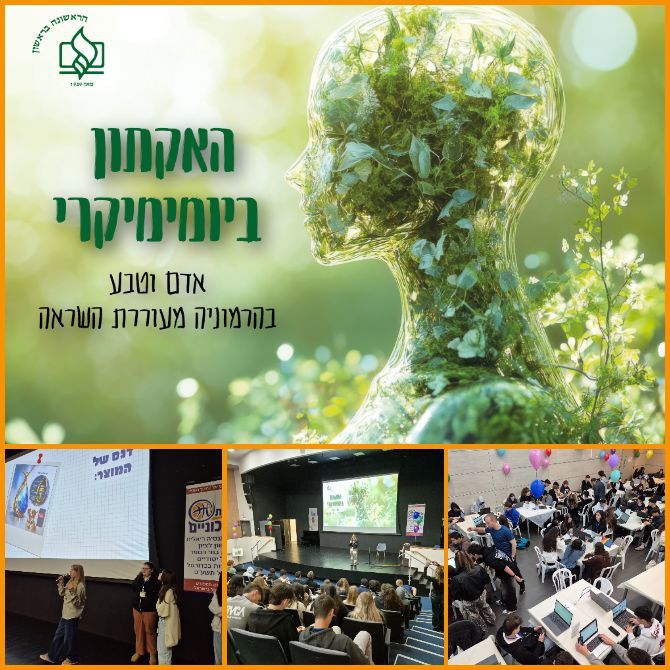
The Biomimicry Hackathon at the Hagimnasiya Harealit focused on innovation through observing nature as a model for solving complex human challenges.
Sixteen teams of gifted 10th-grade students participated in an intensive process that included research, idea development, presentation development, and pitching, culminating in the presentation of innovative solutions inspired by principles from the natural world.
The hackathon was designed as an applied learning process, with clear evaluation criteria and a professional judging panel. It concluded with the selection of the winning teams and a People's Choice award.
This marked the fifth hackathon led by Vickathon at the Hagimnasiya Harealit, reflecting an ongoing partnership that enables students to transform theoretical knowledge into entrepreneurial thinking and real-world application.
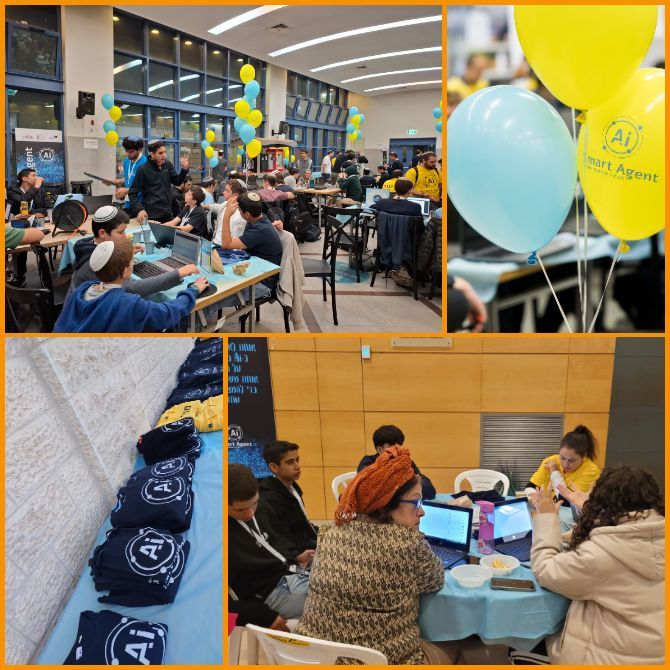
The Smart Agent AI Hackathon in Jerusalem was designed as a multi-stage process for students in grades 7-12, guiding them into the world of autonomous AI agent development, from early ideation through to building a working demo.
In the first stage, the journey began with a large-scale opening event at the Lev Campus, attended by approximately 200 students from schools across Jerusalem. Participants were introduced to the principles of working with AI agents and to thinking about intelligent systems that operate end-to-end, with an emphasis on real development rather than the use of ready-made tools.
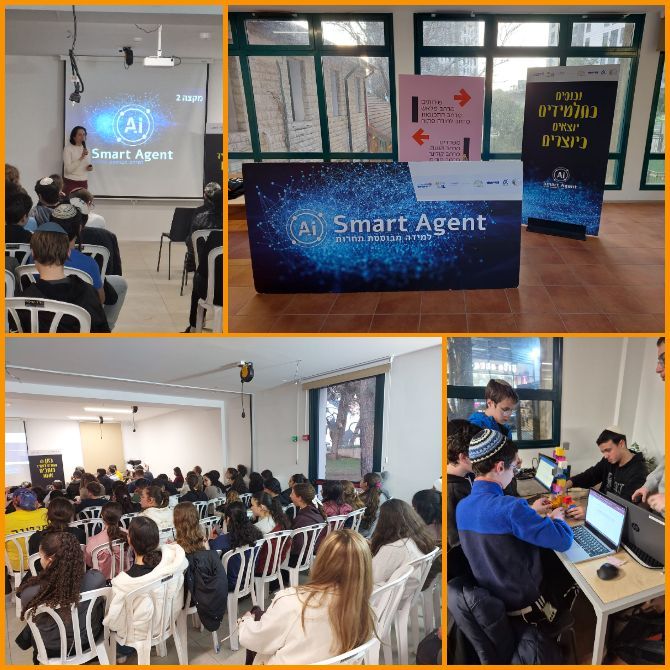
In the second stage, teams moved from having an idea to building a working Demo+.
This stage focused on product and technological decision-making: prioritizing capabilities, identifying risks, defining areas of responsibility, and understanding what is required to present a system that can be confidently demonstrated.
The work was carried out in a format that simulates real development teams, supported by professional mentors, with a clear demand for accountability for results, not just ideas.
The initiative is conducted in collaboration with the Torah and Science High School, the Ipcha Innovation Center, Prizma, the Jerusalem Education Administration, the Municipality of Ashdod, and Bright Data, with professional leadership by Yoni Krichevsky and Galit Zamler.
The first two stages laid a solid professional foundation for the entire journey.
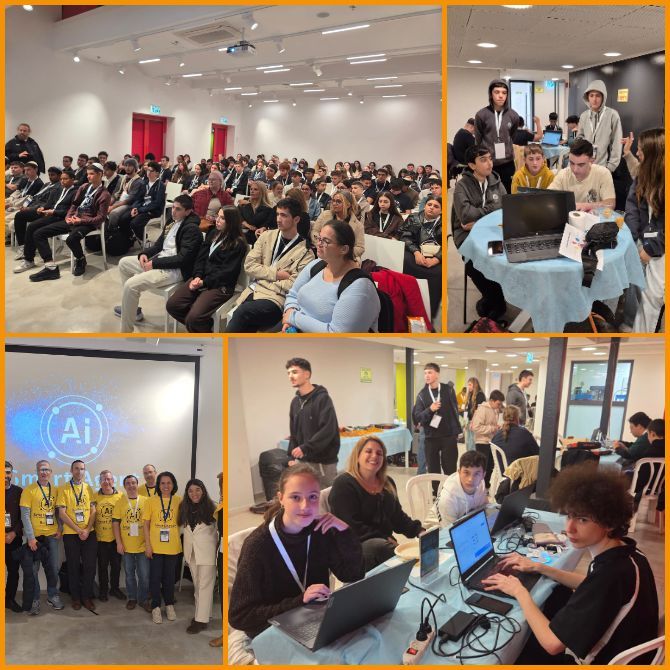
The Smart Agent AI Hackathon took place at the Ashdod Technology Center and brought together students in grades 8-12 from schools across the city to tackle an advanced challenge: developing AI agent-based solutions with real social impact.
Twenty-four teams worked on defining ideas and translating advanced technology into practical, applicable solutions. The focus was not on technological demonstration alone, but on process understanding, systems thinking, and responsible use of AI tools.
The hackathon was held as part of the city of Ashdod's 70th anniversary celebrations, in collaboration with academia, the education system, and the local authority. Professional mentoring enabled students to work at a high level, sharpening their thinking through challenge and depth.
The winning teams advanced to the next stage of the Smart Agent AI competition in Jerusalem.
This hackathon demonstrates how competition-based learning can become a relevant and meaningful educational process.
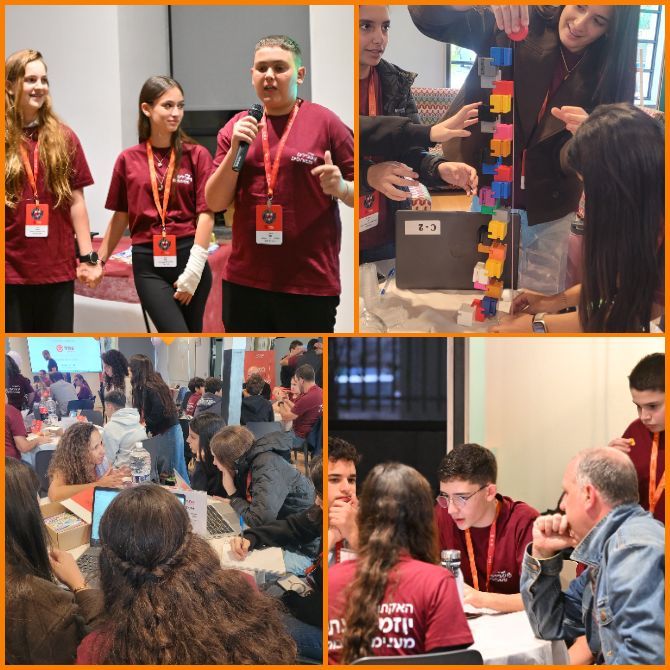
This was the second year we collaborated with the Atid Network on a hackathon. This time, the event focused on "Initiating the Future, Strengthening Connections," bringing together students from across the country around one shared challenge: strengthening human connections among teenagers through technology.
This was not a hackathon focused solely on brilliant ideas, but a day built around a deep, structured process. Participants were required to identify a real emotional and social need, break it down into its core components, and develop a technological solution that is feasible, delivers real value, and uses clear, human-centered language.
Throughout the day, it became evident how deeply the students were connected to the topic and how well they understood its implications. The use of AI tools was not the focal point, but rather a means. A tool that helps sharpen thinking, explore directions, and support the process without replacing it.
The three winning projects clearly reflected the spirit of the hackathon:
✓ An anonymous and immediate support solution for teenagers, combining artificial intelligence, professional guidance, and a safe environment.
✓ A platform designed to strengthen self-confidence and a sense of belonging by connecting teenagers with one another.
✓ A digital space that enables self-expression, mutual support, and encourages real-world, face-to-face interactions.
The decision to focus on human connections rather than technology alone resulted in a hackathon where entrepreneurship met values, and innovation met sensitivity.
Hackathons of this kind demonstrate how experiential learning, entrepreneurial thinking, and digital tools can come together into a holistic educational process. One that develops not only solutions, but people as well.
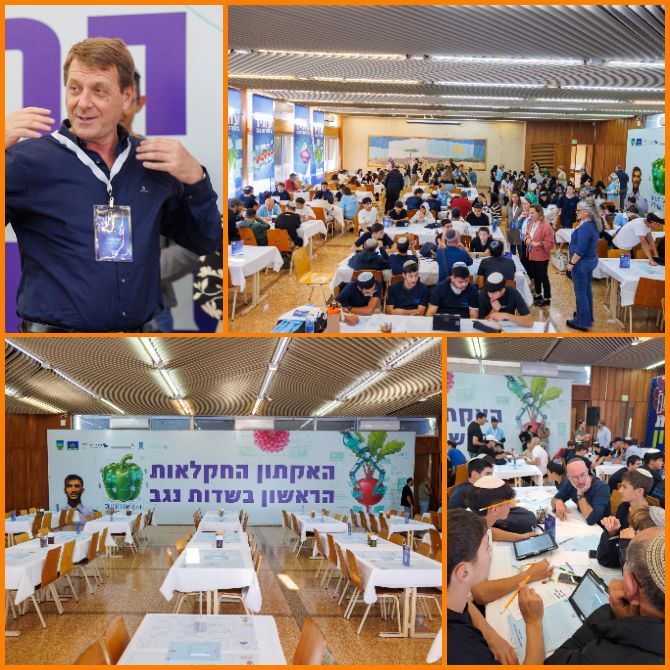
The Sdot Negev Hackathon focused on agriculture, research, and entrepreneurship.
The hackathon brought together approximately 180 ninth-grade students from communities across the Sdot Negev Regional Council for an intensive learning day that marked the starting point of a meaningful, year-long educational process.
During the hackathon, held at Kibbutz Sa'ad, 37 student teams worked on real-world agricultural challenges. Local farmers and agronomists presented their crops, processes, and on-the-ground dilemmas, sharing the needs and questions that shape their daily work.
Rather than developing quick solutions, the students were guided to formulate precise scientific research questions based on the needs presented to them. These questions will accompany them throughout the school year, during which they will deepen their research, collect data, and ultimately return with practical insights for the farmers.
The hackathon is part of a broader educational approach that integrates entrepreneurship, scientific thinking, and hands-on learning, while creating a direct connection between the education system, the community, and real-world practice.
Choosing to carry out this process in the Gaza Envelope added an additional layer of meaning, highlighting the connection between education, community resilience, and building a local future within a complex reality.
We led a city-wide hackathon at the Ashdod Technological Center called ECOTHON. The hackathon brought together approximately 120 students from 7 schools and 3 local authorities for an intensive day of brainstorming, development, and the creation of environmental solutions.
The hackathon was held in collaboration with the Municipality of Ashdod, the Environmental Protection Department, the Yavne Regional Cities Association, ITEC, and dozens of mentors from industry, the IDF, and academia.
Participants developed innovative technological initiatives in the field of sustainability, including SEABOT - a smart, mobile trash bin powered by solar energy that identifies waste and rewards users through a dedicated application.
The event emphasized meaningful connections between students from different schools, teamwork, creative thinking, and technological implementation with real environmental impact.
Feedback from the field reflected an empowering, professional, and inspiring experience, as well as a deep connection between innovation, values, and meaningful action for the city and the environment.
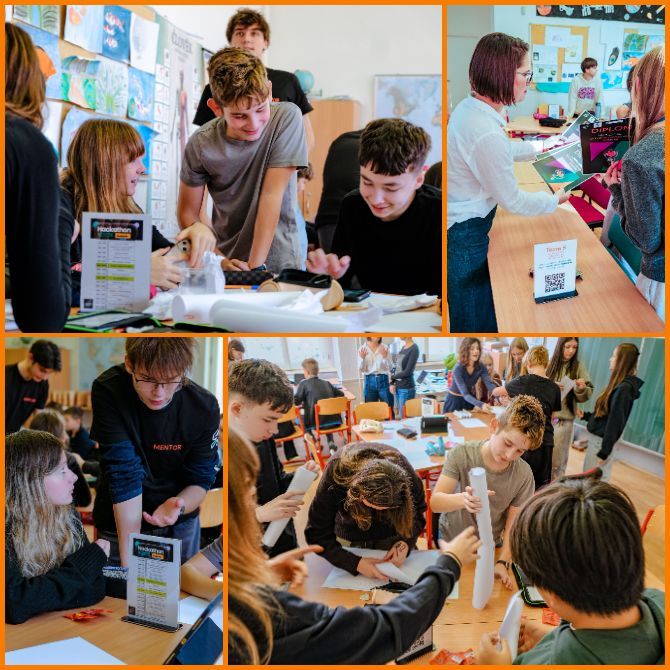
Skills 4 Future, the official Vickathon licensee in the Czech Republic, led the first student hackathon in the country in 2025, using the educational hackathon format developed by Galit Zamler.
The hackathon focused on real social challenges from students' everyday school life, with an emphasis on belonging, building friendships, integrating new students and students from diverse cultural and linguistic backgrounds, and reducing loneliness and bullying.
Students developed a wide range of entrepreneurial solutions - including apps, social initiatives, and school-based frameworks - all rooted in authentic personal experiences and a shared desire to create a more inclusive, connected, and safe school environment.
A key strength of the hackathon was the consistency of the ideas around a common core need, demonstrating how the Vickathon format enables students to identify meaningful social challenges, think entrepreneurially, and turn personal experiences into impactful solutions.
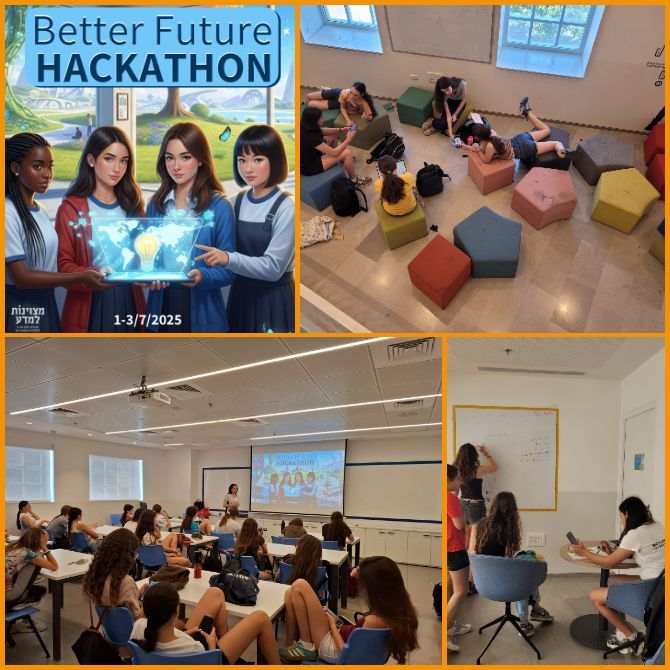
This is the second year we've led a hackathon for outstanding students in the Odyssey Program at Tel Aviv University for Youth, as part of their summer camp.
In this three-day intensive hackathon, around 50 participants who had just completed 7th grade and came from all over Israel were challenged to dream up and develop solutions to promote a better future for teenagers in Israel.
Throughout three days filled with creativity, collaboration, and curiosity, not only were fascinating ideas born, but meaningful connections between the girls were also formed.
At the start of the hackathon, we informed them that by the end of the event, each team would present a developed website or app that reflected their idea.
The initial response was filled with doubt:
"But none of us knows how to code!"
That all changed on the third day, when we introduced them to advanced AI tools that enable building apps and websites - no coding required. We focused on two leading platforms:
Base44 - An impressive Israeli-developed platform with a limited but effective free version.
Google AI Studio - A flexible and versatile environment for building digital interfaces.
And so, despite their initial skepticism, students who had never built an app before saw their ideas come to life before their eyes. They became excited, worked persistently, learned from their experiences, and some even opened new accounts to bypass technical limitations, refusing to give up until they had a product they were proud of.
This hackathon sparked a real sense of capability. It brought together students who became friends and opened a door to a new world of entrepreneurship, problem-solving, and innovation.
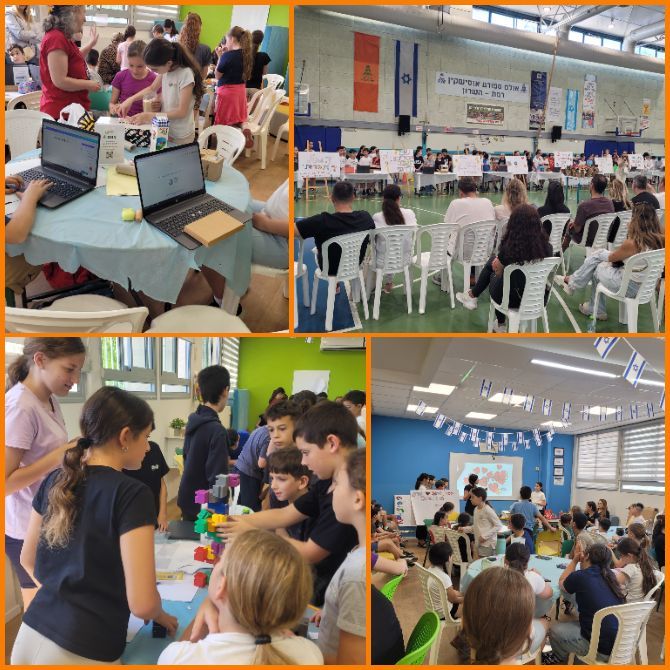
Fifth-grade students at Ussishkin School in Ramat Hasharon participated in a singularity project this week, which transformed them from students into young entrepreneurs.
The week began with inspiring lectures by professionals and parents, exposing students to diverse content worlds and broadening their horizons.
Following this, the students went on an educational tour of an ecological park, where they gained a deeper understanding of the connection between nature and sustainability.
The heart of the week was dedicated to developing innovative projects - students worked for two days on original ideas aimed at improving the quality of life in the city and at school.
It was exciting to see how the students identified needs in their environment and thought of creative solutions.
The week's climax came on Friday when the teams proudly presented their projects to the parents.
Each team prepared a professional presentation, a convincing pitch, designed signage, and a tangible model.
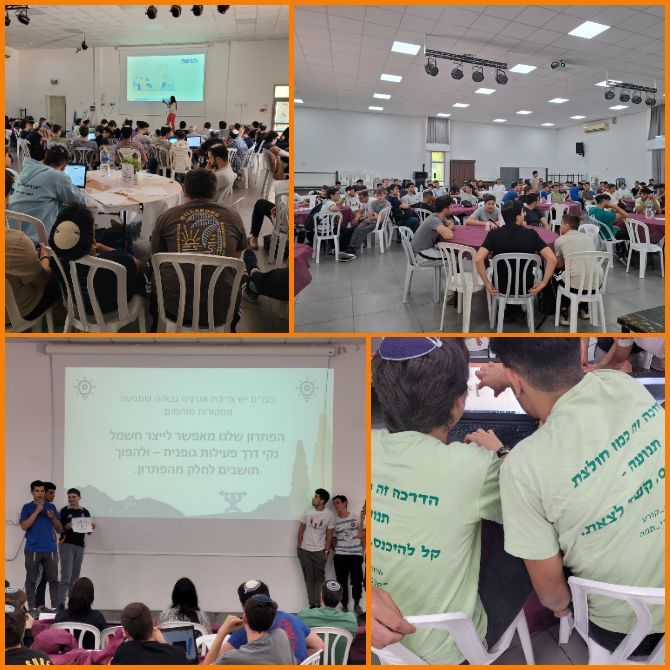
This is already the third year that this unique hackathon has been held at the Bnei Akiva Givat Shmuel High School Yeshiva, focusing on a topic that's on the global agenda: the climate crisis.
The event, held as part of science studies and led by science coordinator Talya Zinger, invites students to become young entrepreneurs working for the environment.
During the hackathon, students were invited to propose ideas for scientific, technological, and engineering solutions that would address the challenges of the climate crisis.
Twenty-one student teams worked throughout the entire day, developing innovative and creative ideas and presenting them to judging panels in two separate venues.
At the end of the day, the three outstanding teams in each venue were selected, earning the highest ratings from the judges for creativity, systematic thinking, and implementation capability.
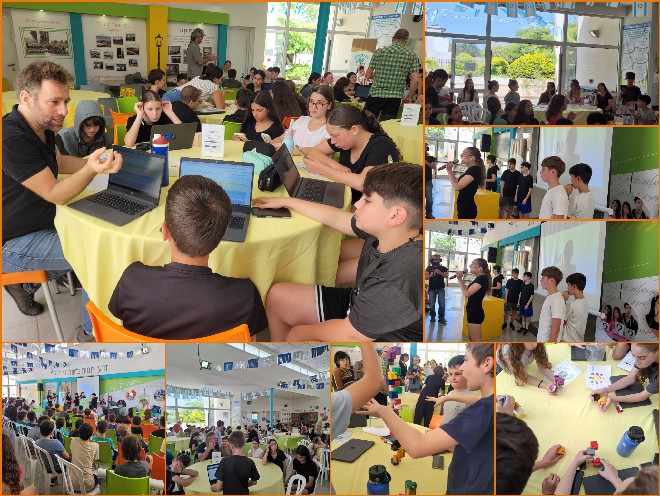
This is the third year that Sadot School in Pardes Hanna Karkur, under the leadership of Principal Talmor Closs and entrepreneurship coordinator Adi Saporta, hosted a hackathon with us.
Each year, the school demonstrates that innovation is not limited to any specific age group.
This year, 5th and 6th grade students tackled an exciting challenge: How to create a better future?
It is a seemingly simple question, yet profound and complex.
The Sadot School is recognized for its distinctive approach to entrepreneurship education. The students here don't just learn about innovation - they live it. They are skilled in identifying needs in their environment, developing creative solutions, and bringing ideas to tangible reality.
Parents of students accompanied the teams on the first day as mentors and assisted them throughout the process.
On the second day, all 18 teams presented pitches and presentations that were impressive in their professionalism, alongside prototypes they built themselves to illustrate their ideas.
A distinguished panel of judges ranked the ideas, and three winning concepts were selected, along with one team as the audience favorite.
Hackathon Winners:
First place went to a team that designed an application connecting the elderly generation with teenagers.
This is the pitch video that the students prepared and presented at the international event Global Innovation Field Trip:
Second place went to a team that designed a mechanism to identify drunk drivers and prevent them from driving.
Third place went to a team that designed a digital game for collecting trash (Pokemon-style) using a map and a drone.
The audience favorite was a team that designed a robot drone that photographs and documents our lives from birth and, with the help of artificial intelligence, helps us remember details and solve daily problems.
In conclusion, when you see children at such a young age thinking about solutions to real problems - from elderly loneliness to road safety - you realize that the future is in good hands.

Students from the Research, Environment, and Entrepreneurship track in grades 7-9 participated in a hackathon to find solutions for challenges in the agricultural sector at Kfar Silver.
The students visited various farm departments, identified challenges, and questioned department managers about these challenges, learning about their causes and implications.
Below is a list of challenges the students researched:
✓ What problems are there with pigeons in the cowshed?
✓ What issue is there with the dampness of the bedding in winter?
✓ What problems are there with bringing the goats into the milking parlor?
✓ What issue is there with bedbugs in the barn?
✓ What issue is there with fire ants in the greenhouses?
✓ What issue is there with sharp-leaved pepperweed in the greenhouses?
✓ What problems are there with sludge in the goose pond?
✓ What issue is there with the water containers in summer?
✓ What problems are there with managing and tracking equipment in the barn?
✓ What issue is there with dust and leaves on the pathways?
During the two-day hackathon, students worked in teams, developed solutions to the challenges, filtered them according to the presented criteria, and chose one solution to advance throughout the hackathon.
The students were accompanied by mentors who are closely familiar with the agricultural farm and its challenges.
At the end of the hackathon, the teams presented their solution model, a presentation, and a pitch to a panel of judges from the village administration.
Two teams won according to the judges' ranking, and one team was chosen as the audience favorite.
The Kfar Silver administration intends to promote the winning ideas.
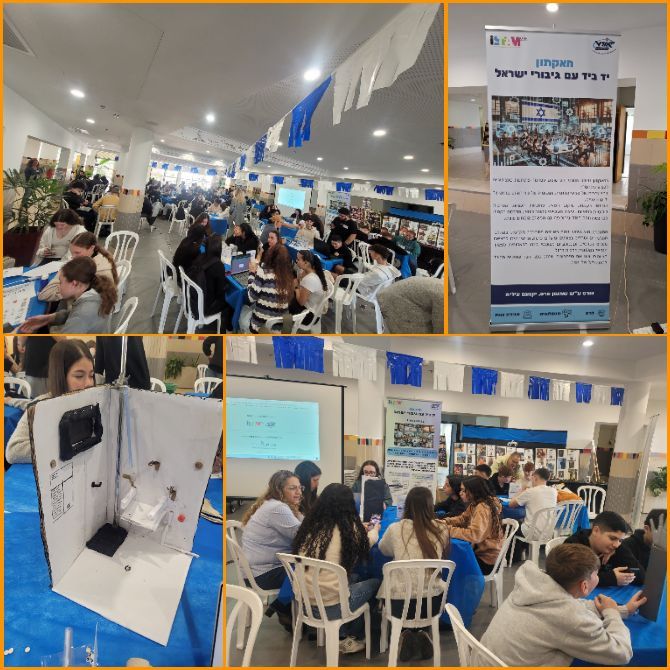
We had the privilege of leading, for the second consecutive year, a hackathon at Ort Shimon Peres with Dr. Dina Falikovich, Chemistry Coordinator. This event demonstrated the combined power of science, technology, empathy, and creativity.
Ninth-grade students at Ort Shimon Peres in Yokneam proved that age is just a number when it comes to developing solutions for significant challenges. 18 teams worked diligently on creating artificial intelligence-based technological solutions for limb-injured veterans from the Swords of Iron War.
A Journey of Preparation and Understanding
To ensure their ideas would be not only creative but also practical, the students underwent comprehensive preparation:
✓ Participated in a creative thinking workshop
✓ Experienced performing basic daily activities without using limbs and documented their experience
✓ Deepened their understanding through reading articles about challenges faced by limb-injured veterans
✓ Gained scientific knowledge in a lecture by Professor Noam Shomron from Tel Aviv University's Faculty of Medicine
✓ Received professional guidance from Sagi Ben Bassat and Ruti Gabrieli
✓ On the morning of the hackathon, an inspiring talk by David Leitner from the Restart Association gave them additional perspective
During the hackathon, each team worked with a professional mentor and presented their idea through a pitch presentation and a demonstration model. Thanks to the thorough preparation, the presented ideas were were imposing.
Among the 18 original ideas developed, here are a few examples:
- A robotic hand using EMG (electromyographic) sensors to detect electrical signals from muscles and translate them into finger movements
- A smart wheelchair with wheels that adapt to changing weather and terrain conditions
- Smart Shower provides an automatic and personalized shower experience for limb-injured individuals
This hackathon demonstrated that when students are allowed to tackle real and meaningful challenges, they can surprise us with original and inspiring ideas.
The educational and social value of such an experience is enormous, even if the ideas remain conceptual exercises.
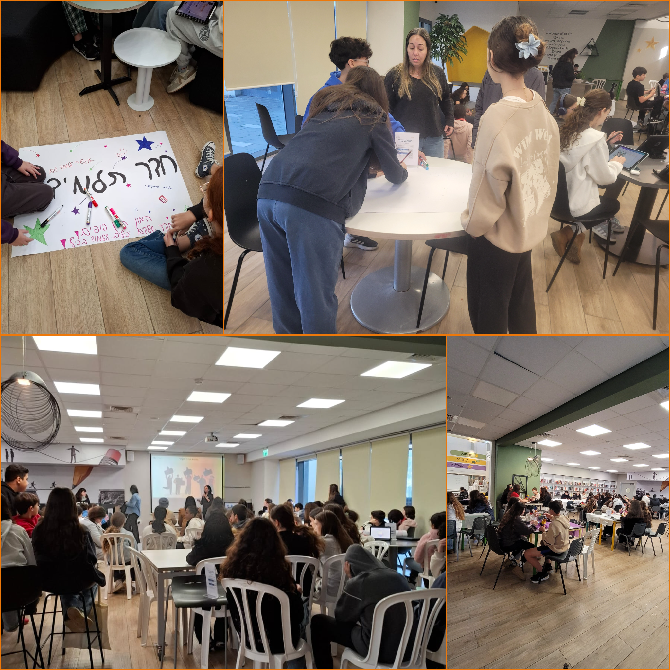
Each of us remembers our middle school period - that desire to be truly seen, to be understood for who we are and what matters to us. It was precisely from this place that the "Seeing Me" hackathon was born, held at the Givat Shmuel Middle School under the leadership of the Vickathon team.
This wasn't just one event but two hackathons - one for 7th grade and another for 8th grade. The initiative came following success two years ago, and this time, the middle school principal, Karen Bukovza, decided to expand the scope and involve two entire grade levels in this meaningful process.
The structure was simple yet powerful: students were asked to identify their needs, challenges, and desires in three main areas - academic, social, and emotional. Afterward, they developed creative solutions for each identified need, selected the best one according to predetermined criteria, and turned it into an actual initiative or project.
What made this hackathon truly special was the emphasis on implementation. The judging panel consisted solely of high school educators, aiming to ensure that the winning ideas would indeed become a reality. This wasn't a competition for competition's sake, but a genuine opportunity to positively impact daily life at the school.
In the end, the event not only gave students a platform to express themselves but also strengthened their feeling of being heard and seen.
The message was clear and direct: We see you, we listen to you, and together, we create real change.
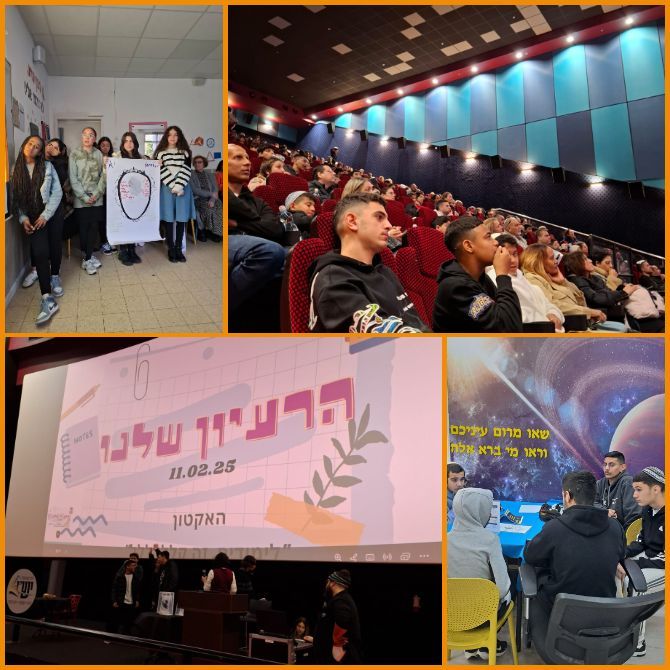
Hagit Abir, principal of Yishai Six-Year High School in Hadera, loved the hackathon concept and asked to lead one for her students.
The school separates boys and girls, so we conducted two parallel hackathons - one for 15 teams of boys and another for 15 teams of girls.
42 educators took on the role of mentors for students throughout the day.
The students developed AI-integrated solutions for everyday needs. All students presented their ideas to judges, and ultimately, six teams advanced to the finals.
The finalist teams presented their ideas at the city's cinema hall, and three winning teams were selected.
Here are the winning ideas:
First Place: AI Mirror - a smart pocket mirror designed to boost confidence and bring joy to our lives
Second Place: ASS (Assistance for Struggling Students) - early identification and treatment of students' academic difficulties
Third Place: A table leg sensor that beeps just before someone bumps into it
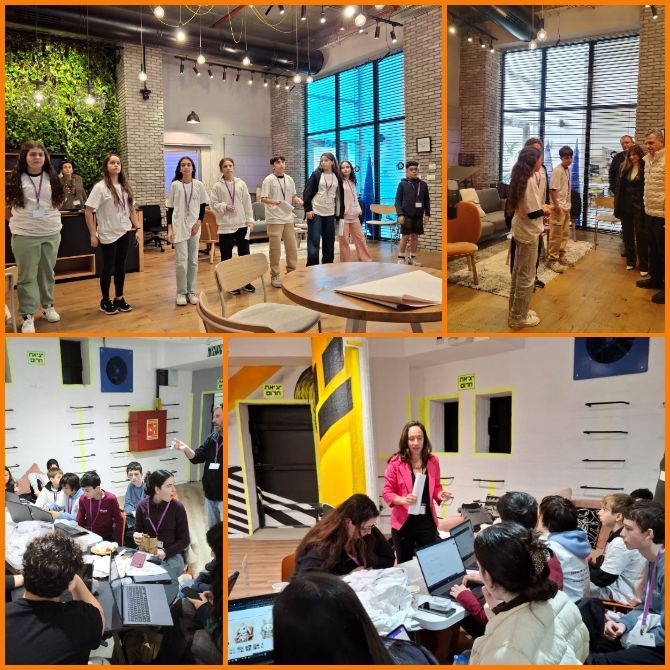
This is the fourth time the Vickathon team has led a municipal hackathon, in collaboration with Sarrai Hezi and Liza Melnik from Ramat Gan's Education Department.
This time, the hackathon focused on developing the classroom of the future, incorporating artificial intelligence applications.
The hackathon included 13 mixed teams of elementary and high school students in grades 7 and 10.
Experienced mentors guided the teams throughout the day helping them formulate and develop their ideas.
The hackathon was held again this year in a hybrid format at the city's PISGA Center.
The teams presented their pitches to a distinguished panel of judges.
The three winning teams will visit the Education Department, and the municipality will select one of their ideas for implementation.
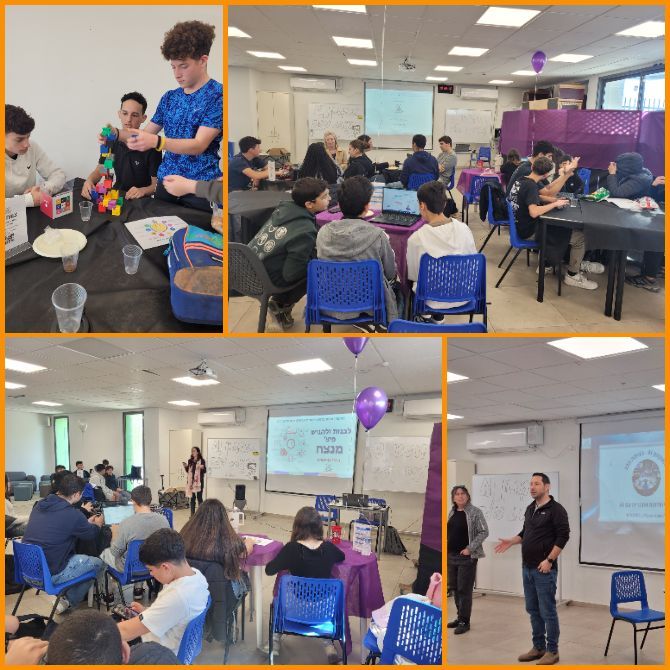
Mia Moyal, a teacher at Neimat Halev Six-Year High School in Harish, participated and even served as a judge in a hackathon we previously conducted at Givat Shmuel High School.
This year, Mia recommended that the school principal, Amitai Rods, and the middle school principal, Avigail Pasnatin, hold a hackathon focused on artificial intelligence, allowing students to develop technological solutions and submit them to the Artificial Intelligence Championship led by the Ministry of Education.
The school allowed any student who wanted to compete in the championship to participate in the hackathon.
Eventually, 11 teams participated in the hackathon.
They utilized AI tools to identify problems in education, the environment, emergency response, and social-emotional domains, and developed AI-based solutions for these areas.
In this hackathon, like in the Hagimnasiya Harealit hackathon, one team was selected for the Artificial Intelligence Championship out of 30 teams in each district.
In fact, this is an amazing achievement of 100% success.
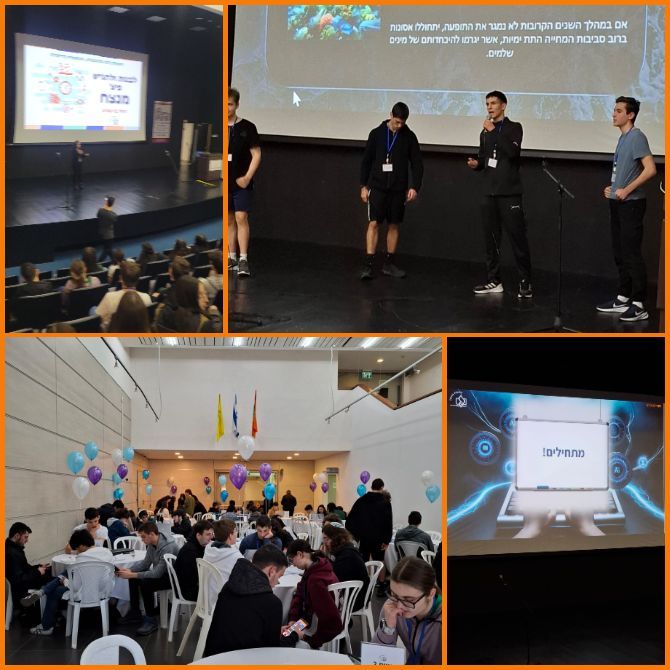
This is the fourth time Hagimnasiya Harealit has applied the Vickathon team to lead a hackathon for its students.
This time, as part of the Ministry of Education's month-long activities, the hackathon served as the students' entry ticket to the National Artificial Intelligence Championship.
Students from selected classes developed solutions for challenges in education, environment, emergency response, and social-emotional domains.
Experienced mentors guided the students, and at the end of the day, three winning teams were selected based on the rankings of professional judges.
During the hackathon, students also prepared a pitch of up to 1,000 characters, as required for submission to the AI Championship, which they subsequently submitted.
The event's success: Out of approximately 3,500 submissions from all schools across Israel, only 30 ideas were approved in each district. One of them was from a team that participated in Hagimnasiya Harealit's hackathon.
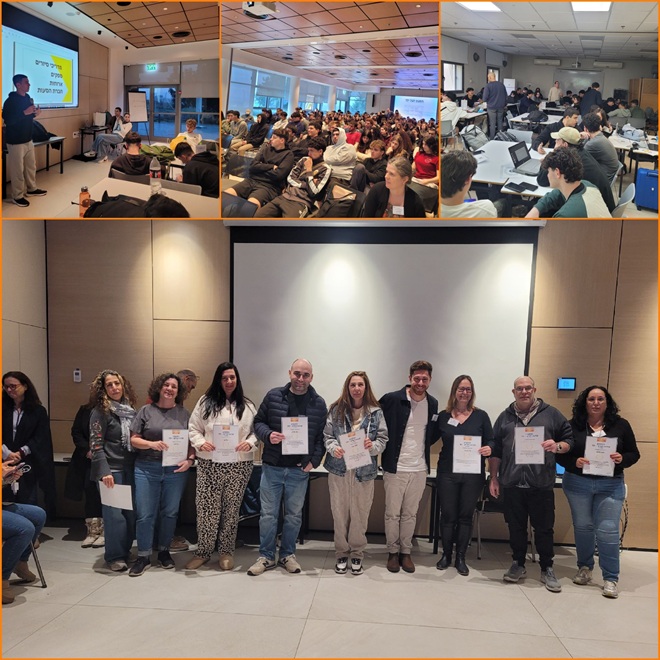
Begin High School, under the leadership of Orly Gery, is a growing high school in Ramat Gan.
Eleventh-grade students who will advance to twelfth grade next year participated in a full-day hackathon, planned in collaboration with Moran Gan, who is responsible for the school's Mechina.
During the hackathon, students planned 11 leadership days that will be integrated into the school's Mechina starting from the next academic year.
More than 40 student teams planned in detail how they envisioned their peak days, which they would lead and implement with the help of their mentors.
It was essential for the school that the students plan and lead the Mechina's peak days so that they feel significant, proactive, and motivated to lead these days.
Here are 3 of the 11 leadership days that were chosen:
✓ Visiting wounded soldiers in the rehabilitation department of the hospital
✓ Volunteering to clean up areas with waste and turning it into art that is donated to a school or community center as a workshop.
✓ Visiting a community in the Gaza envelope, meeting with people who experienced the events of October 7, 2023, up close, and volunteering with farmers in the area.
At the end of the event, Moran Gan wrote:
"It was an exciting hackathon event that showcased the enormous strength of our youth.
I really enjoyed working with you. The willingness to help with everything and the positive energy throughout the day helped us all create an optimal educational experience.
A big thank you to Galit Zamler for the professionalism, planning, and execution. I was fortunate to work with you!"
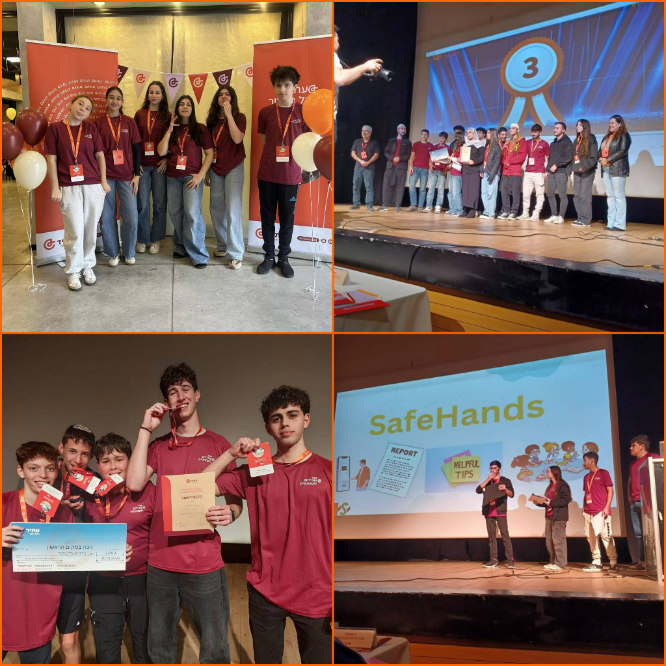
9 schools and 15 student teams with great motivation participated in the Atid Education Network Hackathon.
The hackathon was preceded by a series of 4 meetings with Galit Zamler, where we learned how to identify problems/needs, how to think about solutions, how to develop an idea into a project, and about useful tools in a hackathon. The hackathon challenge was to develop technological and creative solutions to the challenges faced by evacuees. We held the hackathon in a place that resonates well with the topic - Shefayim Hotel, which has hosted many evacuees.
The students attended a lecture by evacuee Ronit Efragan, read and researched, interviewed, and met with evacuees, learning about their needs.
Accordingly, they developed precise responses to the challenges they identified.
Mentors accompanied the teams, some Unistrim alums and some industry experts in their fields.
Each team prepared a two-and-a-half-minute pitch and an accompanying presentation.
A distinguished panel of judges heard the ideas, ranked them using a Vickathon system, and provided feedback to each team. Each participant voted for three ideas, and thus, at the end of the hackathon, we announced the winners according to the judges' ranking and the audience's favorite.
What did we have there? Ideas for new employment opportunities, community initiatives that warm the heart, innovative ways to provide emotional support, and even fundraising. The first place went to the "Step Forward" team from the Future Karamim School in Binyamina, with an app that changes the game's rules (literally!). It's a competitive local game app that allows evacuees to connect to new communities in a fun and innovative way. It's not just a game - it's a way to break the ice, build connections, and restore a sense of belonging, all with accessible and simple technology.
The Atid Network summarized the hackathon as follows: "Thank you to all these champion participants! Your ideas are not just inspiration - they are milestones towards a better future."
This is a summary video of the hackathon event 'Creating Future - Strengthening the Evacuees':
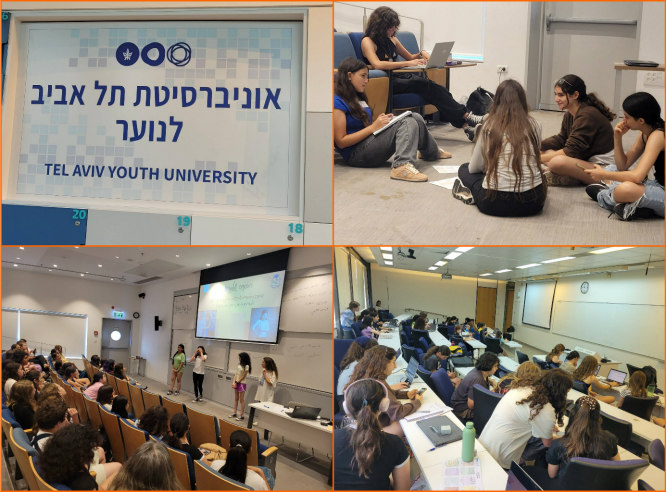
Tel-Aviv Youth University held a summer camp for 50 outstanding female science students.
As part of the camp, the students participated in a three-day hackathon aimed at making our world a better place.
Leading a hackathon on such a significant topic with talented students was an uplifting experience that instilled hope for a promising future.
Ten student teams were formed, each selecting a topic they believed needed improvement.
The students devised various solutions, examined them, and focused on one solution, which they developed as full-fledged entrepreneurs.
The hackathon combined learning and applying entrepreneurship content with workshops on artificial intelligence tools, which were used in the development and presentation process.
The hackathon included a fascinating visit to Check Point's Cyber Center, where the students were exposed to and learned about the challenges currently facing the cyber world.
At the end of the event, all teams presented their ideas, and three teams were chosen as audience favorites.
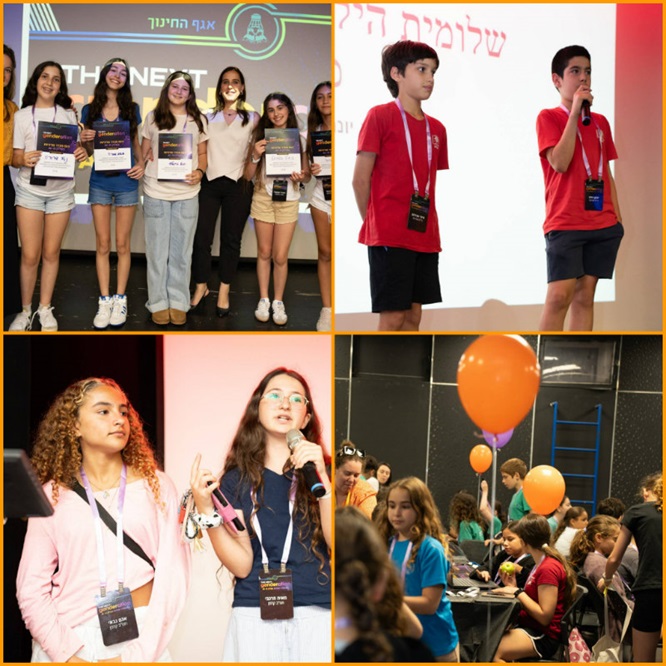
Under the leadership of Shlomit Shpigelblat, the Education Department organized a hackathon for all schools in Ramat HaSharon.
Dr. Adva Berkovitch, who oversees gender and sexuality education in the city's education system, led the event.
The conference, titled "The Next Genderation" was attended by 13 schools (elementary, middle, and high schools) from across the city.
A total of 28 teams, comprising students and school representatives, participated in the event.
During the conference, the teams explored, experimented with, and created innovative products using artificial intelligence tools.
The teams were accompanied by mentors who greatly enjoyed the innovative event.
Elementary school students created stories dealing with gender equality and illustrated them in a presentation.
Middle and high school students presented video clips they created using avatars to guide teenagers on healthy sexuality.
The conference was an opportunity for all participants to demonstrate innovation, creativity, teamwork, critical thinking, independent learning skills, coping with new tools, problem-solving, meeting deadlines, and presenting in front of an audience.
This is a summary clip from the event
What they said about the event
Dr. Adva Berkovitch, event leader:
"It was a wonderful event! Led with great professionalism and flexibility!"
Hila Ankvitz, hackathon mentor:
"It exceeded expectations. It was obvious that a lot of preparatory work was invested so that everything would run smoothly as it did."
Shiri Michalovitz, hackathon mentor:
"It was lovely, impressive, and professionally organized. I enjoyed looking at this topic from a fresh angle :) Thank you!"
Michal Rabau, hackathon mentor:
"It was a wonderful event, innovative, up-to-date, and well-organized. The food, the students, and the products were amazing. I enjoyed it very much."
A presentation summarizing the outcomes of the teams at the event:
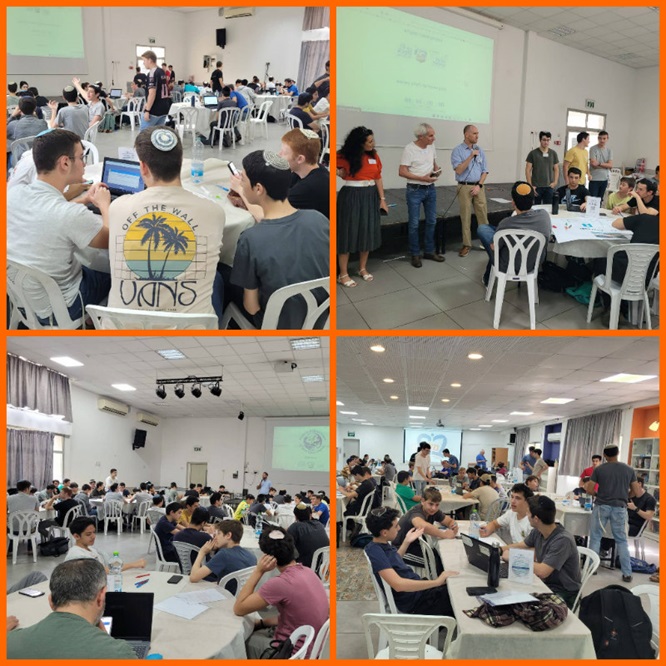
For the second consecutive year, the Bnei Akiva Yeshiva High School in Giv'at Shmuel hosted a hackathon for 10th-grade students focused on the climate crisis.
The hackathon is the culmination of an annual learning process and is included as an alternative assessment in the report card grade.
The hackathon is an initiative of Yael Ariel, the yeshiva's deputy principal, and Talia Zinger, the science coordinator.
Twenty-four teams of students developed scientific and technological solutions for addressing the climate crisis.
Teams were graded according to pre-determined criteria by nine judges who listened to their pitches. Then we announced the winning teams.
Eran Kirdon, who was a mentor at the hackathon, wrote on his LinkedIn page:
"Happy and proud to say that one of the groups I mentored was the first place winner (!!!).
Their idea was a turbine for generating electricity powered by wave power offshore.
The technology already exists, but they provided a specific solution that improves and streamlines its operation.
These guys are genuinely among the best I've met, and I predict great things for them.
It is highly recommended to experience it at least once. This gives me more love and hope for this generation. You're all truly wonderful."
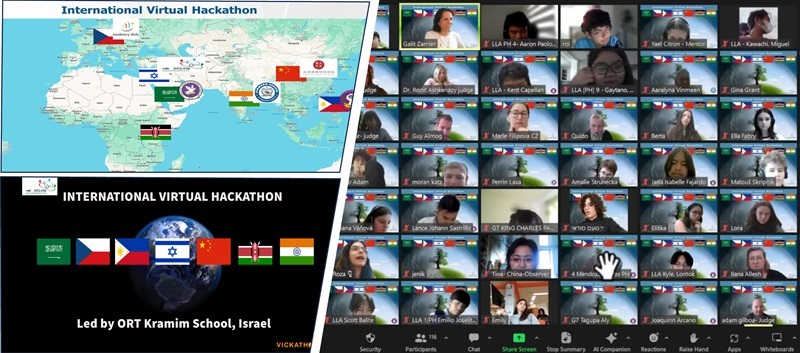
Kramim High School hosted its second annual international hackathon, partnering with the Vickathon team. Using energy efficiency as a solution to the climate crisis was the theme of this year's hackathon.
The hackathon winners:
In first place and one of the audience favorites was Team #5, formed of students from Israel, the Philippines, and the Czech Republic.
Project name: BamBuild - a combination of bamboo and building - constructing buildings out of bamboo to reduce carbon emissions and use an environmentally friendly and inexpensive resource.
In second place was Team #8, which was also formed of students from Israel, the Philippines, and the Czech Republic.
Project name: Pureflow - a machine that recycles and purifies water to be drunk.
In third place and also one of the audience favorites was Team #3, formed of students from Israel, the Philippines, and Saudi Arabia.
Project name: Roads to Our Future - developing conditions and an app encouraging walking and biking within cities.
Another audience favorite was Team 11, which was formed of students from Israel, the Philippines, and China.
Project name: SUNRise Up - an app with instructional videos for making various accessories out of waste and recyclable materials.
The principal of the Philippines school, Learning Links Academy, Ms. Maria Castro, summed up the hackathon: "I really loved the experience of the international hackathon. I'm sure the students also gained a lot from it. There are many inspiring ideas here that we can all take part in and implement. I hope that at least one of the ideas here will materialize because these are amazing student ideas that should not be wasted."
The representative from the Saudi Arabian school, Ms. Alevil Macaisa, summed it up: "Thank you very much for the wonderful opportunity to participate in this event. Congratulations to all the students for demonstrating creativity, determination, and teamwork. It was challenging because of the different backgrounds each of you comes from, but you did it very successfully. The process the students went through is more important than the product itself."
The student Edwin from India summed up the hackathon: "This was my first time participating in a Vickathon. It was a meaningful experience for me. Everyone was kind, and the communication was pleasant. I feel proud to have worked with students from around the world. Thank you for the opportunity."
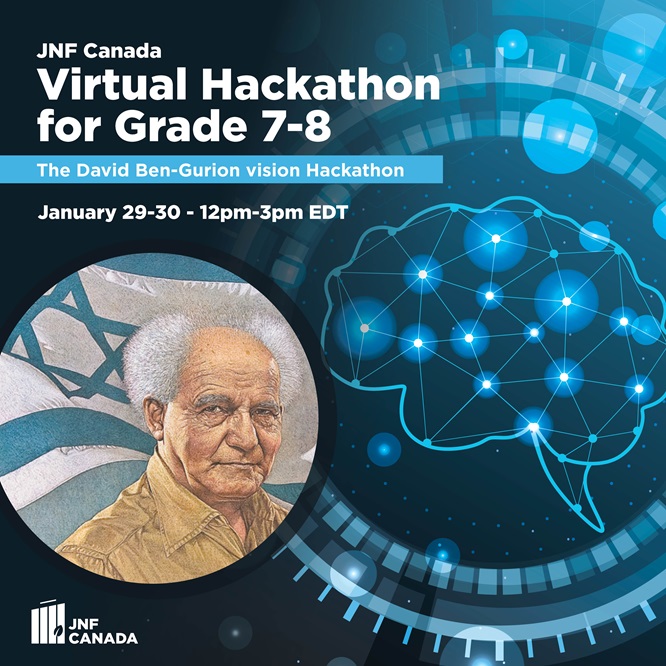
For the third consecutive year, JNF Canada leads a virtual hackathon in collaboration with the Vickathon team.
The hackathon theme this year was promoting David Ben-Gurion's values through projects and initiatives.
A total of twelve student teams from seven different schools participated in the hackathon. Students were exposed to the values associated with David Ben-Gurion in preparation for the hackathon.
As part of the hackathon, the students developed projects and initiatives that could be implemented in the community based on those values.
Israeli mentors, mainly from the Ben-Gurion Heritage Institute, accompanied the teams.
This hackathon demonstrated that through an innovative experience, it is possible to connect the younger generation to heritage.
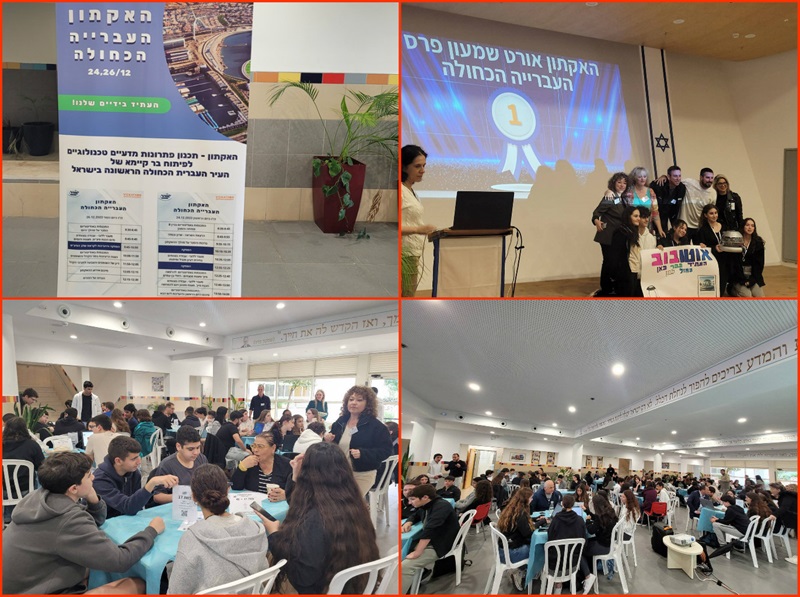
The Shimon Peres Ort High School in Yokneam led a hackathon to find scientific-technological solutions to the needs of developing the first blue city in Israel's territorial waters. The hackathon lasted three days, during which the teams identified needs, thought of solutions, and developed them. This was done under the guidance of mentors from the community and the school's staff. On the third day, 19 teams presented their ideas to a panel of esteemed judges.
Dr. Dina Falikovich, the school's chemistry and science coordinator, initiated the hackathon. It had the full support of Chen Lavi, head of the middle school division, and Ada Aberkohen Shemesh, head of the six-year high school.
On the school's Facebook page, they wrote:
"An exceptional hackathon occurred at Shimon Peres Ort School. Students studying advanced science and technology from 10th grade participated in 3 days of research-based learning to establish the first "Hebrew Blue City" on the water in the territorial waters of Israel State.
As part of these days, the students were divided into work groups. A mentor joined each group, some parents volunteered as mentors, and some staff members from advanced programs. For three days, the students researched and learned how to design scientific and technological solutions for the sustainable development of the first blue Hebrew city in the territorial waters of the State of Israel.
The school principal, Ada Aberkohen Shemesh, noted that the students, parents, and staff learned, enjoyed themselves, and enriched their knowledge of the topic.
Thanks to Talia Kern, the school supervisor, Nurit, the sciences supervisor, and Mira, the guide. They served as judges to select the projects the students conceived, initiated, and developed.
Huge thanks to teacher Dr. Dina Falikovich, science and chemistry coordinator at the school, to Chen Lavi, head of the middle school division, to Rina Efron, deputy principal, to Chen Gozlan, gifted students coordinator and counselors, to Nurit Shhori Ben Basat, to Inbal Shosho, Future Ready coordinator, to Roi Gozlan, to the school staff and Vickathon company for leading the future scientific and technological leaders.
This day joined other peak days and innovative and meaningful learning within the Future Ready and AI frameworks. This way of life was introduced to our school by ORT Israel and the Ministry of Education."
At the end of the event, Dr. Dina Falikovich presented Galit Zamler with this certificate of appreciation:
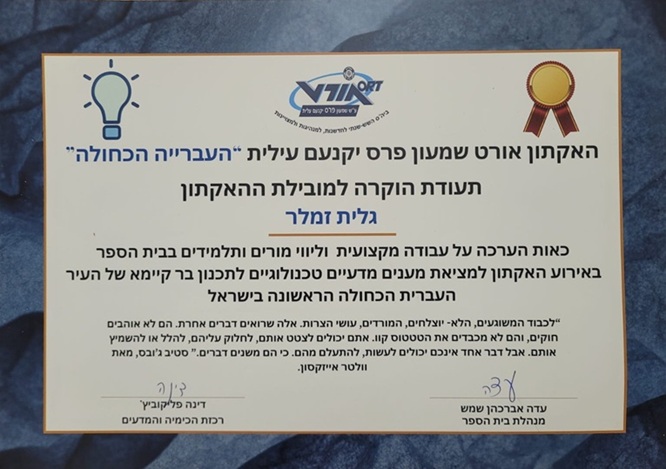
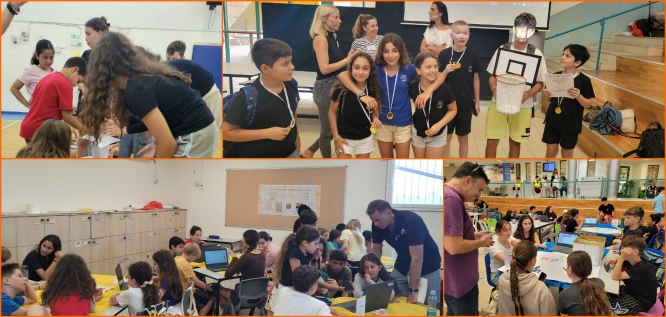
Under the leadership of Mor Tirosh, the 5th-grade students at Brandis School in Herzliya gathered for two days of hackathons to solve the hygiene problem in the school's toilets. The event, which fosters a culture of entrepreneurship and innovation in schools, was conducted in collaboration with the municipal health department, the parents' leadership, and Smadar Middle School.
23 teams were formed, accompanied by Samdar Middle School student mentors and parent volunteers. The students devised creative solutions to address the challenges presented by the topic. Each team focused on developing one solution.
Several judges evaluated each team's ideas at the end of the event and assigned scores.
Each of the top three ideas will be presented to the Herzliya Municipality CEO for implementation in all schools.
It was an excellent collaboration between the two schools that empowered the student mentors from the middle school and served as an inspiring model for the young students from the Brandis school.
As we conclude, Brandis School will bring the good news of improved education and health to Herzliya by choosing clean, choosing healthy.
Hackathon comments:
"I must say that today was incredible! The event was well planned, organized, and went smoothly. The children had a great deal of fun and learned a lot. Thanks!"
"This was a great experience for me, and I enjoyed working with my team."
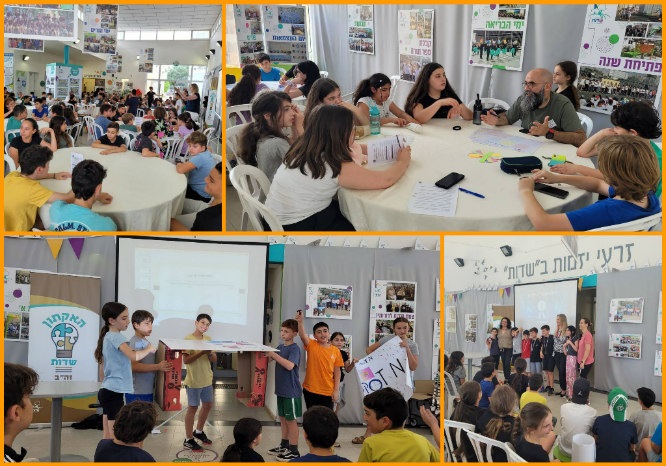
When the Sadot School was first opened, a relationship with the principal, Talmor Klos, began. A variety of programs have been implemented since then to promote entrepreneurship and innovation education at the school.
For the second consecutive year, the school is hosting a hackathon for 5th- and 6th-grade students. Students came up with ideas for the "school of the future."
The students worked in teams during these two intensive days. On the first day, mentors guided them, while on the second day, they worked independently to develop their ideas. Among all the creative concepts presented, three ideas were selected for further refinement and implementation.
The three winning ideas:
The first place goes to Byo School, which offers a semester schedule of study hours that the student personally manages.
The second-place award goes to Connected, an application that provides support and resources so that no child feels alone in the classroom.
The third-place winner was Realistic Learning, a novel learning method that incorporates workshops, games, and experiential learning outside the classroom.
The school staff summarized the hackathon: "Thank you very much for the hackathon. It was very successful."
In July 2023, the three winning teams presented their ideas at GIFT (an association Galit Zamler is a member of).
Watch the students' pitches in English:
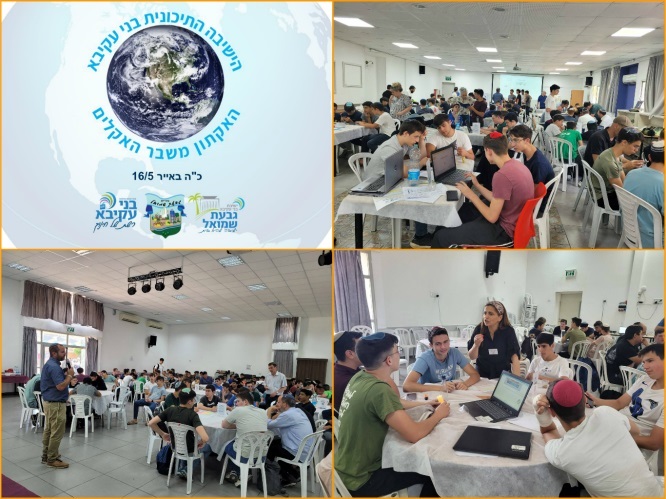
The annual science subject at Bnei Akiva Yeshiva in Givat Shmuel was "The Climate Crisis."
The high school chose to hold a hackathon on this topic for 10th-grade students as a means of experiential and innovative learning.
About 180 students worked a whole day in teams to develop scientific and technological solutions to solve the problem of the climate crisis.
Mentors accompanied the teams, and the solutions were developed according to an indicator presented to the students in stages in the Vickathon system.
Yael Ariel, the deputy director, conceived the idea for the hackathon.
The hackathon was an outstanding success, and the students also surprised Talia Zinger, the science coordinator at the school, with their creativity. She told them at the end of the event:
"I wasn't sure about running this event. Because I thought you wouldn't have any ideas, and that the teachers would have to come up with their ideas and encourage you to work on them. But I want to tell you that I was really deceived. You had many ideas and new directions. You are a cannon. All the ideas that came up here are yours. I see scientists of the future here."
We also asked representatives of the mentors, students, and judges to share their experiences at the hackathon. Below are the main points:
The students stated:
"This day was a nice break from the routine and a fun way to learn new things. It was a great activity that promoted creative thinking, teamwork, and problem-solving."
For me, it was an important day. Everyone who invested their time and effort here discovered new things about themselves that they didn't know. For example, I learned to be creative, work on presentations, and cooperate with others. We learned to work under pressure on subjects we didn't know or were not familiar with. It was very fun, and we wish there were more events like this."
One of the mentors said:
"You asked questions, and you looked for solutions. You did it professionally. I'm glad I'm part of this process."
Ezra Shamush, judge of the hackathon:
"You are probably familiar with the following sentence:
'When the Holy One blessed be He created Adam the first man, He took him and showed him all the trees in the Garden of Eden, and He said to him: 'See My creations, how beautiful and exemplary they are. Everything I created, I created for you. Make certain that you do not ruin and destroy My world, as if you destroy it, there will be no one to mend it after you.'
We saw innovative and creative ideas that can be developed in many more ways to address the problems our society is facing.
I enjoyed it very much. Thank you."
Yaholom Bukai, judge at the hackathon:
"I was happy to hear impressive ideas, something that made me very pleased and should make you happy too, that we have a youth full of values and motivation to change the world
I met educators who genuinely enjoy teaching and take pride in their students. Also, I met a charismatic principal who inspires the younger generation and a charismatic school principal who leads the younger generation to continue productive and leadership activities."
The Winners' Prize
It was a privilege for the Bnei Akiva Yeshiva in Givat Shmuel winning team to be invited to a meeting day with ClimateLaunchpad entrepreneurs in Tel Aviv at the Italian energy company ENEL.
This visit was significant to the students, and this experience has left an indelible mark on them.
The students watched the presentations of ten startup companies participating in the accelerator during the meeting. They also presented their winning idea to the entrepreneurs, who praised them. Additionally, they attended a workshop on giving presentations and public speaking. A tour of ENEL's technological laboratories concluded the visit, inspiring the students.
The visit was made possible by Eliashiv Minrabi, the accelerator's director.
Here are some photos from the meeting:
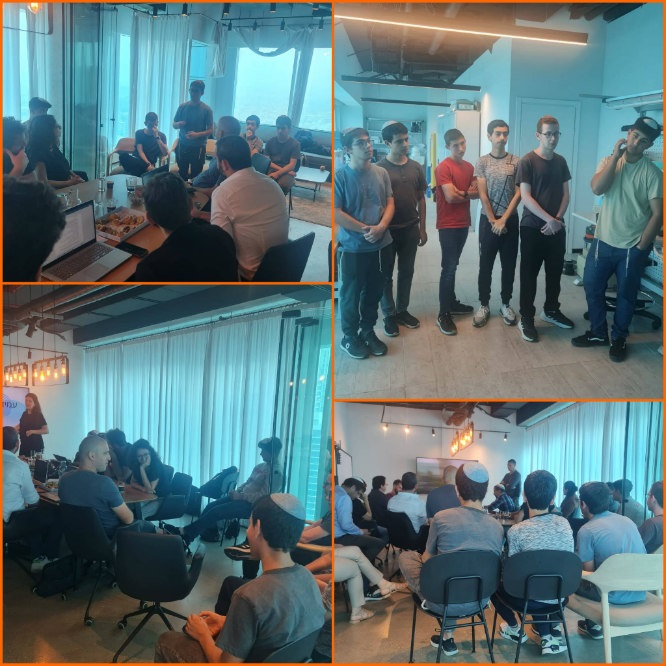
This is the third year we have led an urban hackathon for elementary and high school students in Ramat Gan.
This year's hackathon was in a hybrid format and organized by Liza Melnik and Sarrai Hezi, directors of the municipality's ICT department.
The hackathon was about sustainability and Ramat Gan's 100th anniversary.
There were approximately 220 participants, comprising mixed teams of students from primary and secondary schools, teachers, students from the software engineering department at Shankar College, and mentors who developed technological solutions to improve the environment.
The teams worked from morning to evening and presented their projects to a panel of judges representing various disciplines at the end of the day.
Students from Shankar College will implement the three winning projects as their final projects. Upon completion of the projects, they will receive a scholarship allocated by the municipality.
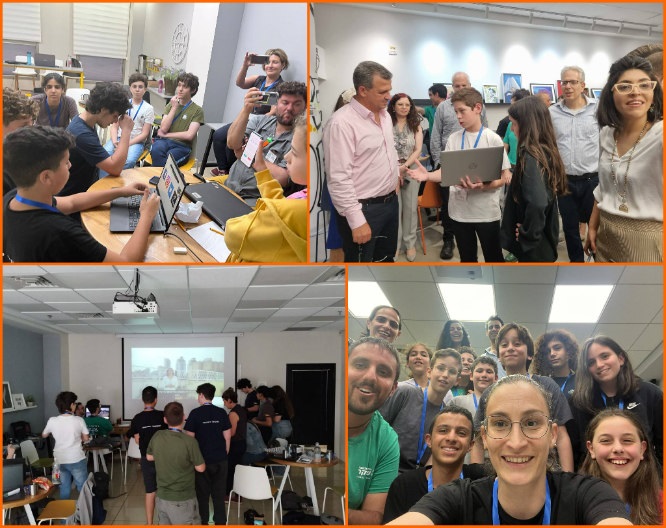
Some of the feedback we received on the hackathon is as follows:
Gil Rahav, hackathon mentor:
"Congratulations to Sarrai and Galit for organizing such a complex event in such a professional manner. Looking forward to next year."
Maor Be'eri, hackathon mentor:
"Today I participated, for the second time, in an education hackathon organized by Ramat Gan municipality. This year's competition focused on a topic I particularly care about, sustainability, but I always enjoy participating.
As I brainstorm with students, I see the joy of doing, the curiosity, and the speed with which they learn new things and become professionals in their chosen fields.
You just have to stimulate their thinking, and they will find a solution.
My group, team number 10, invented an irrigation system for buildings that collects water from air conditioners and channels it to create green roofs and hydroponic walls that cover the building. This reduces electricity and water consumption costs and lowers the temperature inside the building by up to 5 degrees.
Although we didn't win the competition, it doesn't matter at all.
Having the opportunity to learn, create, and learn in this room was a fantastic experience!
Kudos to Ramat Gan Education for producing an impressive and honorable event and to everyone behind the event.
Many thanks to Sarrai Hezi and Galit Zamler for inviting me and organizing an elaborate and fantastic event.
I was happy to participate, and hope to come next year as well."
Zevik Bar-Lev, teacher
"The children enjoyed it so much. This is an indescribable empowering event.
Collaborating between schools, graduates, and young people has priceless value.
Thank you very much for the opportunity. It's an experience the children will never forget."
Ma'ayan, teacher
"Thank you! Thank you! Thank you! It was fun. In collaboration with other schools and their students, they learned a great deal. They left very happy."
Rotem Letzer, teacher
"The students gained a lot of experience and are grateful for the opportunity to participate in the event!"
Tal Amrani, teacher
"Kudos on the professional, valuable, and sustainable hackathon.
It was meaningful learning. The children really enjoyed the day.
Thank you."
Iran Yerushalmi, principal of Alon High School
"Thank you very much for taking care of all the small details, the production, and professionalism.
Our students were excited about learning and researching throughout the day."
Osnat, teacher
"What a high-quality, professional, and challenging project.
The children had a lot of fun, and so did the accompanying teacher."
Baruch Maman, teacher
"Kodus to all the organizers for thinking about every detail.
It was charming and fantastic management of a successful hackathon."
Eitan Kleinman, judge
"Participating in the Ramat Gan hackathon again this year was a pleasure.
Everyone involved in the hybrid, multi-age hackathon invests their time and energy into it.
Well done Sarrai Hezi, Galit Zamler, and all the education staff, the authority, and last but not least, the students."
Racheli Ben Amram, lecturer
"Galit Zamler, I enjoyed every moment.
Great teams and amazing ideas.
It is always a pleasure to work with you. You are a professional!"
Sarrai Hezi, the hackathon leader
"God bless you, Galit! Thank you for your support and for inventing a platform with an excellent methodology for managing online hackathons!
Thanks to Galit Zamler, producer #1! For the fact that you understand my head and flow with me to realize crazy ideas."
The municipality of Rosh Ha'ayin City in Israel partnered with us to host a hackathon for students in grades 6 and 7 from all the Hemed schools in the city.
The idea to lead the hackathon originated from Mr. Adi Avini, the mayor's deputy. The hackathon theme was "Social Embrace and Alleviating Loneliness."
The hackathon lasted a whole day, accompanied by mentors, and took place in two sessions: in the first part, the students solved the hackathon challenge in teams in the sports hall of Noam Ohel Sarah School. The second part took place in the municipal culture hall. There, the teams stood on the stage and presented their projects to a distinguished panel of judges.
Afterward, the Hemed community in the city gathered in the hall, and the winning teams were announced.
The prize for first place is accompaniment and support from the municipality in implementing the project.
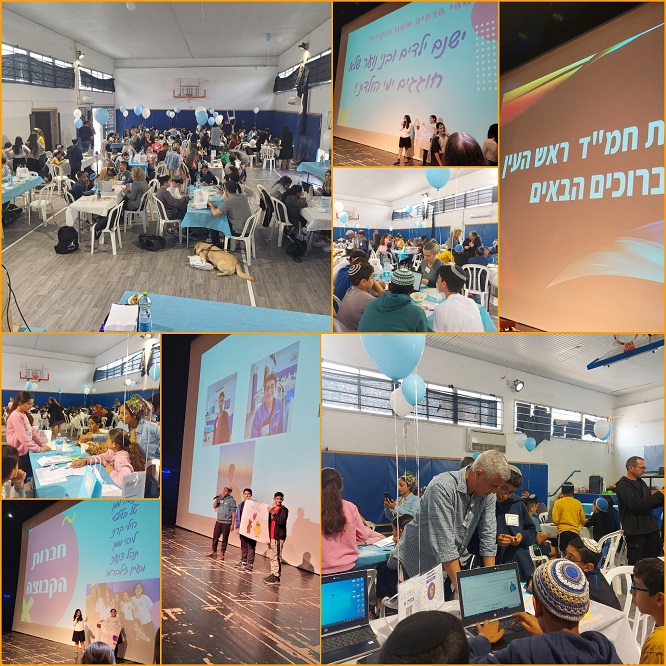
After the event, Mr. Adi Avini wrote on Facebook:
"Rosh Ha'ayin's religious education reaches high heights!
Our first hackathon in the city and in Hemed in particular was a fantastic success, with 15(!) teams participating in it."
Also, upload this video:
More comments on the hackathon:
Shira Chen, an accompanying teacher from Reut Elementary School, who won first place:
"It was a fantastic experience, first of all!
I found it to be very professional, and it inspired me to organize a mini hackathon at our school.
Thanks to the wonderful mentors who were very attentive.
It is a tremendous honor for the Reut School to win first place. With an original and exciting project called "Amitim".
Thank you very much for an empowering and meaningful learning experience! I'm sure my students will remember this for many years to come."
Michal Cohen Yaakov, hackathon mentor:
"Congratulations to all the teams and to the champions in second and honorable place - Ohel Sarah School!!!
Taking part as a mentor was a pleasure for me.
I feel great pride."
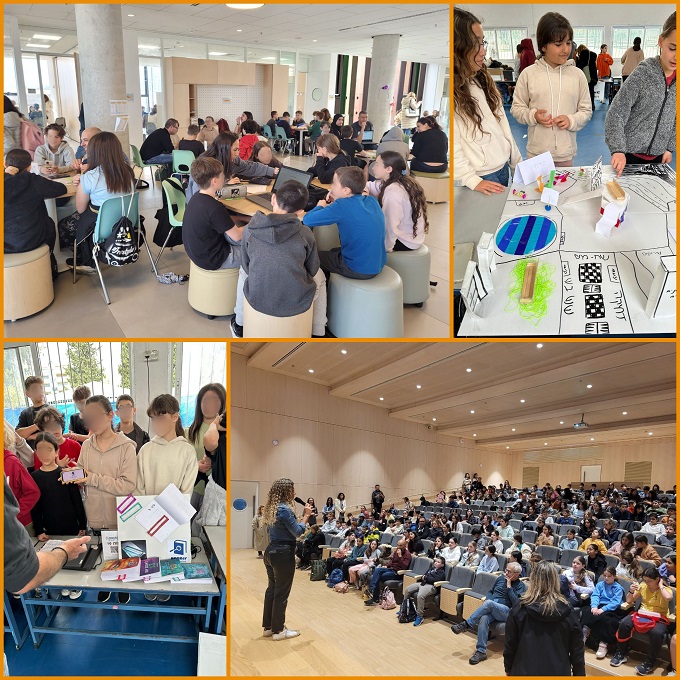
For the second consecutive year, the Yohanni School in Herzliya organized a two-day hackathon for 5th- and 6th-grade students, under the direction of Einat Ben Naim and the parents.
The first day of the hackathon took place at Naomi Shemer School in the same city. An entire floor was made available to the Yohanani school teams, as well as the auditorium.
Each team was accompanied by a parent as a mentor. The success of the hackathon is mainly due to the parents who supported and guided the students in developing the ideas for the ventures.
The students were highly creative, and although there were thirty-four teams, the ideas varied.
On the first day, the students developed ideas, and on the second day, they prepared a presentation, a model to illustrate the idea, and a pitch.
Neutral judges were invited to the hackathon. They walked among the teams, heard the students' pitches, and scored them in the Vickathon application.
At the end of the second day, the winners were announced. The prize was to present the project at an international online event hosted by GIFT, an organization to which Galit Zamler belongs.
In the photo, students of one of the winning teams are preparing to present the application they developed at the international event.
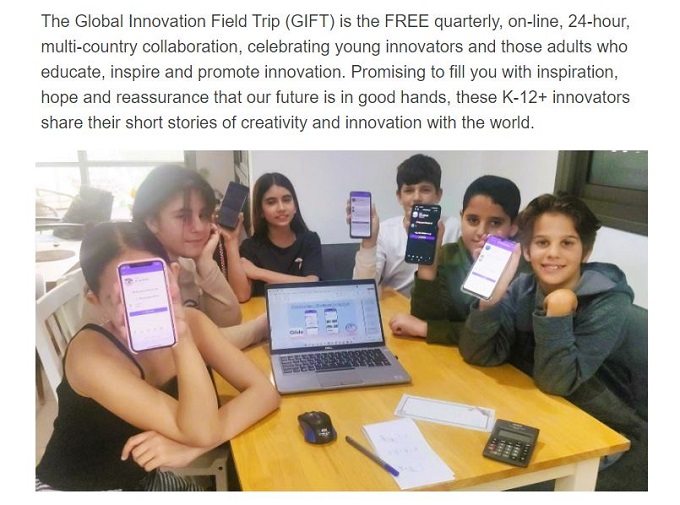
The fifth-grade students at the Weizmann School in Herzliya participated in a two-day hackathon on "Stop the violence!"
The hackathon was initiated by the municipal parents' committee, informal education in the city of Herzliya, and the municipality's education department.
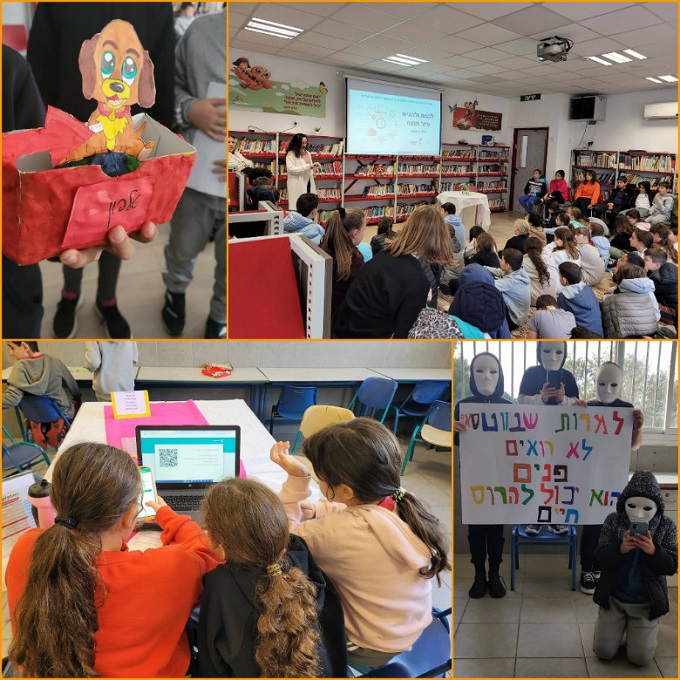
A few of the comments we received after the hackathon are listed below:
Hagit Ifergan, school principal:
"Thank you for two empowering, educational, and enriching days. The organization was exemplary, and the attitude toward the children was sensitive, warm, and empowering.
We had a lot of fun."
Tzipi Sharvit, 1st-grade teacher:
"Dear Galit,
We were pleased to meet you.
The event was meticulously planned, with all the small details carefully attended to.
Thanks to the wonderful Moran, who helped everyone, gave immediate feedback, and treated each team individually.
A very experiential event for all of us."
Avia Malka, 3rd-grade teacher:
"Thank you very much from the bottom of my heart.
The event was well planned at every level, down to the smallest detail.
The kids enjoyed it (and I must say, so did I).
It was a significant learning experience, and everyone participated.
Thank you."
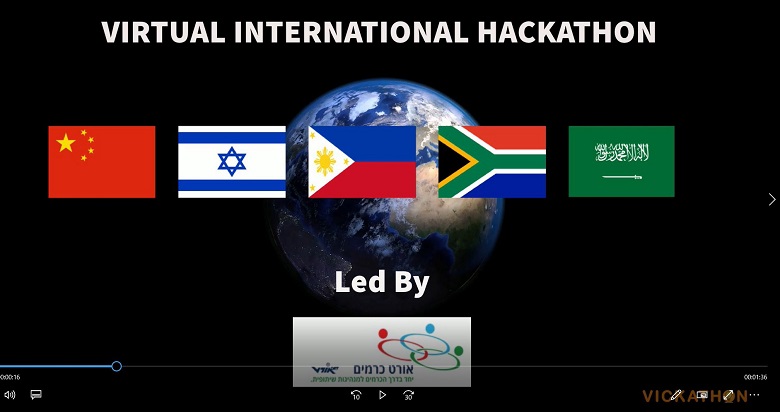
For a week, 14 teams of students from Israel, China, South Africa, the Philippines, and Saudi Arabia participated in an online international hackathon on the topic "What will schools be like in the future?"
The students worked in mixed teams, so in each team, there were students from Ort Kramim High School in Karmiel and two other countries.
A meeting before the hackathon allowed the students to learn about the differences between the cultures and collaborate during the event.
Each team shared the challenges, difficulties, and needs they currently face in the education system, and together they developed solutions.
All teams presented their ideas to an international panel of judges, who ranked the ideas. Finally, the winning teams were selected to present their pitch at a global online event.
Mr. Andrew, from South Africa, was greatly excited to see that his four students had won the hackathon because they were part of the winning teams.
Here is a summary of the hackathon from the various participants:
According to Sarit Segev, a judge at the hackathon:
"On the evening before judging, I read into the night fourteen business plans, which were sent to me as soon as the teams finished writing them, to get to know the ventures and prepare for the judging. Upon reading them carefully, I was amazed to see that this age group experiences the same needs around the world.
Their problems and issues are similar. Their dream is to work together to make a positive impact on the world."
According to Guy Almog, who promoted the activity in China:
"The hackathon was very successful and was an excellent experience for everyone. A big thank you, of course, to Galit for the special project that enables children from all over the world to participate and collaborate in establishing joint ventures. Let's hope that with the decline of COVID-19 in China, we will all have more exciting opportunities in the near future."
Mr. Andrew Mogole from South Africa wrote on LinkedIn:
"It was an exhilarating experience for all the learners. They were proud of their achievements. Our learners from SA and their counterparts from the Philippines and Israel were overwhelmed with joy for winning the Hackathon. The young innovators from this year's Hackathon have a great future ahead. Their ideas are easily bankable.
Thanks, Galit, for allowing these great young minds to be part of such an exposure. We must believe in our kids."
This video is from the last meeting, where we concluded the hackathon event:
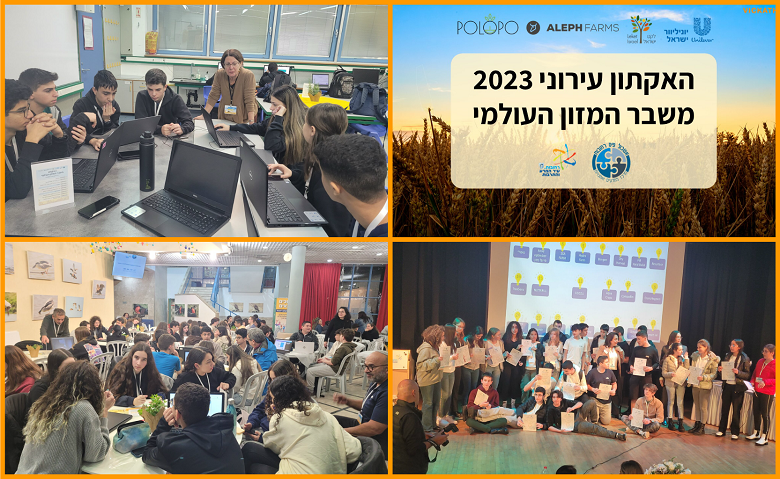
Eshkol Pais in Rehovot, under the management of Irit Davidovitz, led an urban hackathon for 9th graders from six schools on the topic of the global food crisis.
The hackathon, which lasted two days, was very successful thanks to the cooperation with the Faculty of Agriculture, startups, and leading companies in the food sector.
Mia Sapir Mir, entrepreneur and hackathon mentor, summed up the event as follows:
"Well done to all the teams!
We met intelligent, curious, and highly motivated children.
And all the best to the organization. The hackathon production is awe-inspiring! Children received tools that we would only receive in advanced degrees."
Ari Yolles, Product developer and a mentor at the hackathon, wrote on LinkedIn:
"Together, we provided guidance and support to the students as they worked to develop their ideas and presentations. It was a fantastic experience to collaborate with my colleagues and see the positive impact we had on the students.
The students were enthusiastic and full of energy, and their passion for finding solutions was evident. They worked in teams to develop their solutions and present their ideas to a panel of judges. The creativity and out-of-the-box thinking displayed by the students was truly impressive.
It was a refreshing experience to participate in the hackathon and guide these students on their journey. The future is bright with these young minds working towards finding solutions to the global food crisis.
I am proud to have been part of this initiative and to have contributed to the development of the next generation of leaders and problem solvers. The experience was truly rewarding, and I can't wait to see how these young minds continue to make a positive impact on the world."
This is the second year that JNF Canada has led with us an online hackathon event for students from Jewish schools in Canada.
This year, we combined nature with accessibility, and that's how the hackathon got the name "Accessibility is part of our nature."
Nineteen teams of students in grades 7-8 from seven Jewish schools participated in the hackathon.
The students gained an understanding of the unique needs of people with disabilities by dealing with people with disabilities in a natural setting.
The judges' panel included people intimately familiar with the need for accessibility. They ranked the projects accordingly.
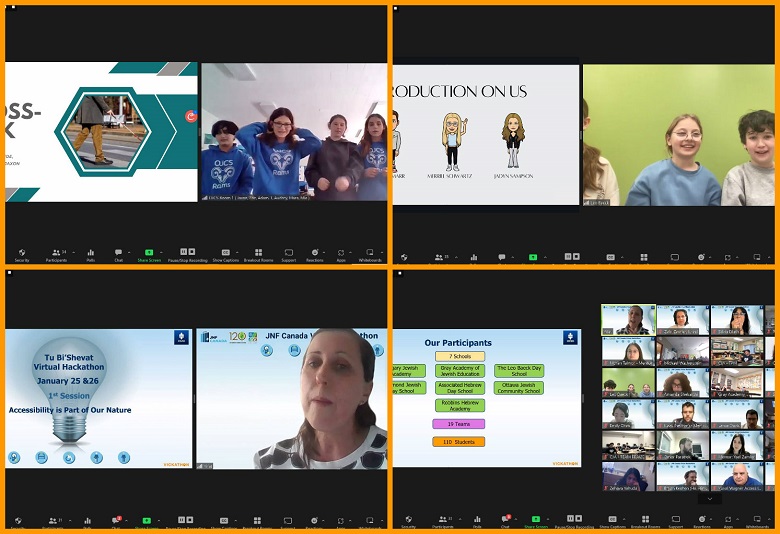
At the end of the event, Sylvia from the hackathon leaders wrote:
"Thank you very much, Galit,
Thanks for everything. The hackathon was very successful."
Yehuda Friedman, CEO of Beit Galgalim. A judge at the hackathon:
"It was really touching to see how much you guys think of people with disabilities and how your generation will do whatever it can to make people's lives better. Having finished this hackathon, I feel incredibly optimistic knowing that the wheel is now in your hands. The other judges and I trust you'll make it a better place. Thank you so much."
Students from Associated Hebrew Day School said:
"It was really fun doing a hackathon because we felt greatly involved in the disability community, and that we could help and make a difference. I appreciate how we worked together as a group."
Teacher Katya from Richmond Jewish Day School:
"I found it to be an absolutely inspiring event last year as well as this year. Hearing these crazy groups of kids come up with so many ideas in such a short amount of time, then watching their presentations, is just amazing.
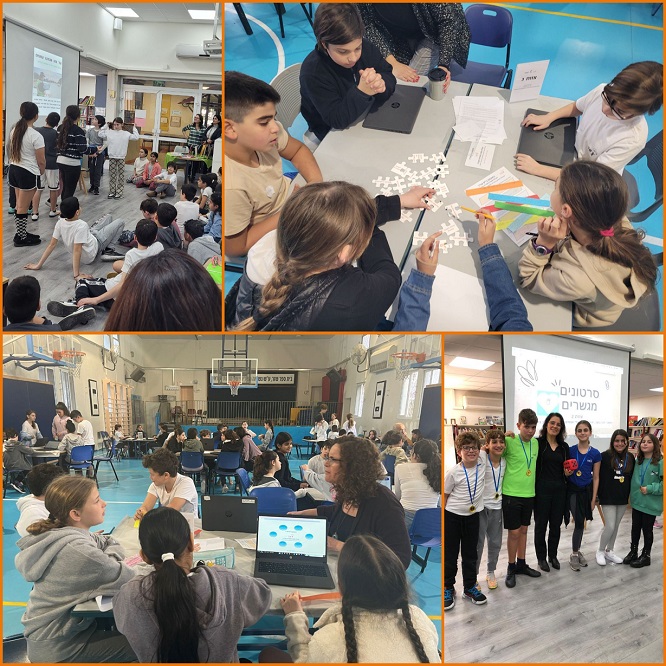
At the Shazar School in Herzliya, the Education Department, in cooperation with informal education, organized a hackathon for 5th graders.
Ms. Hadar Timor, the school's principal, recruited parents, teachers, and community members to accompany the students during the hackathon.
Over the two days, students, already intimately familiar with mediation language, worked in teams, raised challenges and needs in the field, then proposed creative solutions.
Thirteen teams prepared presentations, pitches, and models to illustrate their ideas. Then, they presented the projects to a panel of judges, who ranked all of them, and finally, the three winning teams were chosen.
This document contains a summary (in Hebrew) of the event prepared by the school.
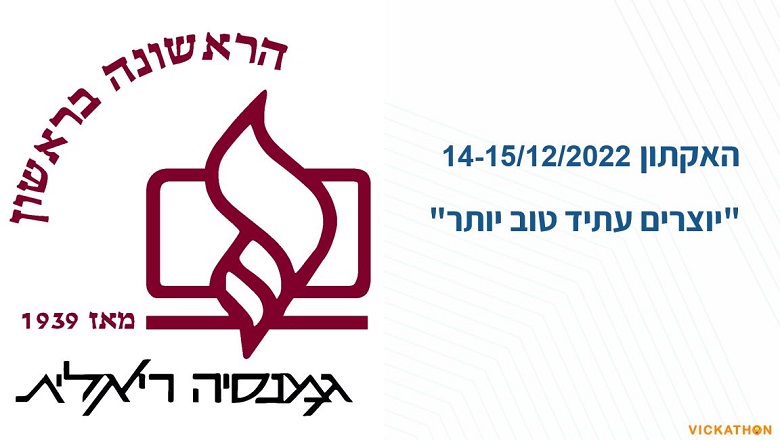
It is the third year that Hagimnasiya Harealit and the Vickathon team have conducted a hackathon for school students.
Over the past two years, due to COVID-19 constraints, hackathons have been held online and internationally. This year, we led an in-person hackathon for approximately 200 students from the 9th and 10th grades.
The hackathon lasted over two days. During the first day, 32 teams identified problems that exist today on various topics, proposed a wide range of creative solutions, and finally chose one solution that met the criteria presented to them. These were the criteria according to which the judges rated the ventures until the winners were selected.
On the second day, the teams prepared pitches, presentations, demos, and models, which they presented to the audience of participants and judges at the end of the evening. Each team received short feedback from the judges immediately after the pitch.
Mentors accompanied the teams, drawn from among parents and entrepreneurs from the first startup managed by Moti Kofito.
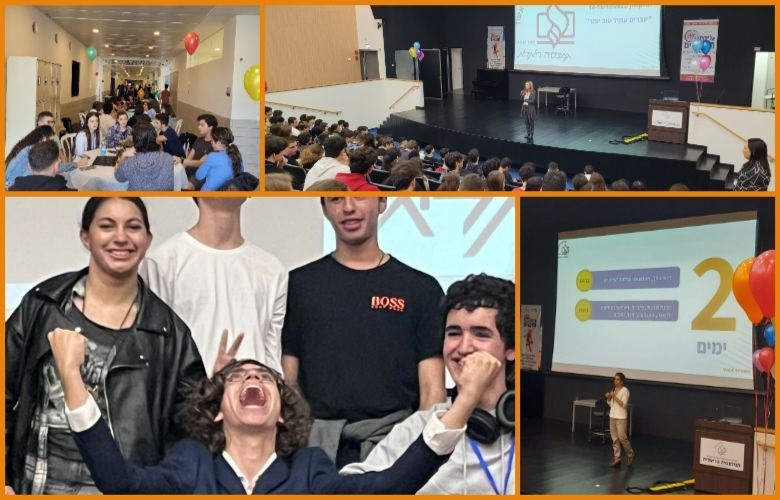
Amir Zuker, one of the judges in the hackathon, summarized the event:
"What's the best way to get inspired to move forward?
You can read a book about a fascinating character,
or watch a movie about a powerful subject,
listen to a podcast with a great interviewee,
or chat with the excellent mentor you have chosen.
Last week, I chose to be inspired
in a completely different way -
I volunteered to be part of the judging team
at the hackathon "Creating a Better Future."
at the Hagimnasiya Harealit in Rishon Lezion
organized by the hackathon champion, Galit Zamler.
Over 30(!) teams
sat, thought, and came up with ideas
to do better around us,
from learning solutions at school
through improving street and road safety
and solutions for water shortages in Africa.
It was just WOW.
I met curious girls and boys,
champions, creative, and also competitive.
So competitive that at 10:00 PM
after the event was over
they stopped me outside for another half hour
to find out why their score dropped,
and what exactly is the score determined by?
and how to promote their idea
in the real world.
So yes, I got a lot of inspiration
amazing teenagers,
and I'm just happy about the track
that I chose in life that brought me
to a place where I have a lot to offer
and I had this opportunity to give."
The Amos De Shalit School's entrepreneurship classes, for 7th, 8th, and 9th graders, participated in a joint hackathon. Teams selected their topics in advance from three categories: road safety, accessibility, and a safe lifestyle.
During an intensive day, students worked with mentors while meeting deadlines and focusing on the goal. The students identified needs in the selected topic and devised ideas to address them.
Among the ideas that were presented, the students chose the one that met the criteria, according to which the judges selected the winning teams.
In a format similar to an entrepreneur's pitch, 14 teams developed ideas and presented them to an honored panel of judges, who provided immediate feedback to each team.
The first-place winning team will present their idea at an international event of the GIFT organization.
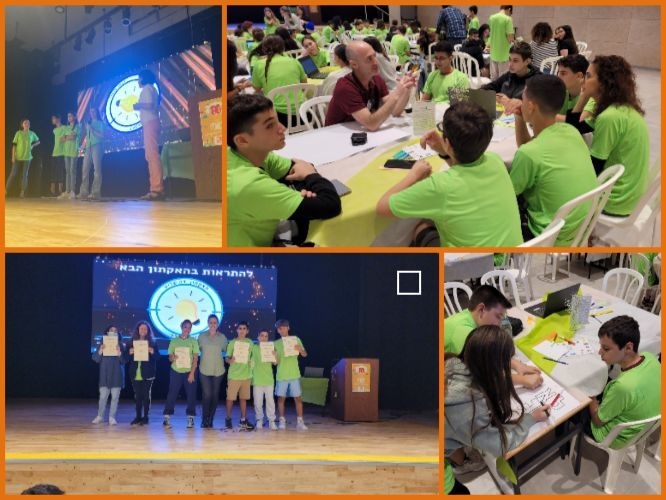
The school's entrepreneurship coordinator, Nitshia, wrote these words at the end of the hackathon:
"Galit, thank you so much for the wonderful hackathon. We all had a significant and experiential day.
I would like to thank you for investing so much and ensuring everything goes smoothly. A special thanks goes out to you for handling everything so gracefully and pleasantly.
I wish you the best of luck in the future."
Yael Dayan, who teaches entrepreneurship to students in grades 7-9, wrote:
"The planning and execution of all the little details made the day very successful.
In my opinion, everything was handled professionally and with a smile during the whole day, as stated by Nitshia.
Thank you."
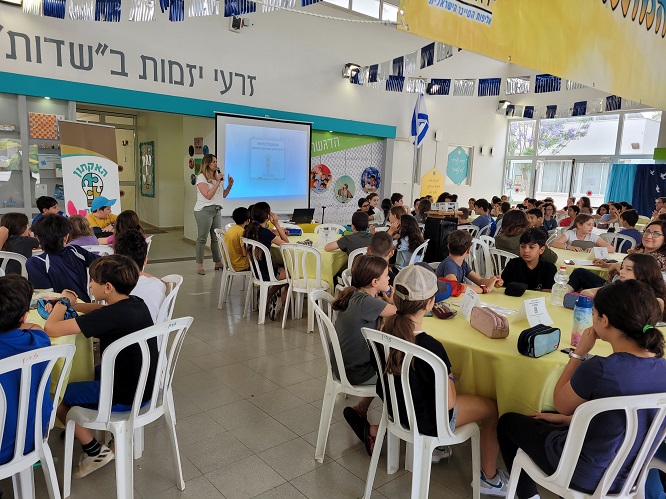
Talmor Closs, principal of Sadot School in Pardes Hanna Karkur, and Adi Saporta, the coordinator of Zahav, initiated the hackathon about road safety, accessibility, and a safe lifestyle.
About 150 fifth- and sixth-graders participated in the two-day hackathon. During the event, the students generated creative ideas for solving problems related to the hackathon's theme, then screened the ideas and focused on one leading concept they had developed.
The teams presented their projects to a respected panel of judges who ranked all of the projects, and so the three winning teams were announced:
In third place - a bonfire in augmented reality
In second place - a smart crossing
In the first place, a super stroller for the disabled
These are the models that the students prepared and presented at the pitch event:
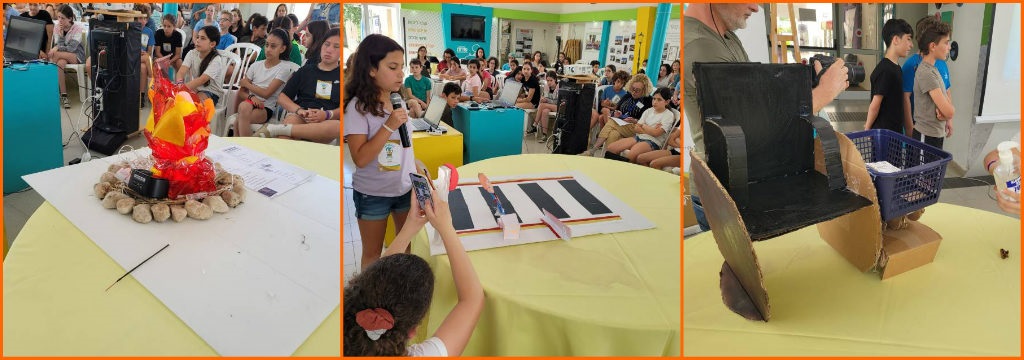
The two days full of creativity and innovation concluded as follows:
Talmor Closs, the Sadot School Principal:
"Dear Galit,
We are grateful for the efforts, thinking about every detail, and the curiosity sparked by the children at our first hackathon at school.
Your entrepreneurial mindset and actions are truly inspirational.
And always with great kindness and humility!
Thank you very much!"
Adi Saporta, Zahav coordinator at the Sadot School:
"Thank you so much for the perfect event, for your professionalism and accuracy.
I could not have dreamed of anything better."
Eyal Tal, Communications Mentor, Strategy Consultant, Crisis Management, and Public Relations, hackathon Judge:
"Thanks for inviting me to attend the hackathon.
The students' energy, creativity, and innovative ideas give me hope for the country's future.
See you at the next hackathon."
Inbal Negbi, an expert in innovation processes and technological entrepreneurship in education, mentor at the hackathon:
"I've mentored at several entrepreneurship events in my life, but I haven't sweated like that for a long time.
This morning, I participated in a hackathon on road safety, accessibility, and a safe lifestyle with sixth-graders at the Sadot School in Karkur.
The creative ideas of these champion kids blew me away!!
So what made me sweat?
- Need before solutions
- Focus, focus, focus
- Balancing between group members
Thank you, Adi Saporta, a brilliant entrepreneurial teacher, and Galit Zamler, the hackathon champion, for organizing this event.
And a big thank you to Talmor Closs for leading a vision of innovation and entrepreneurship in all subjects. I hope there will be more principals like you."
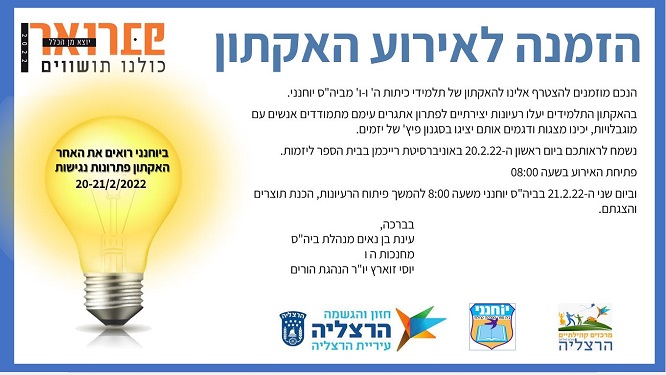
The Yohanani School in Herzliya hosted a two-day hackathon for approximately 200 fifth- and sixth-graders to find accessible solutions for people with disabilities.
Principal Einat Ben Naim accepted the initiative of the parents' committee chairman, Yossi Zoaretz, to host the event, which focused on entrepreneurship, innovation, creativity, and other essential life skills that the children demonstrated during the hackathon.
On the first day, we met at The Adelson School of Entrepreneurship at Reichman University (IDC Herzliya), where Prof. Dafna Kariv welcomed us with great energy.
The students then worked in 31 teams, each accompanied by a mentor. Most of them were the parents of students. In a tight schedule, the students developed ideas for projects to benefit people with disabilities, screened the ideas, chose the best one that met the criteria we set for them, and then developed it on Vickathon.
At the end of the first day, Rachely Ben Amram delivered a lecture on crafting a winning pitch and presentation.
The children worked on their presentations during the second day and created models to illustrate the ideas. They also practiced a 2.5-minute pitch.
All students presented their ideas to distinguished judges who heard their pitches and scored the ventures. Mayor Mr. Moshe Fadlon also honored us with his presence and was impressed by the children's creativity and products in such a short time.
We finally enjoyed eating pizza, just like at a real hackathon.
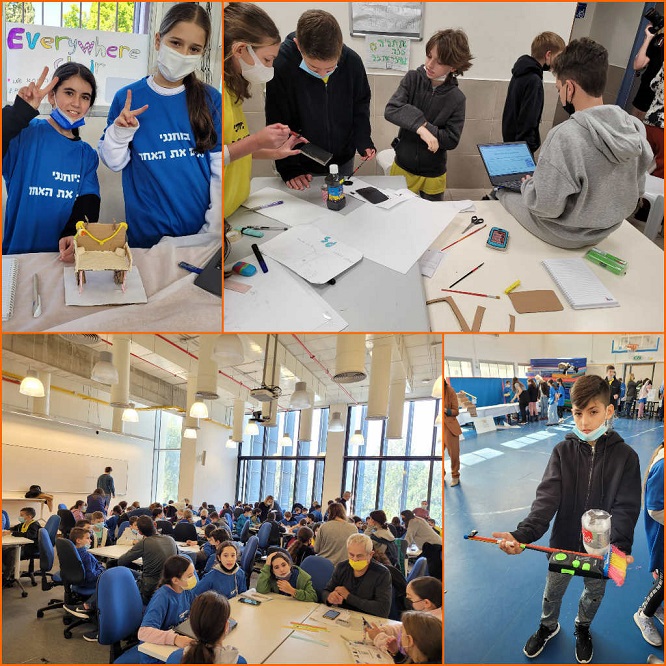
Selected Comments on the Hackathon:
School principal Ms. Einat Ben Naim: "Dear Galit, I am still in high spirits. Thank you for an engaging, teaching, encouraging, and innovative day."
Chairman of the Parents' Committee, Yossi Zoaretz: "The main feedback I got after these two days was a gift for life for the children. Thank you for helping me give them such a valuable and essential present."
Judge at the Hackathon, mother of a special child, Liat Keren: "What a brilliant idea!!!! Understanding the difficulties associated with individuals with special needs, entrepreneurship, and the importance of seeing others. It is not a slogan, but honest! Efficient experience. It's ingenious!
It took me two hours to tour the teams of fifth- and sixth-graders, who have worked hard to develop innovative products that benefit people with disabilities.
It was a pleasure to hear them and learn about their ideas. I wish more schools would adopt this event concept. And thanks to Yossi Zoaretz for conceiving it !!!"
The Ministry of Education in the Tel Aviv District wrote about the event on its Facebook page:
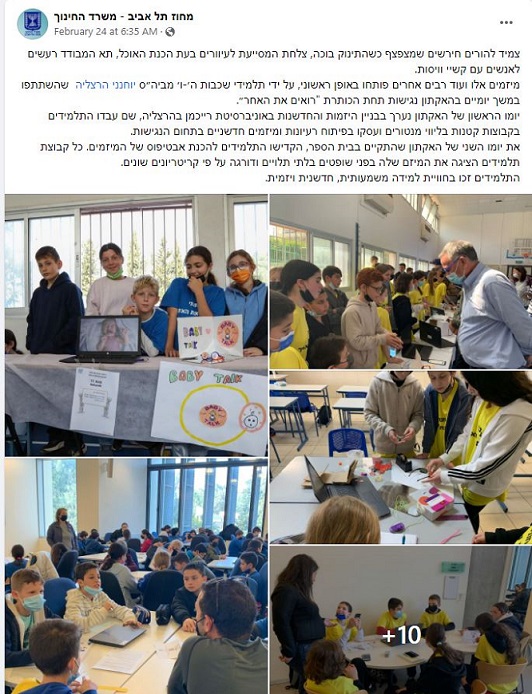
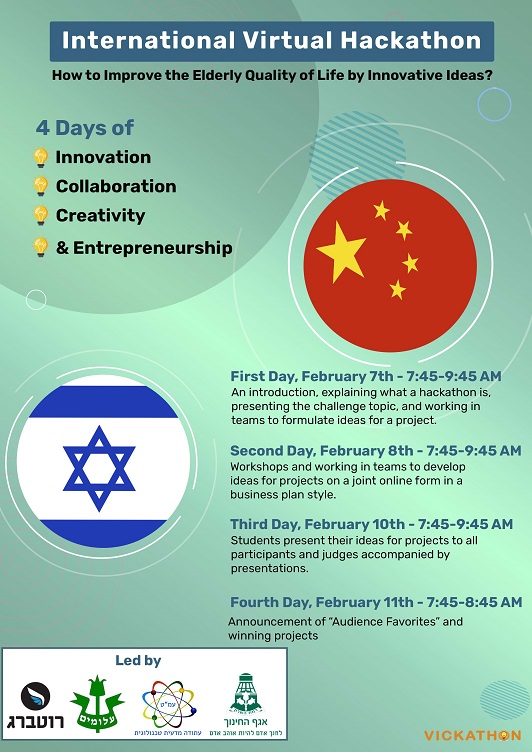
We hosted an international hackathon for students from the AMT program at Alumim Middle School and Rotberg High School in Ramat Hasharon, as well as students from China.
Ten teams developed innovative ideas to improve the quality of life for the elderly.
This is an excruciating problem in China due to the one-child policy and the transition of young people from villages to cities.
Students communicated with each other on the WeChat app, developed their ideas during the Vickathon, and worked in Zoom rooms, all while being accompanied by great mentors.
The students demonstrated the ability to work in teams, alongside creativity, effective communication in English, openness to foreign cultures, working under pressure, searching and processing information, and presenting to an audience. All of this was packed into one event that spanned five days.
Eight judges listened to the teams presenting their ideas and scored them according to defined criteria. Ultimately, we had four winning teams.
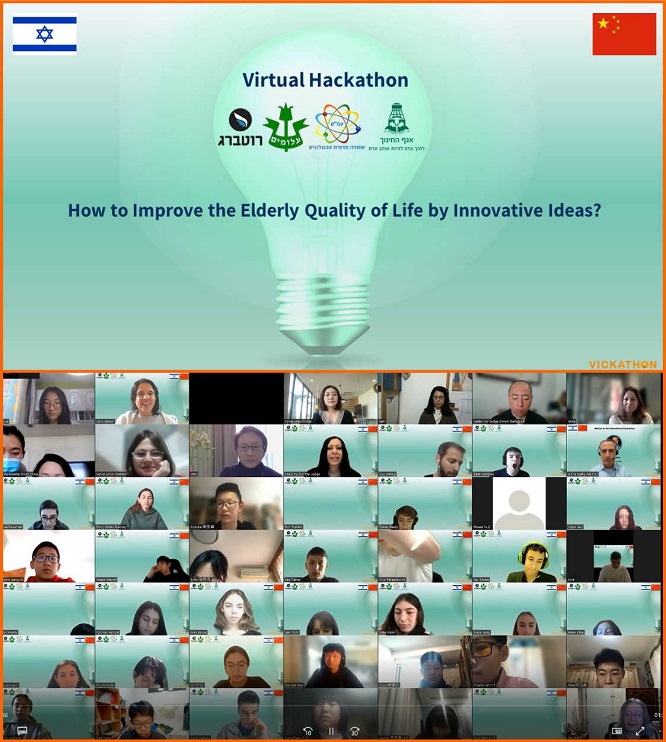
In the third place, we had two teams:
Team 9 - P.R.B. Project - A button attached to clothes with a headset that reminds seniors when to take their medication.
Team 5 - Medician Project - a wristband that serves as a virtual assistant that helps the elderly contact doctors, order medications online, make appointments for medical issues, and allows the family to be involved.
Second place won
Team 4 - A school for the elderly with a wide range of courses, which connects them with the community and helps them dispel loneliness.
In the first place
Team 1 - a tablet with a simple, understandable, and easy-to-operate design that allows seniors easy and available access to entertainment activities and company to dispel boredom using a touch screen and only three buttons.
Here is a selection of feedback on the hackathon:
Gil Marom, speaker and judge: "I was amazed by their creative ideas. They demonstrated excellent market research and highlighted real-life challenges faced by the aging population. Wonder what the future will look like for those kids."
Vered Adar, mentor: "Thank you, Galit Zamler, for the opportunity and the challenge of mentoring groups from Israel and China, working together to create a better life for the elderly population. It was an interesting, enriching, and most promising experience. It is one world we live in, and as long as we do our best to collaborate, the better life we will all have here on our planet."
Livia Liu, Chinese student: " This is my second time participating in the Hackathon, and I can say this activity changed my life... This year, I am much stronger, able to communicate with everyone confidently and fluently, and also able to provide good ideas for my group.
I hope everyone can get good memories from this experience and get some inspiration for self-expression, teamwork, and innovation, which is very precious."
Flower Fu, Chinese student: "This is my first time participating in the Hackathon, and it has let me learn a lot of knowledge. My fear was that I would say the wrong words, and they would not be able to understand me. But after a few days of discussions, I found that Israeli children are very friendly, and they help with many things in our group. Their minds are very lively and always come up with different ideas. Additionally, they excel at creating visually appealing presentations. We are working very well together.
This activity improved my spoken English and developed my overall thinking ability. I learned very important things from them, like meeting deadlines. Thanks for organizing such a good activity, we are all winners!!! Great job for all of us! But still, Group 2 is the best =)"
Yuval Nakash, Israeli student from Alumim Middle School: "Even though it was my first time participating in a hackathon, I'm glad to say it'll take me some time to forget this one...My group members were super friendly, and we really had incredible chemistry!
Generally, I could tell only by a glimpse of an eye that each person who participated put 100% effort and creativity into creating the most innovative idea that would've helped the elders a lot!
I also learned about Chinese culture and how special and diverse it is, full of surprises.
Thank you for this experience."
Orly Gutstadt, Israeli student from Rotberg High School: "This is my first time participating in a Vickathon.
I would like to start by saying that it was a great experience, and I thoroughly enjoyed working with my team and learning new things. I learned how to work better in a team and communicate and listen to each other's ideas. I learned a great deal about the elderly, and I'm glad we found a solution that can help improve their quality of life. Being part of a team made me feel more confident sharing my ideas.
Thank you for allowing me to participate in this event. I want to thank the Chinese and Israeli teachers and my teammates."
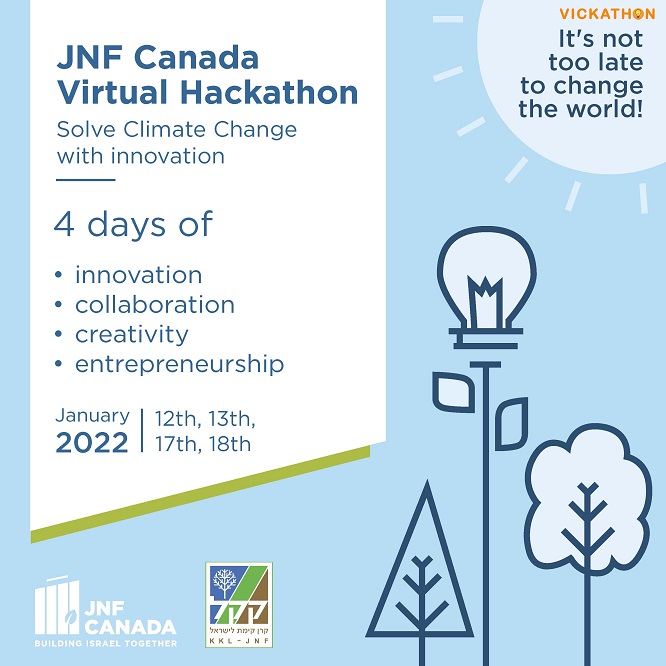
To celebrate Tu Bishvat, the JNF Canada organization hosted a virtual hackathon for Jewish schools in Canada and students from Israel.
The hackathon's challenge was "How to Slow Climate Change by Innovative Ideas?"
Approximately 130 students from various schools attended the hackathon, accompanied by mentors from Israel to foster connections between students in Canada and the State of Israel.
After teams presented their venture ideas for solving the challenge, a panel of judges scored the ideas, and four winning teams were announced.
The JNF Canada intends to continue developing the ventures of the hackathon-winning teams, thus creating a significant impact.
Summarizing the event:
Hannah Makmel, director of Jewish studies in Robin's Hebrew Academy, Canada:
"I knew this was precisely the opportunity our school was looking for. As we encourage and inspire our students to become global citizens, we're also developing and implementing action plans to tackle the real-world issues we face today.
This hackathon embedded those two important goals and has holistically integrated them with the holiday of Tu Bishvat and the very real issue of climate change.
Throughout this process, I watched our students working cooperatively to identify a goal that is close to their hearts.
I watched them put together an action plan, revisit their ideas to change and adapt, plan Zoom meetings, and overcome the challenges of Zoom. But above all, persevere and finally present.
And yesterday was a showcase of hope and a future I'm looking forward to.
I found myself frantically trying to keep up with all the inspiring presentations. I took note of every idea and original thought.
I would like to thank all the students for their hard work. Thank you to JNF Canada and the organizing committee for your dedication and your vision.
See you next year."
Galit Moyal, the Associate Hebrew School, Canada:
"I was just blown away. Everybody's presentations were impressive.
Climate change is a significant issue, and we were impressed to see that the students developed practical solutions to real-world problems.
We often discuss 21st-century learning and ensuring that students are equipped for the future. That's precisely what we saw here: students had to meet deadlines, collaborate and work together, and come up with innovative and creative ideas to solve real-world problems, which we observed throughout.
I think our students really persevered. They were amazing. It was a combination of excitement, teamwork, innovation, and creativity. It was a truly valuable real-world experience.
Thank you all."
Lance Davis, CEO, JNF Canada:
"We are so proud of all participants for your hard work and your dedication.
I'm really blown away by each and every one of you and what you bring to the table.
I would like to thank the teachers, schools, mentors, and judges.
Everyone put in so much work to ensure this went smoothly.
A special thank you to Yifat, Silvia, and Galit for your really hard work and dedication, and for going above and beyond.
This hackathon exceeded all our expectations."
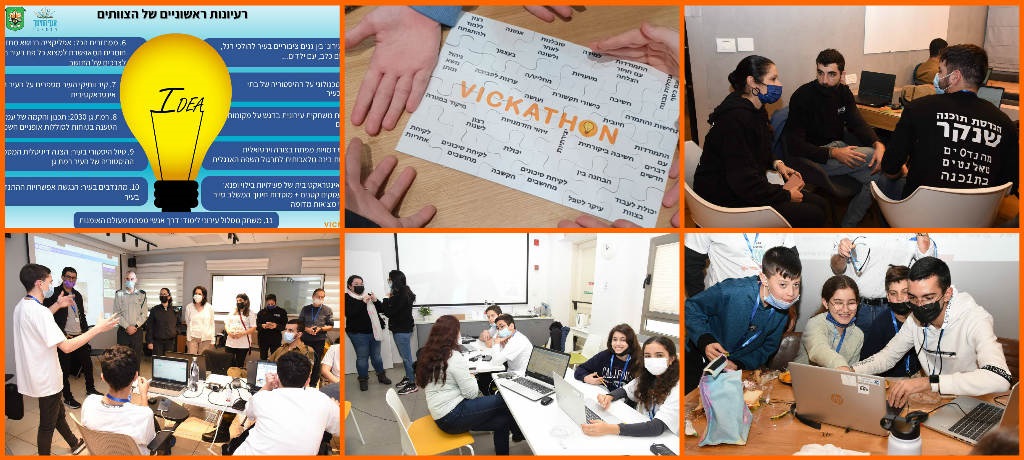
For the second consecutive year, Ramat-Gan Municipality hosted the hackathon "Stock Market of Innovation" for all schools in the city, accompanied by the Vickathon team.
The hackathon is a project of Sarrai Hezi and Liza Melnik from the education department of the municipality.
The hackathon is named after the student Barak Hurri, who participated last year and was run over on Yom Kippur.
Students and teachers from 31 schools participated in mixed teams. Additionally, the city pooled resources. Each team was joined by a soldier from the IDF School of Computer Science as well as students from the Department of Engineering and Software at Shenkar College in Ramat Gan.
Despite the challenges of COVID-19, we successfully held the hackathon in a hybrid format with experienced mentors.
Eighteen judges conducted online judging.
The hackathon was held to celebrate Ramat Gan's 100th anniversary. The participants were asked to illustrate the city's story from different angles using digital illustrations.
As their final project at Shenkar, the students will implement the projects of the three winning teams in exchange for a scholarship awarded by the municipality in support of the hackathon and their projects.
The hackathon "Stock Market of Innovation" was an empowering, experiential, and meaningful event.
The following are some quotes about the hackathon:
Orly Gerry:
"This event made children feel empowered, made them believe in themselves, and most importantly, taught them to dream together as a team and to fulfill their dreams. It was an amazing event, exemplary in its organization."
Mariana Ben Yosef:
"It is the second year that the city students have been inspired and empowered. It is wonderful to see the sparkle in their eyes, their pride, and the joy of seeing their idea come to life. This event filled our batteries!!!"
Nili Avinon:
"As a judge, I really enjoyed the Hackathon. It was well organized. The projects presented were fascinating and engaging. Children were given considerable scope for action and accompaniment. Even on Zoom, the passion, excitement, and desire to improve life around us were evident, and the energies were at their highest."
Yafit Ido-Greenapel:
"There is nothing like watching teenagers talk passionately about real problems that bother them, and their ability to influence solutions to those problems. I hope there will be more of these events."
Margalit Mizrahi:
"The students enjoyed the process and learned from working with other students. They will remember this day for many years to come. We would like to extend our thanks to the judging panel for believing in our idea and awarding us first prize. Our students are looking forward to the next hackathon!"
Sharon Hayun:
"The children experienced an extraordinary event that challenged them and motivated them to be innovative and entrepreneurial. The idea of uniting elementary and high schools, teachers, and college mentors is ingenious, and I hope it will continue with further initiatives."
Tal Amrani:
"Thanks for a meaningful day for the children and staff. Having children smile with energy in the sky after a 10-hour learning day is an indicator that learning is a result of motivation and enjoyment. I am proud to be a part of Ramat Gan's educational system."
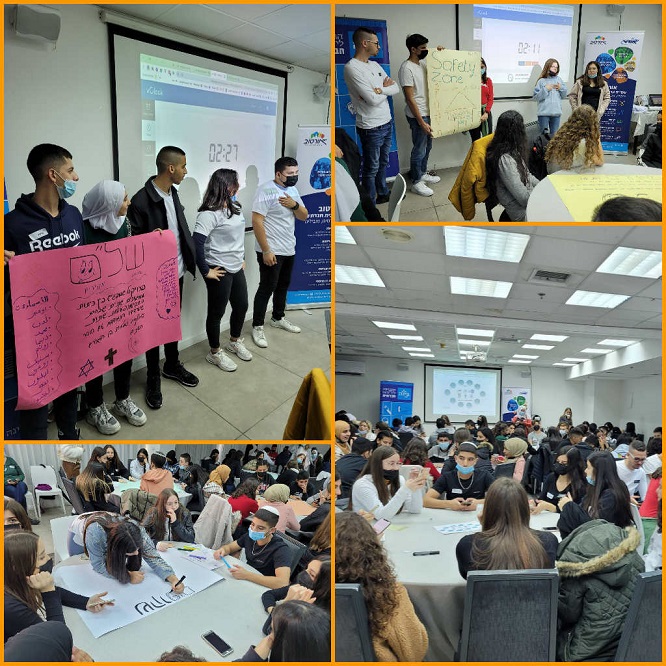
Galit Zamler hosted a hackathon with youth from all over Israel, representing all religions and sectors, to come up with ideas to reduce the gaps in Israeli society, increase tolerance, and strengthen the connections between its various parts.
Bina and Ortov organized the hackathon, and the best of Israel's youth from leadership classes from ORT Schools attended.
Three winning teams that implement the ideas will receive cash prizes.
All teams wrote their ideas in Vickathon, and they can continue working on their ventures until the successful realization.
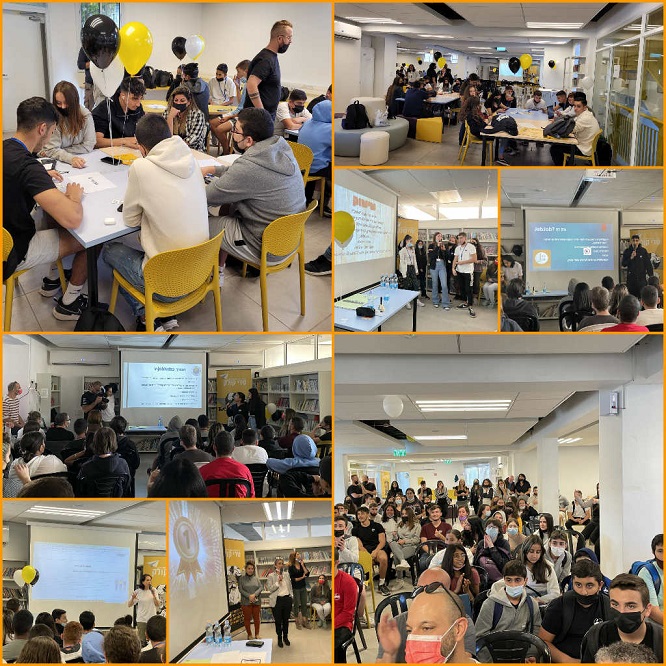
During Global Entrepreneurship Week, Teddy Kollek High School in Pisgat Ze'ev, led by Ms. Sonia Refaeli and Ms. Merav Maman, held hackathons for its students of various grades.
The Hackathon event, led by the Vickathon team, was attended by all the hackathon winners that week. Sixteen teams and over 100 students attended this event. This event lasted all day and was held in a collaborative, proactive, creative, innovative, and teamwork environment.
Hackathon participants were challenged to find solutions to improve the leisure time for youth in the Pisgat Ze'ev neighborhood.
At the end of the day, the students presented their ideas in a well-prepared presentation to an audience and judges. Then we announced the winners and crowd favorites.
Participants who participated throughout the week and summit day had a lot to gain from the experience.
Sonia Refaeli wrote:
"Dear Galit, thank you for such a professional, experiential, and exciting event.
We look forward to working with you in the future."
Merav Maman summarized the event as follows:
"It was a fantastic collaboration.
Dear Galit, It was an impressive event that was the highlight of the school entrepreneurship week.
It was absolutely a success, and it was just the beginning of doing something so important."
This is how the school described the experience on Facebook:
"Teddy Kollek High School had a record day during Entrepreneurship Week!
There is so much excitement and joy in doing.
Sixteen projects from the 8th, 9th, and 11th grades made the finals.
The winners of the hackathon are:
Third place - 'Cruiser with a smile' - This project aims to cheer up the residents of Pisgat Ze'ev, 10th graders.
2nd place - Give a Hand to Pisga - A learning center in which high school students teach elementary school students at reasonable prices - 10th graders.
The first place - * Photo Time * - Establishment of a collaborative photography studio where teenagers from different places can work together - 8th graders.
The judges of the competition were -
Batsheva Yehoshua from Manchi
Hadar Zatlawi - Municipal Youth Unit Director
Rivka, Eyal, and Arik from Ipcha.
We ended the week with excitement, great experience, inspiration, and a great sense of pride in the children.
Thanks to everyone who took part!
This is how education should be done!"
The Gymnasia HaRealit High School in Rishon Lezion, under the leadership of Ms. Iris Ron and Ms. Michal Keren, organized its second international hackathon, directed by Ms. Galit Zamler.
Five countries participated this time: Israel, the Philippines, South Africa, Vietnam, and India.
The hackathon involved 150 students divided into 22 mixed teams. Each team was composed of students from the Gymnasia HaRealit and students from another country. The entire hackathon was held in English.
The hackathon topic was 'How to Cultivate Social-Emotional Learning (SEL) in Students?'
Students attended short enrichment lectures, took part in a workshop to develop entrepreneurial skills, and worked in teams to develop ideas according to a Vickathon system outline.
As part of the hackathon, we held four frontal sessions during Global Entrepreneurship Week, and students worked independently between sessions to advance their projects.
The teams presented their ideas to all mentors and participants, receiving proactive feedback.
The hackathon concluded with the selection of three winning teams, based on the judges' scores and crowd favorites chosen through online voting.
Some representatives summarized the hackathon as follows:
Michal Keren, Deputy Principal:
"I would like to express my most profound appreciation for completing 2021 the Gymnasia Harealit hackathon.
Dear students, you have definitely exceeded our expectations. Your professionalism is truly commendable. Your work has resulted in tangible, beneficial results for both the community and schools. You put your hurts and souls into SEL. You have created adorable projects, one of which has been building communication and speaking the same language for the good of mankind. Wishing you all the best and luck in applying all those fantastic ideas."
Andrew, Team Representative from South Africa:
"Thank you, Galit, for running this hackathon. In South Africa, it's our first experience with a hackathon. It is amazing to see how these kids have so many ideas, and the universe's future lies in these kids. A change in the world will start with you guys.
Moran Talmor, co-lead of the hackathon and chief mentor, wrote on her Facebook page:
"This week was a huge privilege for me.
Participate as a mentor in the four-day hackathon.
On the subject of SEL (social-emotional learning).
Among other things, Galit Zamler, the person behind this wonderful project, promotes entrepreneurship and innovation in schools around the world.
It was a pleasure to see teenagers from India, the Philippines, Vietnam, South Africa, and Israel work together to find ways to make the world a better place."
Kfir, a student at the Gymnasia HaRealit:
"This was a very good experience. I really enjoyed speaking to other people from other countries, and working on my English was a lot of fun."
Zoe, a student at the Academic Link School in the Philippines:
"When I first read about the hackathon, I had no idea what it was. But I'll honestly remember the experience of working with different students and mentors."
Angelica, a student at the Montessori School in South Africa:
"We are all thankful for taking part in the hackathon experience. I think we all learned a lot from this. We are very grateful for the opportunity you gave us."
Eliana, a student from Vietnam:
"Thank you for introducing me to this competition. I have extensive experience with making friends from around the world. For me, it was terrific."
A joint international virtual hackathon for students from Nachshon's class at "Gvanim" Junior High School in Kadima-Tzoran, students from Excel Public School in India, and students from Aurora Boya Academy of Beijing in China.
The challenge presented in this hackathon was to find technological solutions that will help reduce the sense of loneliness and strengthen social connections.
This is the place to thank our guest lecturer, Anat Sever, for sharing her experience of feeling lonely as a child due to the constant relocations her family had to make and how she managed to overcome it. Her story presents one perspective on the challenge the pupils faced in this hackathon.
This is the Welcome clip that the students of all three countries made.
Summary of the hackathon from the participants' representatives:
Student Divijaa Arjun:
"It was truly a great experience and learning. Working with students across the globe, overcoming challenges, understanding each other's differences, and developing a venture was indeed very exciting. A great platform to build connections. It was a euphoric experience. Sincere thanks to our mentors Srinath Birur, Lekha Nair, and Jyoti Joseph, and to the organizers of this Hackathon for making this possible."
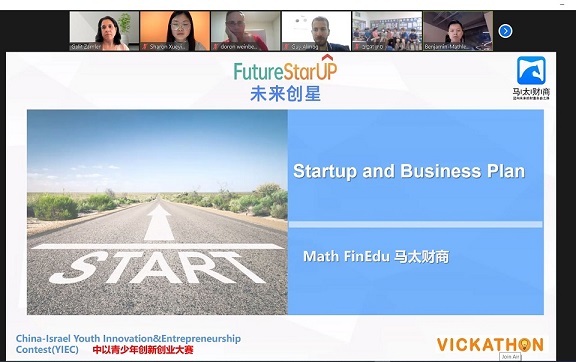
Sixth-graders from the Tchernikhovski primary school in Haifa, headed by Principal Doron Wienberg, participated in an international entrepreneurship competition, competing against students from China.
The students brainstormed ideas for projects in several fields that were presented to them. They've developed those ideas on the Vickathon- an internet platform used for entrepreneurship competitions.
All the competitors prepared a business plan and, in the end, presented their ideas to a panel of entrepreneurs from Israel and China.
Beyond the competitive challenge, all those who participated dealt with the requirement to present in English, which was not their native language, in a remarkable way.
Ramat Gan's Department of Education, led by Sarrai Hezi and Liza Melnik, planned a hybrid hackathon for the city's schoolchildren.
The hackathon's theme: promoting innovation in education
A mix of ten teams, comprising students and teachers from different schools across the city, met together with officers from Mamram in two different locations in the city. They developed their ideas for projects so that they could demonstrate them. The entire hackathon lasted from morning till evening.
Throughout the day, the teams also participated in lectures and online workshops, enjoying the atmosphere of good and healthy competition.
At the end of the day, the teams presented their project ideas online to a committee of distinguished members, who selected three winning teams.
The winning teams were presented with significant awards, which the city hall had funded to support the projects.
This is the first hybrid hackathon that Galit Zamler led, together with Inbar Berger. The combination of face-to-face interaction, the virtual arena, and the teams' work on the Vickathon system created an atmosphere of excitement and interaction between the professional mentors who accompanied the teams and among the groups themselves.
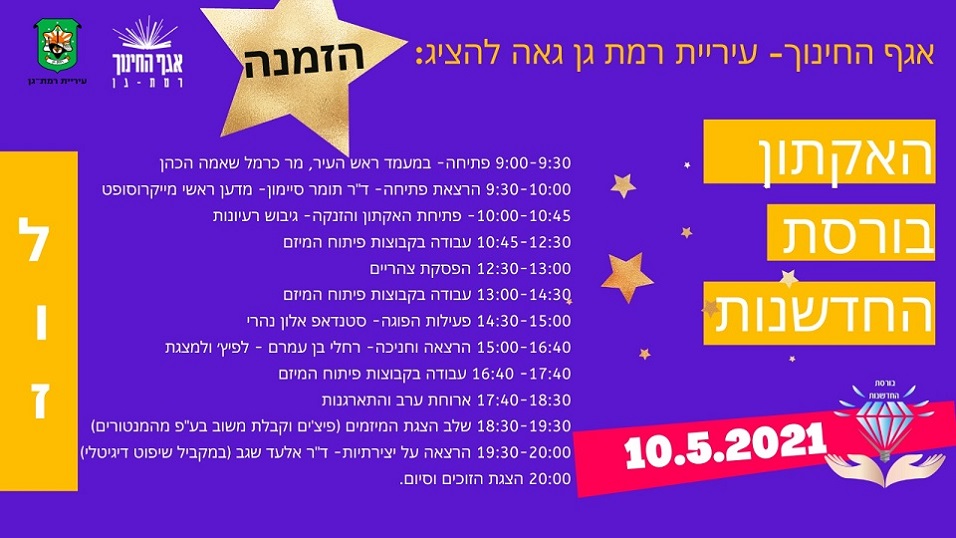
A selection of comments from all those who were involved with the hackathon:
Sarrai Hezi, the hackathon planner on behalf of Ramat Gan's city hall- "I want to thank all the participants. This event wouldn't have been a success without your strong motivation. I know that you were left wanting more, and I'm happy about that. I promise that this is what motivates me to plan more events like these in Ramat Gan.
Once a year, we'll create such an event at Education Week and ensure that we host smaller events throughout the rest of the year. Huge thanks to Liza, who was a partner on this journey. Thanks to Galit and Inbar, who accepted me with all my craziness, showing such understanding and containment, which made this event possible. I was Sarri, and I came to make a positive change in Ramat Gan's education system. This was the first milestone. Have a lovely weekend!"
Racheli Nir, Yahalom School- "Thanks so much for this experiential, fascinating, different, fun, enriching, and educating day."
Shulamit Sol, Avigur School- "The children had a great time and came back filled with great enthusiasm!"
Einat Zevulun, Michalal School - "Thanks for a perfect day filled with lots of experiences, the children had a great time, and so did we, the educators."
Moti, Teleprocessing Coordinator at Ramat Gan's Makif High School- "Our students experienced a formative experience; Learning about the product development process as a team, experimenting with innovation, and building a presentation for their pitch. It was worth it, and it left us wanting more."
Vered Ben-Dor Atid School - "It was a meaningful, experiential and inspiring day, combined with joined-up thinking and teamwork between the different schools. Children who began as strangers emerged from this day as best friends and are already looking forward to the next joint meeting. Thank you for the opportunity to be part of the join-up thinking that promotes innovation and entrepreneurship. It was an amazing event!"
Yehudit Liron, mentor - "This hackathon was amazingly organized! The teams created amazing things!!! I'm was allowed to accompany my team."
Orly Gerry, mentor - "I join the compliments. It was exemplary organized. The support that each team received was relevant and accurate. Hats off to Sarri, Liza, and Galit, and a huge appreciation to the teachers who accompanied the students throughout the entire process and the entire day. I'm glad I was allowed to witness such a deserved and wonderfully organized project. Thank you!"
Iris Weintraub, mentor - "I had the privilege of participating as a mentor at the hybrid hackathon for promoting innovation in the city of Ramat Gan. I had a fascinating day, and as a bonus, my team won second place!!!! Well done to Sarri for your initiative and to you, Galit, for the exemplary organization."
Update as of 7.2023
In July 2023, we attended an event that revealed Shenkar College students' ventures.
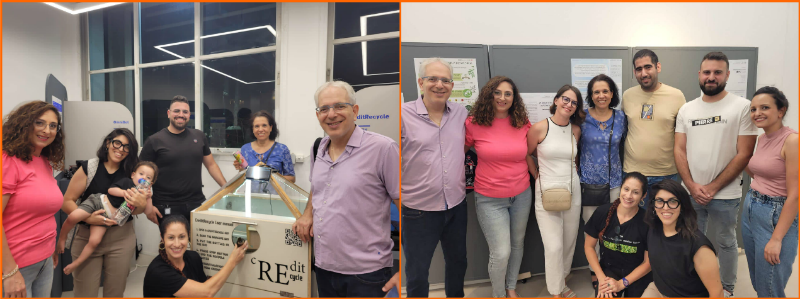
On the Facebook page "The Robot of Barak Hori," they summarized the event as follows:
"Shenkar College's end-of-year event.
We met again with the students of the software engineering department, who were the mentors in the "Stock Market of Innovation" hackathon, held in the name and memory of our son, Barak.
Their products, which they had worked on for the past year and a half, amazed us with their creativity, innovative thinking, and attention to detail.
Third place: The students created an orientation program in the city of Ramat Gan with educational content about every place you want to see.
In the second place, the students built an automatic recycling bin machine that recognizes waste sent to it and sorts it automatically.
And in the first place, the students created software that encourages children to make a personal commitment while getting to know Ramat Gan.
We were very excited to see how children's inventions and dreams turned into actual products that benefit the environment and society."
Dr. Yonit Rosho wrote:
"Both I personally and the students from the software engineering faculty at Shenkar have great pleasure and satisfaction from the fruitful cooperation between all parties.
You came up with the challenges, the lovely children developed them, and we implemented them.
It's all about teamwork. We look forward to many more years of working together!"
And Sarrai Hezi wrote:
"When you want real, practical, meaningful education...
You don't wait to be told how, when, and what... You just start!
The Ramat Gan municipality's education department promotes education at its highest level! Meaningful education flows through our children's veins..."
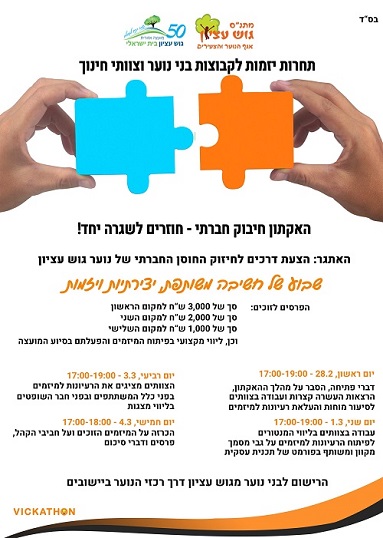
The Gush Etzion Council and its Department of Education, through the Youth Department, have decided to hear from the youth of Gush Etzion and gather their ideas to strengthen the social resilience of teenagers. This resilience was cracked during the COVID-19 pandemic, and now it's time to rehabilitate it again.
Ten teams of youth from the Gush Etzion gathered virtually. Come up with ideas that meet the challenge presented to them. Members of the council, the Department of Education, and the Youth Department emphasized their responsibility to promote and assist as much as they can in realizing the teenagers' ideas.
For most participants, it was their first time participating in such a competition. Professional mentors accompanied the teams with lots of patience. They helped the teens move ahead and guided them in formulating ideas for ventures and initiatives.
Those who took part in the event summed up their experience as follows:
Shlomo Ne'eman, Gush Etzion Council head:
"We are pleased and proud of our youth. Your participation, caring, and creativity are impressive. We are truly proud and look forward to the future. Our primary goal is to build on this foundation. We've made this move to get true growth. Many many thanks to Galit and the mentors for the work you've put into this with dedication and creativity".
Samuel (Muli) Yeselzon, Department of Education, Gush Etzion council:
"Thanks a lot to Galit for organizing this entire event. I think that the idea and implementation, and the fact that teenagers can see themselves as influencers through the hackathon, are wonderful. You've had the privilege of being guided by very talented mentors who helped you. I really hope that we will be able to bring these wonderful ideas to life. It's our duty to see how we can implement the ideas you have come up with. We didn't do this only for drawing ideas but also to take upon ourselves the commitment to see how we can turn the things you've dreamed of into a reality".
Hana Navon, Gush Etzion community center:
"We weren't surprised at all by our youth. We are aware that our youth are of a high standard, who, throughout the Coronavirus pandemic, have volunteered and helped build the community's resilience. But we were very much impressed with your work, ideas, and initiatives. Now, our goal is to bring those ideas to life. We are proud of you".
Inbar Israel, mentor, CEO of ShalavHava- Entrepreneurship and business development:
"Those teenagers are genuinely wonderful. I will discuss the team I was mentoring, with whom I had the opportunity to become familiar in-depth. Those girls are so bright and very goal-committed. They worked together so well.
I felt I was around grown-ups. They are so intelligent and did everything so well as if they were mature entrepreneurs. I'm proud of you for the way you've presented your idea. You're simply fantastic. I wish you lots of success. I hope your experience was good and that you learned from this and will take with you all that you've learned here. You won anyway. I had a great time with you".
Amitai Isboutsky, one of the teenagers who participated in the hackathon:
"We had a great time, and we hope to participate in a hackathon again next year".
Rivka Palmor, one of the teenagers who participated in the hackathon:
"It was a meaningful experience. It's my first time participating in a hackathon. I thought it would be boring, but I had a great time, both with my teammates and our mentor. Thank you all for making this event fun".
Ra'aya Yeselzon, one of the teenagers who participated in the hackathon:
"Thanks to all those who organized and worked on this event. It was enjoyable and enriching".
The Gymnasia HaRealit in Rishon LeZion, headed by Iris Ron and her Vice-Principal, Michal Keren, aimed to host a virtual hackathon for tenth-grade students and international students.
The Vickathon team recruited students from India, China, and Hong Kong to take part in a virtual hackathon for mixed teams with Israeli students.
The hackathon's challenge was "How to Make Live Online Learning More Creative and Exciting?". The study was conducted in English, and a total of 181 students participated.
The hackathon spanned four days, during which participants listened to enriching lectures, worked in teams, and brainstormed ideas for projects that offered solutions to the challenge. They selected their best idea and developed it according to an outline displayed for them on Vickathon.
The event from beginning to end demonstrated what learning should look like these days.
At the end of the hackathon, the school principal, mentors, and students summed up the event:
Iris Ron, the Gymnasia HaRealit School director, summed up the virtual event:
"It was amazing. I would like to thank all the participants for the wonderful experience of cooperation. Thank you, wonderful students, and dedicated teachers and mentors who have been part of the forces. Special thanks to Michal, Sagie, and Hen, who were the driving force behind the success. It was a special and exciting multi-cultural event. I'm especially thankful to Galit Zamler, who orchestrated the event with great professionalism, wisdom, and sensitivity. Congratulations to the winners, and good luck to you all!"
Tali Tal, mentor:
"It's an amazing and productive process. It goes beyond entrepreneurship. It's about developing leadership and self-confidence".
Gal Benjamin, mentor:
"So many kids and everything went really great! The kids managed to learn and work with other kids from across the world, and moreover, when you learn with joy, you progress faster. Their joint work led to an original and high-quality creation. It was a real privilege to take part in this".
Tali Sheffer, mentor:
"It was amazing and inspiring to learn that our kids can come up with ideas and solutions. I felt honored, and it was important for me to be part of the work and the impact which is so critical and necessary in creating the tools that will teach us how to learn in another world which is dysfunctional yet progressing".
Israeli students wrote:
"We reached this international hackathon a bit scared of the unknown of meeting peers from a foreign country, but also with excitement because this is not something we take part in daily. Our fears and doubts quickly disappeared when we learned that we were teamed with four other nice and smart students from China. Together, we came up with this idea and built it. We collaborated great, and little by little, we got to know each other better and had a great time working together. Aside from creating an excellent idea, we came out of this hackathon with new friends and improved our English".
"Our experience in this hackathon was amazing. We had the opportunity to work together with three terrific students from China, and through our conversations with them, we learned a great deal about their school, the teaching methods in China, and their country as a whole. We had so much fun during the entire work process, and we also improved our English".
Students from China wrote:
"The first time I heard this topic, like a newborn baby, I was puzzled and curious.
Until the first day of the activity, I learned that "Hackathon" means "hack and marathon," which means persist in innovation. Besides, it also took me five days to find out that "Hackathon" is an experience. It means precious friendship and lots of great benefits."
Wealth is not a permanent friend, but a friend is a permanent wealth." In my opinion, forming good friendships is the most worthwhile activity. During the five-day Hackathon in Team 21, I had the opportunity to meet many students from Israel, and we also set up a WeChat group. As Israel is such an innovative country, there must be something that we can learn from them, for instance, Maya's leadership, Ron's activeness, Natanel's calm yet skillful approach, and Ido's potential. In such a creative atmosphere, I believe that I'll certainly gain something valuable.
In addition, what I've learned so far is the importance of confidence, interaction, and critical thinking. Many Chinese children are not outgoing at all; we are not good at expressing feelings either, but most Israelis are just the opposite. This may have a significant impact on the way education is conducted. Therefore, to make good the defect, I came to the Hackathon and learn how to express myself confidently."
"I think this virtual Hackathon is significant, and I can learn a lot. I feel very honored to exchange and discuss with my Israeli classmates. I get along very well with them. I would like to thank the teachers in Israel and China for providing me with this opportunity to participate in this activity. This activity has enhanced my language expression ability and innovation skills, and I have gained a lot.
At the same time, I also thank the students in Israel for accepting my views. Understand that we sometimes dare not speak and take the lead. Take the initiative to make presentations and speeches. We feel very warm."
Students from India summed up the event in video-clips:
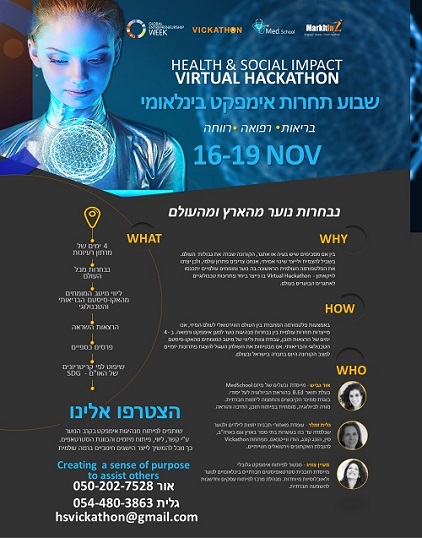
During the 2020 Global Entrepreneurship Week, Or Gavish, Galit Zamler, and Maayan Zweig led the first international hackathon for teenagers, discussing health, medicine, and welfare.
The hackathon spanned four days, during which participants heard lectures on various subjects, including the hackathon itself and topics from the entrepreneurship world. On each day, the participants received a new challenge, on which they worked together over the Vickathon. On the last day, the teens presented their ventures, followed by presentations, and received feedback from the mentors.
The event concluded with participants voting to choose the "crowd's favorites" and the judges announcing the winners based on predefined criteria.
The first place went to Team 21 from India, with a venture called Alris, which utilizes artificial intelligence technology to monitor crowded areas, identify individuals in need of medical attention in confined spaces, and send alerts.
The second place went to three teams: Team Number 1 (I JOIN), Team Number 2 (Parkilas), and Team Number 10 (FamFun).
The third place went to team number 12. Their idea involves inventing an automatic bathroom cleaner. There's a moving story behind this team that shows how taking part in the hackathon empowers the contestants.
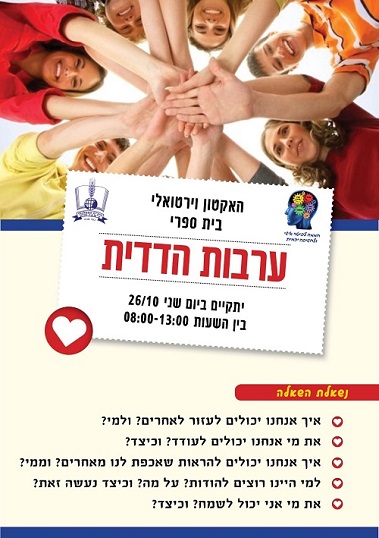
The A.D Gordon's school staff in Kfar Saba, managed by Gila Ben Yosef, led a whole day of a virtual school hackathon.
The preparation was done in advance; Galit Zamler briefed the school staff on how to plan a virtual event that is cognitive, cooperative, and innovative.
There was a great deal of excitement surrounding the day, both among the teachers and the students.
During the day, the students learned about the concept of mutual responsibility, generated ideas for projects and initiatives, and divided into teams. Each team developed its idea over the Vickathon, with teachers serving as mentors.
The hackathon concluded with the students' pitches, in which they professionally presented their ideas, aiming to recruit everyone to execute as many ideas as possible.
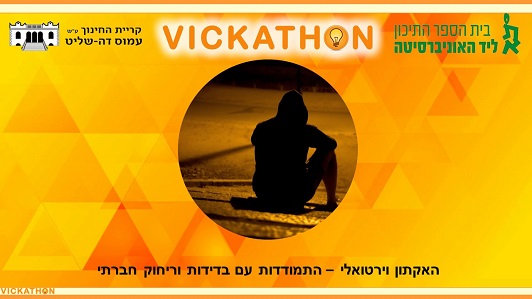
In Rehovot, De-Shalit Junior High School decided to run an online hackathon for students participating in the Youth Entrepreneurship Program.
Yosefa Salomon and Michal Ben-Hemo decided on the hackathon's theme: Coping With Loneliness and Social Distancing.
The selection of the theme was made with the understanding that it's a sensitive topic that concerns students and their peers, whether due to the coronavirus pandemic, which was forced upon us, or social boycott.
An eighth-grade class led by homeroom teacher Shuli Darmon from the High School near the University in Jerusalem joined the hackathon.
We run the hackathon over four days within a one-week period. During its course, the students went through a process of brainstorming to generate ideas for projects, selecting a leading topic, and developing it within the Vickathon system, all while being accompanied by professional mentors.
The week ended with hearing out the ideas, receiving feedback, and announcing the winners.
Listed below is a selection of quotes from the participants of the hackathon:
Michal Ben-Hemo, entrepreneurship coordinator at the De-Shalit Junior High School in Rehovot: "It was quite an experience. The hackathon was a fascinating process that I also went through and took a lot from. The students worked in teams, put their heads together, and tried to solve problems in very creative ways. Our great achievement at the hackathon was being part of this process. We've seen some amazing projects here that can be further developed. A huge thanks to Galit for the collaboration in the hackathon and to the teachers, mentors, and students. It was simply a pleasure walking into the Zoom rooms and witnessing you working and thinking vigorously."
Shuli Darmon, the eighth-grade teacher in the High School Near the University in Jerusalem: "We also went through an amazing process. Our students were thrown in at the deep end, and they did an amazing job. The students' presentations and pitches were fascinating. The ideas were creative...well done to everyone for going through the entire process. It was fun doing the hackathon with another school. It was a wonderful and unique experience."
Ruth Moka-Omer, seventh-grade homeroom teacher: "It was an amazing week in which the students did so much work. Working in groups was respectable and was held with a pleasant conversation. I had a great time. Thanks for the privilege of being part of this."
Ariel Avraham, a pupil at the De-Shalit Junior High School: Taking part in the competition was entertaining for me. I even learned new things about my friends as we were working. We laughed and had a great time. It was enjoyable. And we also created a wonderful project that we're proud of."
Mika Niron, De-Shalit Junior High School: "We got along really great in our group. We made all the decisions together, with each of us contributing our part. We had so much fun."
Here are some of the mentors' experiences who accompanied the hackathon with outstanding professionalism and sensitivity:
Dana Goldring, artist and social entrepreneur, founder of Boser- professional community for artists who are getting started: "It was amazing, a wonderful group of gifted and caring kids - they are simply an inspiration. I would love to work with such a team!:) Galit Zamler, thank you for the invitation and for introducing me to more talented entrepreneurs. I enjoyed listening to the feedback from all the colleagues and seeing all the great projects that were created under your guidance- you are all champions."
Ronit Meiri, consultant, personal and business trainer, using the holistic method, speaker, groups-facilitator, and owner of the business - Yes You Can: "The hackathon was interesting, innovative, highly constructed, and conducted. I thought to myself - if this is what they're producing now, what will they come up with in the years to come? Galit, you're doing a significant job that can change many people's lives in Israel and across the world for the better. I enjoyed listening and learning from the opinion given by the team that provided the feedback."
Maya Keleti, a graphic designer, specializes in designing and communicative language for children: "It was enchanting and fascinating to listen to the kids' ideas today."
Vered Adar, head of UI/UX, design thinking workshop facilitator: : "Galit, you delivered the event fascinatingly and excellently. The mentors who delivered their feedback did a great job, showing affection and motivating the students. You've managed to convey the sense that implementing all of this is truly within reach. You've also managed to convey messages of criticism in a positive and constructive manner. Well done to you."
A. D. Gordon School in Kfar Saba, under the administration of Gila Ben Yosef, is an incubator for self-expression and entrepreneurial thinking.
Towards the end of the school year, the entire school staff attended a Zoom training session with Galit Zamler.
During the meeting, the staff received guidance on how to lead a school Hackathon for students, emphasizing the entrepreneurial experience, teamwork, integration of lectures and workshops, and the development of project ideas.
This is the first time the school has organized a Hackathon for its students, and therefore, both teachers and students were excited.
On the morning of the event, Galit Zamler sent a message to all of the teachers:
"I'm proud of you that despite all the challenges in organizing a Hackathon nowadays, under all the restrictions of the coronavirus, you are leading a school Hackathon.
Thus, you are providing students with an experience of entrepreneurship and creativity.
In doing so, you also serve as an example of a flexible mindset and coping with changing conditions, just like real entrepreneurs."
The Hackathon day was marked as a very experiential day, and Gila, the school director, summed it up in one sentence: "The kids loved the entrepreneurial thinking, and so did the teachers."
The pictures effectively demonstrate the entrepreneurial atmosphere, and the abundance of ideas indicates creativity and openness.
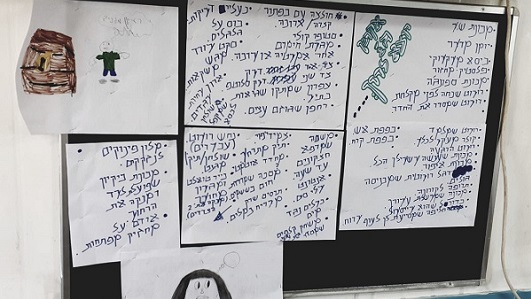
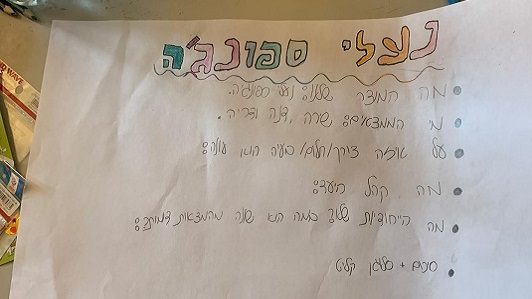
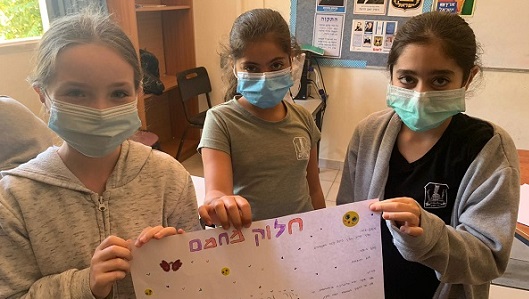
School teachers summed up the Hackathon event as follows:
"I was pleasantly surprised by this day's success and the students' enjoyment.
I do not doubt that the kids enjoyed it because I came prepared for this day and got them all excited.
I realized that children who never stand in front of a crowd, and some who are less talkative in school, suddenly stood up in front of the entire class and presented their ideas.
Tremendous satisfaction to see how a child has succeeded in bringing himself to a position where he stands in front of the class and talks."
****
"The hackathon day (a combination of the words hacker and marathon) at the school caused a grand entrepreneurship celebration. We started the day with a class game that emphasized the differences between the students and the different ways of thinking of each of us.
We discussed, "What is entrepreneurship?" And that entrepreneurship stems from a need or a problem. We experimented with creative activities where the children used their imagination and turned a drawing into something tangible.
We discussed teamwork, which is also one of the essential entrepreneurial skills. We watched a short film on that topic, and the students concluded that to succeed as a team, they must trust each other, encourage one another, collaborate, listen, believe, and never give up. Finally, we read the book "What to do with an idea?". Following this, the children were asked to experiment with teamwork and devise an invention together.
The children came up with some incredible inventions, including a new ice cream flavor (blueberries, strawberries, and frosting), X-ray glasses, and Mr. Emotions - a doll that enhances the baby's world, like a monster doll. They also came up with many other fantastic ideas.
I really enjoyed the children and their endless creativity, collaboration, thinking ahead, and fantastic teamwork. I would love to have such activities throughout the year.
Such days encourage creativity, collaboration, innovation, discourse among the students, and, most of all, high motivation and joy."
****
"This hackathon was very successful. Nowadays, the younger generation is accustomed to having everything immediately.
The hackathon met all their needs and habits. It was dynamic, exciting, and engaging. Throughout the entire day, the students were exposed to the entrepreneur's expertise, stories, and problems (riddles) that made them think outside the box."
****
"This hackathon event took place at our school as a record day of initiatives marathon on a limited time.
The students enjoyed an experiential day rich in content, featuring ventures, inventions, the process of bringing an idea or dream to life, team collaboration to promote the initiative, and more.
The students in my class had a great time. The vibe was good. The students thought about their creative initiatives, and I learned that you could find in each student some great ideas that only need an opportunity to carry them out."
****
"The hackathon in our class was very successful. It's our first time experimenting with such a day of activities. This day allowed them to express themselves and showcase the skills and tools they acquired throughout the year.
The day's intensity contributed significantly to the students' ability to accomplish so much in such a short time. We felt that they reflected on what they had learned throughout the year on this day.
This day gave out good vibes in the class. The students were very excited to present their outcomes and worked hard on their pitch.
The students' outcomes were very impressive, and one could see they were working with genuine interest and curiosity."
****
"The hackathon that was held in my class was very successful. I have to point out that it was contrary to my expectations.
I was sure that it would be a "hard day" that would go to waste and that the kids wouldn't really understand its essence.
But the kids demonstrated entrepreneurship at its best. They came up with creative ideas and thought outside the box."

During the 2020 Global Entrepreneurship Week, Or Gavish, Galit Zamler, and Maayan Zweig led the first international hackathon for teenagers, discussing health, medicine, and welfare.
The hackathon spanned four days, during which participants heard lectures on various subjects, including the hackathon itself and topics from the entrepreneurship world. On each day, the participants received a new challenge, on which they worked together over the Vickathon. On the last day, the teens presented their ventures, followed by presentations, and received feedback from the mentors.
The event concluded with participants voting to choose the "crowd's favorites" and the judges announcing the winners based on predefined criteria.
The first place went to Team 21 from India, with a venture called Alris, which utilizes artificial intelligence technology to monitor crowded areas, identify individuals in need of medical attention in confined spaces, and send alerts.
The second place went to three teams: Team Number 1 (I JOIN), Team Number 2 (Parkilas), and Team Number 10 (FamFun).
The third place went to team number 12. Their idea involves inventing an automatic bathroom cleaner. There's a moving story behind this team that shows how taking part in the hackathon empowers the contestants.
The Entrepreneurship for Kids Program took the entrepreneurial activity a step forward.
Galit Zamler recognized a need to ease the burden on teachers, capture students' interest, and address the problems and hardships brought on by the Coronavirus (COVID-19).
The program invited schools to participate in the first virtual hackathon for students in Israel, focusing on the subject of "Dealing with the Coronavirus."
This is an interview with Yael Chen-Tov, who won first place with the "Shmaryahu" project:
The Issues on Which the Ventures Were Defined
- Solutions in the health sector for dealing with the virus
- Solutions for the spare time that was created due to the government's instructions
- Solutions for dealing with loneliness
- Solutions for enriching knowledge and solutions for studying
- Solutions for quarantined people's needs
- Solutions for financial difficulties created by the situation
How is the Virtual Hackathon Conducted?
- The hackathon was tailored for kids and their teachers in terms of visual design, sections to fill out, and videos.
- Students worked through a structured, joint internet file to develop a project in their homes at any time that was comfortable for them, from any device, and without physically meeting each other.
- As part of the hackathon, the students watched short tutorial clips that helped them develop the venture idea.
- Each group received professional feedback via the online file relevant to their idea and suited to the young entrepreneurs' ages.
- Each group made up to a two-minute video to present the project, or just wrote down the pitch.
- Each venture was reviewed and scored by three judges.

Forty teams of students from six different schools enrolled in the hackathon. Twenty-five of them developed ideas for ventures, and twenty teams advanced to the final competition, submitting their pitches.
Via an exciting online meeting with all participants, Galit announced the three winners.
The Ideas Were Judged According to the Following Criteria:
- Identifying a problem/need and coming up with a solution that has the potential for a broad impact.
- Original, creative, and doable ideas.
- Writing a detailed file for developing the idea.
- Pitching the idea.
The Prize for the Winners:
- Professional consultation to develop the project.
- Exposure to decision-makers.
- Advertising and exposure on social networks and the EFK program websites in Hebrew and English.
The Winners of the Vickathon "Dealing with the Coronavirus"
Matan Lion Melech produced the final video that featured the winning teams' pitches.
First place: Yael Chen-Tov, a sixth-grader from Katznelson School in Kfar Sirkin. Yael's venture is called "Shmaryahu" (Keeper) - a bracelet that reminds us to wash our hands and keep a safe distance from others, thus protecting us from COVID-19.
Second place: A team of young entrepreneurs - fifth-graders David, Nikol, Tahel, and sixth-graders Orin, Shaked, and Nadav from the A.D Gordon School in Holon. Their venture is called "Activation" - a website featuring various fun and engaging activities to help people spend their time at home during the COVID-19 pandemic.
Third place: The venture of Ella and Ziv, third graders from the "Sadot" School in Pardes Hanna-Karkur. Their venture is a "Corona Kit" - a kit containing hygiene products and fun games that will help us stay safe and have fun.
Our Partners in the Hackathon Success:
The online event was conducted in collaboration with professionals who contributed their expertise; entrepreneurs from various fields who helped students promote their ideas and served as expert mentors.
Rivka Alkobi - Educational Entrepreneur and Founder of B-Friend, Researcher in Special Education, Psychotherapist, and an Educational Advisor. Rivka develops digital therapies and products designed to help parents, teachers, and educators communicate safely. Her last startup, named B-Friend, helps teach children social skills. The Ministry of Education has approved this venture.
Attorney Gad Benett from Ben-Ami & Associates, a patent law firm, has prepared a concise and informative explanatory video in a language understandable to students, addressing the question: "Should I disclose or not disclose my idea?"
Tal Berman - Specialist in early-stage ventures, taught this as part of his role at the College of Management. A serial entrepreneur, owner of a company that creates international opportunities for entrepreneurs with representative offices in Spain and Germany, and also leads the Startup Grind community in Rishon Lezion.
Dedi Cohen - Designer and educator. Live in the world of Hackathons, founder of the Damm Good Slides studio for accessing tools and practices in presentations, creative thinking, design, and product concept. Designer in the state service, product manager at the karaoke-talkie venture, lecturer, and mentor in the Israeli youth entrepreneurship community.
Matan Lion Melech - A film producer and filmmaker. Matan made a video about the importance of defining and characterizing the target audience.
Or Manor - The founder of the Social Innovation Club, Director of Strategic Partnerships, Informatics. She helped to prepare a presentation on how to pitch your project in an interesting way.
Tami Kleiman-Bar - Educational entrepreneur, computing, and linguistic coordinator at the six-year high school Carmel Zevulun in Kibbutz Yagur. I am a graduate student in computational learning and a group manager of the "Middle School and High School Teacher Circle" and "Other Language" Facebook groups.
Dov Rochman - Has managed business activities in various high technology fields, startups, and retail. This includes setting up a startup company in the energy domain, management, and establishment of a wide retail activity (IKEA Israel), as well as management of an Israeli corporation (Koor Industries) in the US. These days, he is a member of the technological innovation group in the Ministry of Education, a mentor, and a high school math teacher.
Ronni Shtekler - An educator, teacher and English coordinator in junior high school, as well as an entrepreneur, developed a remedial teaching kit in English, "Learn English and Remember."

How Was the Hackathon?
The Hackathon turned out to be a success, even before it was launched. Here are some comments from teachers, mentors, parents, and students:
Teachers wrote:
"Excellent initiative."
"Thank you for the initiative and the opportunity to participate. Both teams enjoyed the process very much."
"The Vickathon you developed is lovely and clear. How did you do it?"
"Thank you for leading this meaningful activity during this unusual time. As someone who has accompanied projects from the other side, I must say that it has added value in a time like ours, where kids are out of routine.
This activity brought them liveliness, a sense of achievement, and social connection, which, in my opinion, are just as meaningful. They organized it like a project in every sense, with daily Zoom meetings for all group members, ensuring they couldn't miss or be late. And, of course, after these activities, each of them received numerous personal assignments.
Thank you so much for promoting this activity. I wish there were more like this in the future that will get some real content into our children's lives."
Children who took part in the Hackathon wrote:
"We enjoyed the work. Thank you."
"We really enjoyed drawing and inventing ideas to deal with boredom."
The mentors and judges wrote:
"It was fun, the kids were lovely, and so were their ideas, and the execution was wonderful. A great pleasure."
The director of the Sadot School, which participated in the Hackathon, said:
"I'm delighted at the decision to run this Hackathon. That's how learning should look nowadays. It's a pleasure to hear from all the young entrepreneurs."
A delegation of parents and children from China visited Israel to learn about the country, which is considered one of the most entrepreneurial in the world.
To enhance the visit experience and gain insight into the mindset of Israeli entrepreneurs, the delegation members participated in a mini-Hackathon for both parents and children.
We held the event at Saronahub - Youth Entrepreneurship Center in Tel Aviv, during which the participants experienced an intensive entrepreneurship process.
It was the first time the Chinese group had heard the word "Hackathon," and they had enjoyed all its stages.
After an introductory lecture and activity that fosters creativity and imagination, they worked in groups, came up with ideas for ventures, they chose a particularly successful one. Then they presented their best ideas in an entrepreneur's Pitch style and finally voted on and chose one winning venture. The winners got prizes.
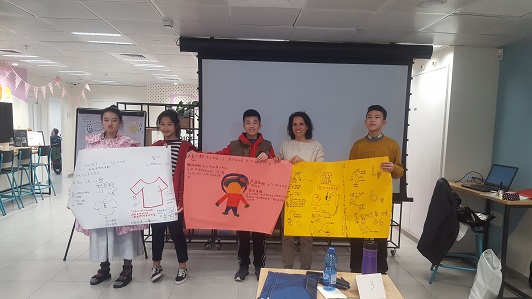
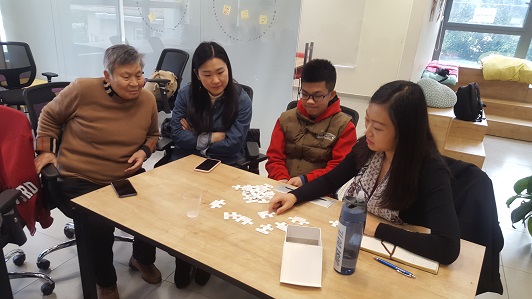
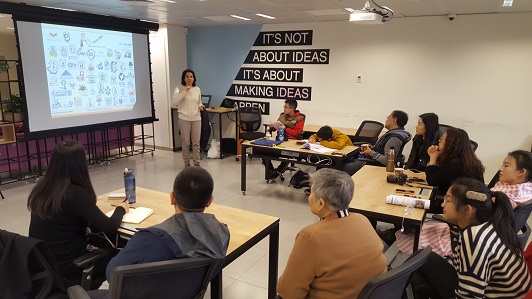
Examples of innovative ideas raised by participants:
- Clothes that can be eaten
- Use a phone to regulate the temperature of clothes
- Use flowers to create clothes
- Try on clothes on the phone
- Trash's resources become cars' energy
- Clothes with a phone screen
The participants who enjoyed the entrepreneurial event said that time had passed quickly. That's how it is when you're having fun:)

Students from six high schools in the Efrat and Gush Etzion settlements participated in a Hackathon.
The theme was: "Yesterday's materials are tomorrow's future."
The Hackathon had two parts. In the first part, there were two events, one for boys and the other for girls. The students learned what a Hackathon is and how they can enjoy it and succeed in it.
These students took part in such an event for the first time, so none of them knew what to expect. This did not keep them from engaging in open conversations with excitement and creativity. Their interests and shared ideas helped these young leaders stay on track and succeed.
At the end of the first session, the student groups came together to focus on one clearly explained idea based on predetermined sets of requirements. Their focus included creativity, community project realization, and relevance to the determined theme.
The second part of the Hackathon was open to both boys and girls and lasted into the night. Event winners received prizes to help supply initial funding for the projects they would create.
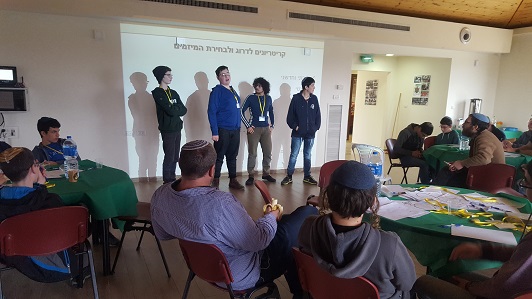
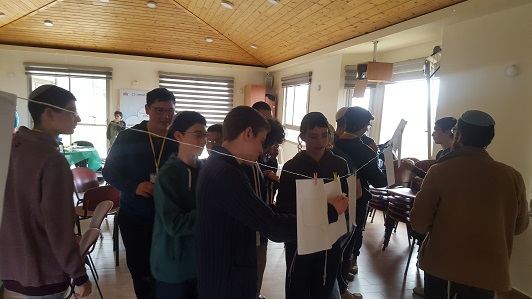
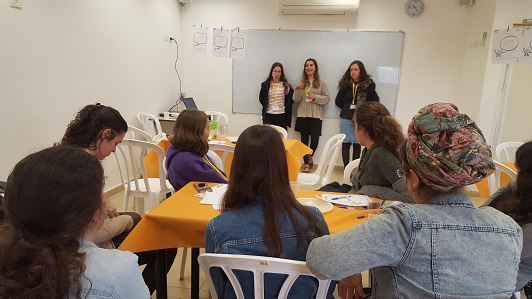
Student ideas included:
- Smart shopping cart
- A voluntary educational platform to allow shared information and aid to those who sign up for the system
- Social project to collect eyeglasses for those who are in need
- Vehicle fuel by organic manure
- Electric wheelchair
- A tent in a bag
- A tent that includes a shower
- Collaborative community bicycle venture
- Collaborative vehicle service to drive residents of Gush Etzion settlements
- Collect and fix costumes to give to needy residents
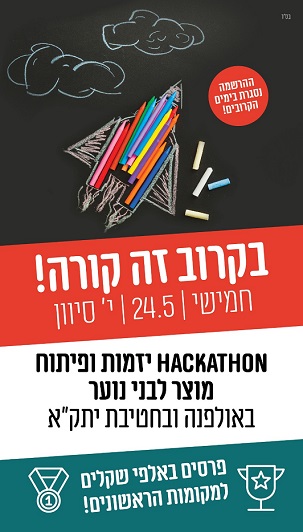
The director of education in Kiryat Arba organized a Hackathon for seventh- and eighth-grade students at the junior high school of the Yeshiva (Yatka) and for students in the seventh and ninth grades at the Ulpana.
The Hackathon was held in three sessions, culminating in a community evening where two finalists from each school presented their projects to residents of Kiryat Arba, well-known entrepreneurs, and judges.
First Session
At the first meeting, the students learned for the first time what a Hackathon is, after preliminary signs in the school aroused their curiosity.
This session introduced students to the subject of entrepreneurship, aiming to develop their entrepreneurial and creative thinking and to encourage them to participate in the subsequent two meetings of the Hackathon, which had limited enrollment.
The introductory meeting, teasers, recruitment of the teaching staff, and competitive atmosphere attracted more than sixty students to register for the Hackathon.
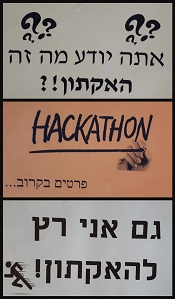
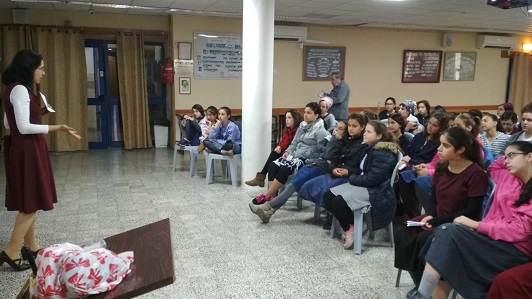
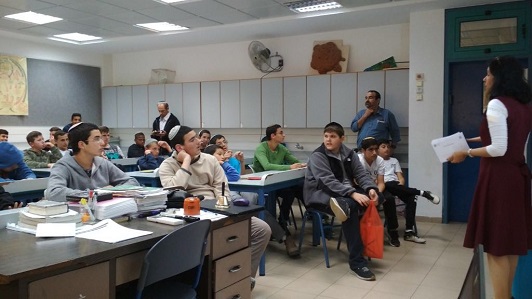
Second Session
About 30 students from the Ulpana gathered in the hall around tables and raised innovative ideas for projects on social entrepreneurship and cleaning products.
Each group had a mentor who helped them formulate ideas.
The students heard a short lecture from Galit Zamler on techniques for creative thinking in entrepreneurship and then raised many ideas for projects, which they had ranked, and chose only two for voting.
Six selected ideas were finalized. The girls developed them toward the semifinals of the competition at the school.
A similar event was held at Yeshiva High School, with more than 30 students eager to bring up and develop innovative ideas in the fields of science, technology, and cleaning products, knowing that eventually, they would compete in the finale against the Ulpana girls.
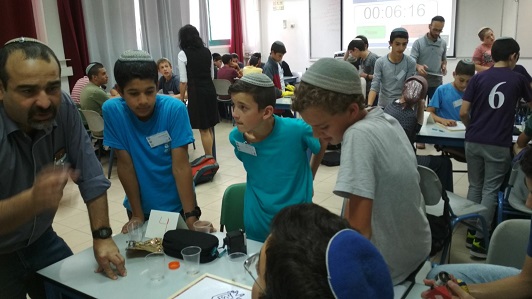
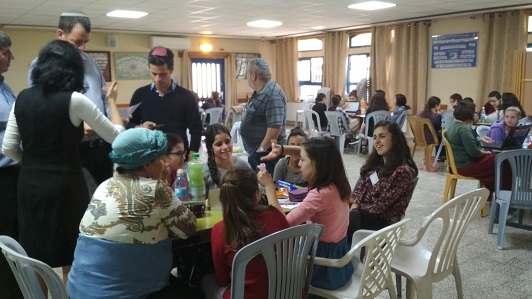
Third Session
For the third session, the students arrived with the necessary equipment and tools to build a model of their ideas.
After building models, they prepared pitches and presentations to present the projects.
After a few hours, the school children gathered, and the entrepreneurs presented their inventions. Each school held an internal competition between the various groups.
Digital voting allowed each student to choose only two projects, and two finalists were selected at each school.
The following projects were presented at the Ulpana:
1) Clean Slot (in Hebrew) - A toilet cleaner used by pressing a button
2) Easy Busy - An adjustable eraser for the school board so that it will always remain in place and won't be lost.
3) Owl Test - An owl test is embedded in a vehicle to protect against drivers who drink too much alcohol.
4) Kifafa - A glove with a clean dish sponge.
5) Light night - A bag that glows in the dark.
6) Cart fix - A three-wheeled supermarket cart, easy to drive.
The presented projects at Yatka
1) Charging cart - A baby carriage that charges your phone.
2) Cool Bag - A backpack with a cooling system.
3) Electric cart - An electric supermarket cart that drives itself to make it easier for customers.
4) Removable garbage bags without the need to be replaced.
5) Pencil Pen - Instead of lead, it has a liquid-like writing ink that a regular eraser can delete.
6) Mototon - A broom with which you can clean dust over the cabinets
A large crowd gathered to see the students present their projects on a summit evening at Heichal HaTarbut. An experienced panel of judges selected the three winning groups, who received prizes.
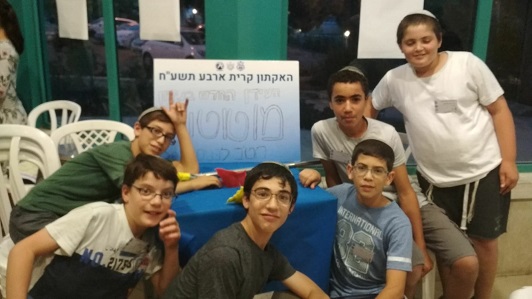
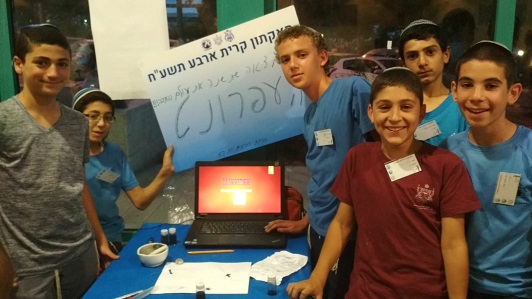
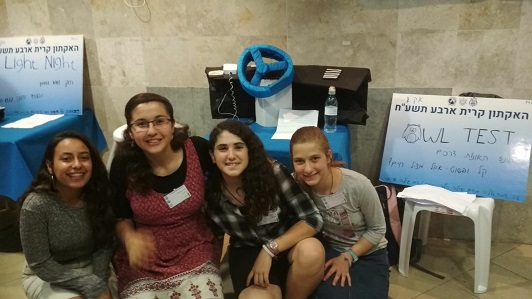
Yael Hazan, the scientific education coordinator, summarized the experience this way:
"We finished the internal competition between the two schools.
It was enriching and impressive to see the hard work of all the groups in all areas. The students were required to prepare a representative prototype and a speech for marketing the product.
There is no doubt that a combination of all these factors brought about the voting results. Of course, the target audience is also a factor.
Anyway, thanks to the fantastic Galit for the extraordinary journey that the students went through.
Congratulations to the excellent teachers and staff, headed by Arie Sod in the Ulpana, Rabbi Menachem Saadia, and Michael Fasi in the Yatka Junior High."
The students of the two seventh-grade classes at the ORT Holon campus participated in a three-day Hackathon, during which they learned how to develop an entrepreneurial mindset and think creatively about project ideas, create prototypes, and present them to parents in an elevator pitch style.
Being exposed to the entrepreneurial world inspired them to think like entrepreneurs, and the students began to ask many thoughtful questions. All of them got answers that encouraged them to be critical thinkers.
Photos of the first session, where the students were divided into groups and thought about ideas for projects, and then showed them in the class:
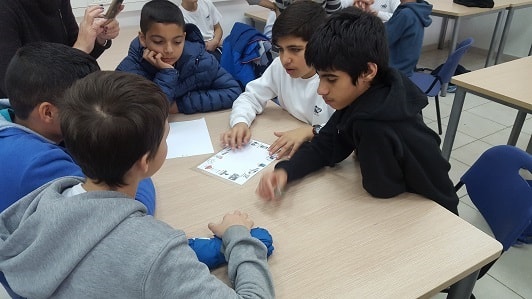
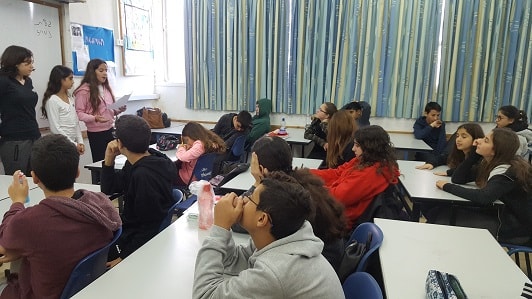
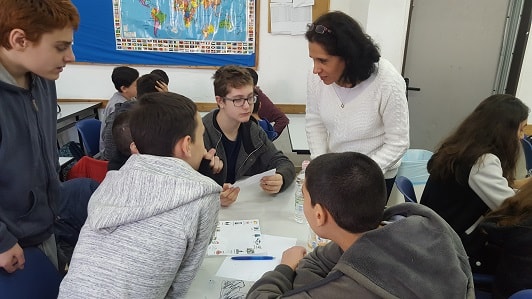
In the second session of the Hackathon, the students chose a limited number of ideas from those raised in the first session.
Then, each team focused on one project, developing original ideas, defining a need, identifying a target audience, considering why the idea was worth pursuing, and determining what was needed to bring it to life.
The students learned what an elevator pitch is, what it answers, and how to differentiate themselves so that others will listen to them.
Pictures from the second part of the Hackathon:
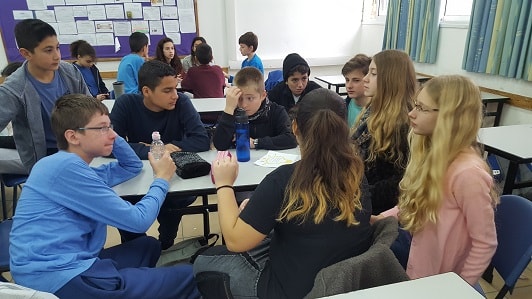
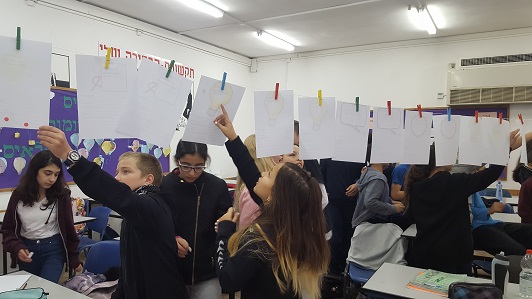
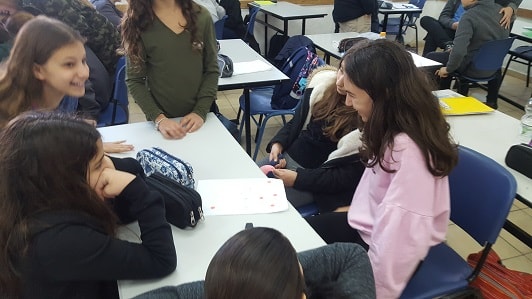
In the third and final part of the Hackathon, the students demonstrated creativity, teamwork, and the ability to cope with challenges when asked to prepare models for their project ideas.
Each group prepared a prototype to illustrate the invention. They utilized the provided accessories and successfully built a model that conveyed their concept.
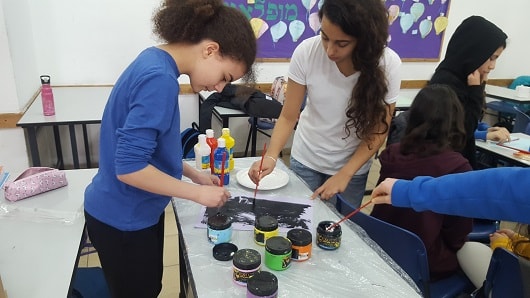
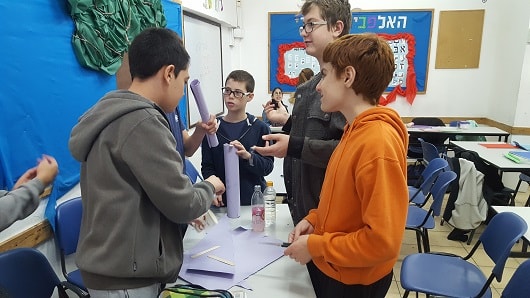
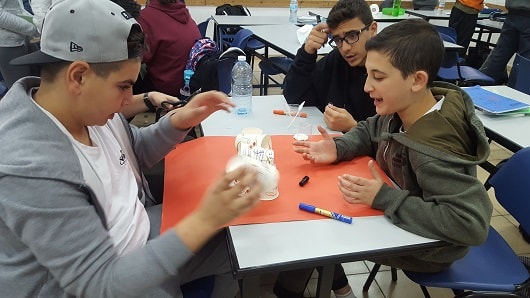
After constructing the models, the students presented the ideas to their classmates.
The fifth graders who learned about natural resources participated in a three-part Hackathon under the direction of Galit Zamler and Nimrod Segev.
During the first encounter, students were exposed to the entrepreneurial world in the context of natural resources.
They saw how innovative projects that exploit natural resources could improve our environment.
Then they began thinking about the professions that would become redundant in the wake of those ventures and which new jobs might emerge as a result.
After the exposure stage, which excited the students, they were given a task to work on in groups.
Each group received a panel that helped them think about creative, entrepreneurial ideas that utilized the sun and water as natural resources.
Each group formed 2-4 ideas for projects, and at the end of the meeting, we posted all the ideas so that everyone could see them.
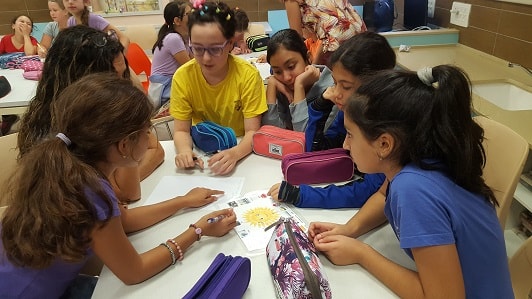
In the second session, the students voted for the projects that they would most like to implement.
They then analyzed the project's needs, the target audience, the required resources to complete it, and identified their competitors.
All groups presented their ideas while maintaining the correct stance in front of the audience. Their classmates asked questions to gain a better understanding of the concepts.
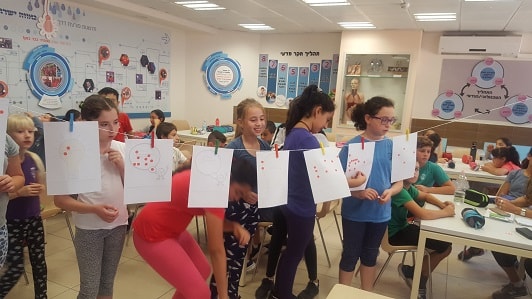
The last meeting was named "Hackathon." Before this meeting, the students brought the equipment and accessories needed to build the models for their ideas.
The children gave their product a name, defined the need it meets, and its target audience. Then, they thought of a marketing slogan, asked questions, and drew a diagram of the model they were planning to build together.
The children enjoyed the whole process, especially the prototype building stage in teams, and at the end of the day, presented the models to their classmates.
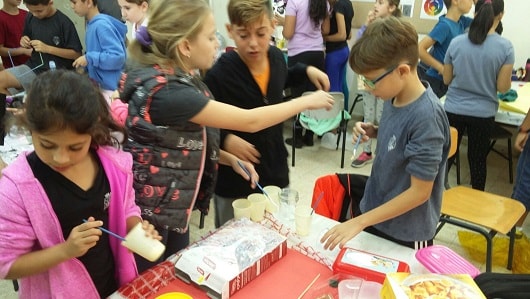
At the end of the meeting, school principal Dorit Nevo wrote: "Amazing process! Recommended for all ages."
And science teacher Michal Ronis wrote:
"It was amazing!
Nimrod and Galit, thank you very much!!!
A real example of meaningful learning."
Students in the Amirim program at the Hashalom school in Mevaseret Zion participated in their third year of entrepreneurship lessons from the Entrepreneurship for Kids Program, led by vice-principal Sigal Bar. She organized a real 24-hour Hackathon event at school.
Sigal summed up the entrepreneurial studies and the Hackathon event as follows:
"Hi,
Yesterday, a group of students from the Amirim program graduated from the three-year entrepreneurial studies program, in which they learned about the entrepreneurial world, met entrepreneurs, developed business and social projects, and even had their work published in the newspaper.
This year, each young entrepreneur developed their project. The prototype projects were created by students during the 24-hour Hackathon yesterday, which included creating prototypes, relaxing activities, lectures on entrepreneurial rhetoric by Ronit Meiri, and marketing by Sharona Zohar.
The students worked at the school and completed the construction of prototypes at 3:00 a.m. The final products are amazing and creative.
The future generation of HaShalom students is ready, sharp, creative, loves to learn, curious, and, most of all, proactive and well-prepared for the 21st century.
Among the projects were: a magnetic board for Alzheimer's patients, a tri-headed bottle, a portable clothing rack for the pool, beach, and home, a device for quickly locating jewelry, a computer mouse with an attached pad, a mechanical pencil set with replaceable erasers, and disposable bags for squeezing lemons.
Thank you, Galit Zamler, for your guidance over the years!"
A summary of the HaShalom school Hackathon:

The first Hackathon for elementary school students began during the Global Entrepreneurship Week 2014.
The Hackathon was divided into three meetings; each held at a different school. Participating schools include Kaplan from Petah Tikva, Yad Mordechai from Bat Yam, HaShalom from Mevaseret Zion, and Alumot from Tel Aviv.
Here is a summarized presentation from all three meetings:
The first to take up the glove was Tali Toledano, the principal of the Kaplan school in Petah Tikva. Her school has engraved on its flag the motto 'Education for Entrepreneurship.'
Tali immediately liked the Hackathon idea and asked other schools to join the experience:
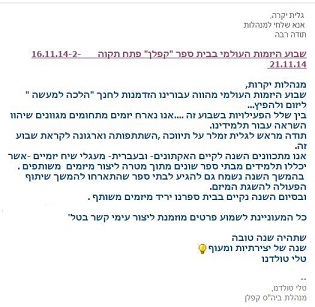
Dear Galit,
Please forward the following to the principals. Thank you.
Dear Principals,
Global Entrepreneurship Week provides an opportunity to teach, practice, initiate, and explore.
Global Entrepreneurship Week provides an opportunity to teach, practice, initiate, and explore.
Thanks in advance to Galit Zamler for her help, participation, and organization this week.
This year, we plan to hold a Hackathon, which will involve entrepreneurship conversations that bring together students from different schools to create collaborative initiatives.
During the year, we will be happy to visit schools that participated in the week and continue working together to further our initiatives.
At the end of the year, we will hold a cooperative initiative fair.
Those interested in more details are welcome to contact me.
Have a great year.
Three schools responded to the call - two principals and a vice principal who, like real entrepreneurs, got out of their comfort zone and decided to join the Hackathon, even though they had never participated in one before.
We shall note that this is precisely how Galit Zamler educates for entrepreneurship.
The schools are:
The Yad Mordechai in Bat-Yam, run by Avivit Misterial, teaches entrepreneurial forethought.
Anat Blair heads the Alumot school in Tel-Aviv. The school joined those who teach entrepreneurship classes in September 2014.
The HaShalom school in Mevaseret Zion, led by vice-principal Sigal Bar, who teaches the EFK Program to a group of gifted students.
Thus, the Hackathon, which involved four different schools from four cities, was born.
Hackathon summary by Zehava and Sigal:
"You had three excellent sessions. Each session was different from its predecessor. During these meetings, you mingled, discussed, thought, planned, and created.
It was a great pleasure to watch you work together, even though you did not know each other beforehand.
We're confident that you'll walk away with a positive experience.
Your ideas deserve spreading."
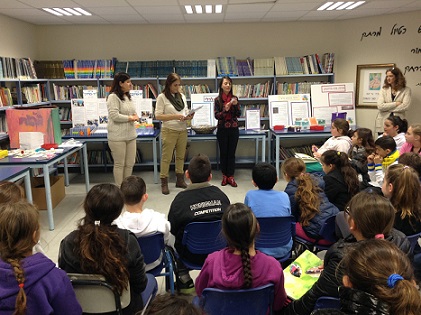
Every student got a certificate of participation and five stones. These stones symbolize creativity, flexibility, optimism, communication, and persistence.
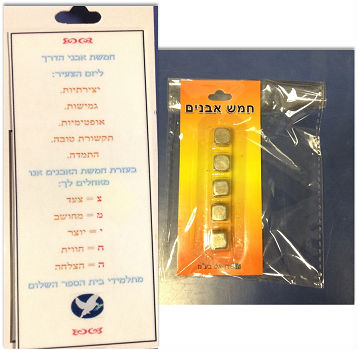
Read about more experiences in entrepreneurship education schools.